Global War on Terror - Silver Star - Army
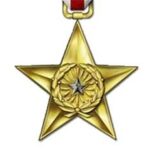 The records below contain the Army recipients of the Silver Star during the Iraq and Afghanistan conflicts, collectively known as the Global War on Terror.
The records below contain the Army recipients of the Silver Star during the Iraq and Afghanistan conflicts, collectively known as the Global War on Terror.
* Indicates Killed in Action (KIA), Missing in Action (MIA), Prisoner of War (POW), or Died Non-Battle (DNB)
 ADAMEC, JEFFREY
ADAMEC, JEFFREY
Synopsis:
The President of the United States takes pleasure in presenting the Silver Star Medal to Jeffrey Adamec, Staff Sergeant, U.S. Army, for conspicuous gallantry and intrepidity in action while serving with Company C, 3d Battalion, 3d Special Forces Group (Airborne), during combat operations in support of Operation IRAQI FREEDOM, on 6 April 2003, at Debecka Pass, Iraq. Staff Sergeant Adamec destroyed four Iraqi armored personnel carriers and one enemy position with Javelin anti-tank missiles while under fire when his team attacked a fortified ridgeline in northern Iraq. Those actions helped secure an intersection linking Mosul and Kirkuk, Iraq. Staff Sergeant Adamec's actions are in keeping with the finest traditions of military heroism and reflect distinct credit upon himself, this Command, and the United States Army.
Home Town: Howell Township, New Jersey
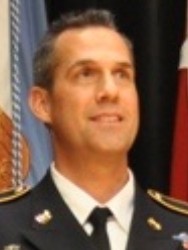 AHERN, RYAN A.
AHERN, RYAN A.
Citation:
The President of the United States of America, authorized by Act of Congress July 9, 1918 (amended by an act of July 25, 1963), takes pleasure in presenting the Silver Star to Sergeant First Class Ryan A. Ahern, United States Army, for gallantry in action on 17 December 2009, while assigned as a Senior Communications Sergeant with Operational Detachment-Alpha 2214, 20th Special Forces Group (Airborne), Special Operations Task Force-202, Baghram Airfield in support of Operation ENDURING FREEDOM. While under attack from a large enemy force, Sergeant First Class Ahern was rendered unconscious when the unit received effective mortar and machine gun fire which wounded him and four others. After regaining consciousness from the blast, Sergeant Ahern quickly identified the location of the enemy and successfully fired numerous high explosive recoilless rifle rounds at the enemy's position, suppressing their fire long enough to allow other members of the unit to reinforce their positions. Sergeant First Class Ahern's actions contributed to saving the lives of his injured teammates. Sergeant First Class Ahern's actions are in keeping with the finest traditions of military service and reflect great credit upon himself, Special Operations Command Central and the United States Army.
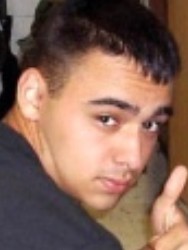 *ALCOZER, CHRISTOPHER M. (KIA)
*ALCOZER, CHRISTOPHER M. (KIA)
Citation:
The President of the United States of America, authorized by Act of Congress July 9, 1918 (amended by an act of July 25, 1963), takes pride in presenting the Silver Star (Posthumously) to Private First Class Christopher Michael Alcozer, United States Army, for conspicuous gallantry and intrepidity in connection with military operations against the enemy while serving with Company C, 2d Battalion, 1st Infantry Regiment, 172nd Stryker Brigade Combat Team, in support of Operation IRAQI FREEDOM near Mosul, Iraq, on 19 November 2005. Private First Class Alcozer displayed extraordinary courage while providing suppressive fire and evacuating casualties during a patrol. While under intense enemy fire, he continued to engage the enemy and evacuate his fellow Soldiers until receiving a fatal wound. Private First Class Alcozer's gallant actions and dedicated devotion to duty, at the cost of his own life, were in keeping with the highest traditions of military service and reflect great credit upon himself, his unit, and the United States Army.
Born At: DeKalb, Illinois
Home Town: DeKalb, Illinois
 ALICEA, BENNY
ALICEA, BENNY
Synopsis:
The President of the United States takes pleasure in presenting the Silver Star Medal to Benny Alicea, Sergeant [then Specialist], U.S. Army, for conspicuous gallantry and intrepidity in action while serving with Company A, 2d Battalion, 7th Infantry Regiment, 1st Cavalry Division, during combat operations in support of Operation IRAQI FREEDOM, on 4 November 2004, in Iraq. Sergeant Alicea, then a Specialist serving as a rifleman and grenadier in Company A, was part of a door-to-door sweep to round up terrorist suspects when his squad was ambushed at a two-story house along the primary north-south road in Fallujah. Dropping back into the courtyard, with gunfire spraying out of the house and from across the street, Sergeant Alicea was struck in the hip and buttocks by shrapnel from two grenades that had been rolled through the front door. Moving away from the courtyard, the squad headed for the street. After continuing to fire on the house, Sergeant Alicea was the last to emerge. When his wounded leg gave out, he huddled into a position alongside three wounded comrades in the middle of the road as multiple rounds flew all around them. He continued firing his weapon at the insurgent forces until his own ammunition was exhausted. He then grabbed magazines from the wounded and managed to protect the position until another Bradley fighting vehicle arrived on the scene. He helped load the most seriously injured soldiers before finally being taken away himself. By his heroic actions he Sergeant Alicia saved the lives of three of his comrades.
Home Town: Attleboro, Massachusetts
Personal Awards: Silver Star (War on Terrorism), Purple Heart
 ALLEN, FREDERICK
ALLEN, FREDERICK
Synopsis:
The President of the United States takes pleasure in presenting the Silver Star Medal to Frederick Allen, Sergeant First Class [then Staff Sergeant], U.S. Army, for conspicuous gallantry and intrepidity in action while serving with Operational Detachment Alpha 512 (ODA-512), 5th Special Forces Group (Airborne), during combat operations in support of Operation IRAQI FREEDOM, at An Najaf, Iraq, on 12 August 2004. Sergeant First Class Allen, the other members of Operational Detachment - Alpha 512, along with 51 Iraqi National Guardsmen, engaged approximately 15 - 20 Mahdi Militiamen embedded inside a school. The detachment, with the Iraqi National Guard in the lead, advanced toward their objective and came under immediate and intense enemy fire from inside the school. Sergeant First Class Allen, the gunner in the detachment's 2d vehicle, ordered his GMV forward, placing himself in the direct line of fire to allow the Iraqi National Guard elements to re-group and reorganize after sustaining several casualties. Multiple times in the fight, Sergeant First Class Allen selflessly stayed in the line of fire battling the enemy, so that others could make it back to cover. Sergeant First Class Allen's actions are in keeping with the finest traditions of military heroism and reflect distinct credit upon himself, this Command, and the United States Army.
Born: at Ann Arbor, Michigan
Home Town: Ann Arbor, Michigan



Synopsis:
The President of the United States of America, authorized by Act of Congress July 9, 1918 (amended by an act of July 25, 1963), takes pleasure in presenting the Silver Star to Sergeant First Class Jacob E. Allison, United States Army, for exceptionally valorous conduct in the face of the enemy of the United States while serving as Senior Engineer and Intelligence Sergeant with Operational Detachments Alpha 3212 & 3214 (ODAs-3212 & 3214), 3d Special Forces Group (Airborne), Special Operations Task Force - 33, Combined Joint Special Operations Task Force - Afghanistan, in support of Operation ENDURING FREEDOM on 2 November 2007, in Southern Afghanistan. On that date, Sergeant First Class Allison was part of a 68-member detachment of U.S. Army Special Forces and Afghan soldiers who were attempting to locate and destroy enemy forces in rugged mountains of one of the most highly-contested areas of the country, when they were attacked by 300 to 400 enemy soldiers. Although under heavy fire from the enemy, he went to the rescue of an Afghan Army soldier who has been seriously wounded. Sergeant First Class Allison's gallant actions are in keeping with the finest traditions of military heroism and reflect distinct credit upon himself, Special Operations Task Force - 33, the Combined Joint Special Operations Task Force - Afghanistan, Special Operations Command Central, and the United States Army.
Born: at Rochester, New York
Home Town: Livonia, New York
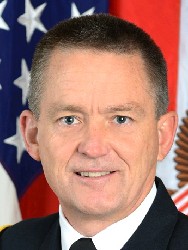

Synopsis:
The President of the United States of America, authorized by Act of Congress July 9, 1918 (amended by an act of July 25, 1963), takes pleasure in presenting the Silver Star to Colonel (Infantry) Daniel Bartlett Allyn, United States Army, for gallantry in action in support of Operation IRAQI FREEDOM, in Iraq, while serving as Commanding Officer of the 3d Brigade, 3d Infantry Division in April 2003. Colonel Allyn's heroic leadership and dedicated devotion to duty, without regard for his own life, were in keeping with the highest traditions of military service and reflect great credit upon himself, the 3d Infantry Division, and the United States Army.
Home Town: Berwick, Maine


Synopsis:
The President of the United States takes pleasure in presenting the Silver Star Medal to Jose Alvarez, Specialist, U.S. Army, for conspicuous gallantry and intrepidity in action while serving with the 1st Battalion, 506th Infantry Regiment, 101st Airborne Division, during combat operations in support of Operation IRAQI FREEDOM. On 13 March 2006, Specialist Alvarez distinguished himself at Ramadi, Iraq, as a member of Task Force CURRAHEE, risking his own life numerous times to come to the aid of his comrades. When a barrage of small-arms fire and rocket-propelled grenades wounded one of his comrades, leaving him incapacitated in the middle of the street, Specialist Alvarez left cover and ran into the kill zone. He covered his comrade's body with his own and returned fire on the enemy, before dragging the wounded man to safety. Specialist Alvarez' actions are in keeping with the finest traditions of military heroism and reflect distinct credit upon himself, this Command, and the United States Army.
Home Town: West Orange, New Jersey
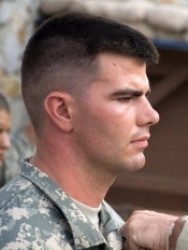

Citation:
The President of the United States of America, authorized by Act of Congress July 9, 1918 (amended by an act of July 25, 1963), takes pleasure in presenting the Silver Star to First Lieutenant (Infantry) Gregory Earl Ambrosia, United States Army, for gallantry in actions while serving as Executive Officer, Company A, 2d Battalion (Airborne), 503d Parachute Infantry Regiment, 173d Airborne Brigade Combat Team, in action in support of Operation Enduring Freedom , in Afghanistan, on 25 - 26 September 2007. First Lieutenant Ambrosia's gallant actions and dedicated devotion to duty, without regard for his own life, were in keeping with the highest traditions of military service and reflect great credit upon himself, his unit, and the United States Army. NARRATIVE TO ACCOMPANY AWARD: On 25 September 2007, Able Company, 2d Battalion (Airborne), 503d Infantry air assaulted into the village of Qowru and conducted a search and attack through the village and surrounding caves in order to disrupt Taliban and Al Qaeda forces in the Watapor Valley. The Company Executive Officer, First Lieutenant Ambrosia air assaulted into OP REDSKINS, one of two company observation posts (OP's) overlooking Qowru, in order to establish a command radio relay station and overwatch the mounted assault element in the valley with 60-mm. indirect fire. Upon occupation, ICOM intercepts informed the OP that the enemy was mobilizing and massing for an attack on both company OP's and the mounted maneuver element in the valley. Immediately upon insertion, the 22 Soldiers of 1st Platoon which assaulted OP REDSKINS linked up and moved towards their position overlooking the valley. There were explosions and shots fired across the valley during the night, but no fires were directed at OP REDSKINS. By morning the OP observed the rest of the Company move into position and begin their search and attack through the valley. A fire team plus-sized element of Anti-Coalition Militia was maneuvering to high ground to the east of the company when they made contact with the position at OP REDSKINS. The first individual that came close to the OP was an enemy scout. The individual was engaged immediately and within minutes several of the ACM fighters engaged the observation post with an intense volume of fire. Without any hesitation, First Lieutenant Ambrosia immediately assessed the situation and reported to the Company Commander who was located down in the valley and by this time under fire as well. He gave the enemy situation and without any concern for his own safety remained in place while exposed to heavy enemy fire from ACM forces advancing on his position to within hand grenade range. He continued directing fires and making critical radio transmissions using both FM and TACSAT communication. His timely and accurate calls for 40-mm. and 81-mm. danger close fire were the only effective defense for the OP. While the rest of the element were throwing hand grenades and engaged in close combat with a flanking ACM force, First Lieutenant Ambrosia held his position under heavy direct fire during the 4 hours of the engagement without deviating from his radio transmissions. He requested fire missions, using three different indirect fire assets and close air support simultaneously. First Lieutenant Ambrosia's strong character gave him the tools he needed to repel the enemy attack. First Lieutenant Ambrosia's indirect fire was able to hold the enemy front, which allowed the rest of the OP to fight back the enemy's attempt to turn their flank. First Lieutenant Ambrosia continued providing covering fire simultaneously as he had to make corrections on the 500 pound bombs dropped all within danger close. He gave the Battalion Commander updates of the enemy and friendly situations as they developed. He continued to hold his position even though he was constantly exposed to close heavy enemy fire. First Lieutenant Ambrosia kept keeping Close Combat Air updated on the enemy's location allowing the AH-64 (Apache) to effectively engage and kill three ACM fighters. Despite constant signal intercepts suggesting advancing and flanking maneuver forces, his ability to continue setting the tactical conditions gave the Non-Commissioned Officers and all junior leaders the ability to maneuver their Paratroopers. First Lieutenant Ambrosia's actions throughout the entire engagement were of the highest degree of valor. He performed honorably while under direct enemy fire and effectively engaged the enemy under the most difficult circumstances. First Lieutenant Ambrosia was a key leader during the battle, providing true leadership to the entire element. Even when events became dire, he kept his demeanor and without hesitation took the fight to the enemy. His actions are the true embodiment of the Infantry Warrior Ethos.


Synopsis:
The President of the United States takes pleasure in presenting the Silver Star Medal to David S. Anderson, Staff Sergeant, U.S. Army, for conspicuous gallantry and intrepidity in action while serving as a Section Leader with 1st Platoon, Company B, 1st Battalion, 36th Infantry Regiment, 1st Armored Division, during combat operations in support of Operation IRAQI FREEDOM, at Ramadi, Iraq, on 24 September 2006. When a dismounted team was attacked during an operation and several men were wounded, Staff Sergeant Anderson's section leader, Staff Sergeant Jason P. Trumpower led his Bradley Fighting Vehicle in an attempt to evacuate the Soldiers after a tank accompanying him had trouble negotiating the narrow streets. The vehicle was hit by an IED, disabling it and critically wounding the driver and pinning Staff Sergeant Trumpower in the vehicle, whereupon he maintained security and notified higher headquarters of the situation. Staff Sergeant Anderson, who was also responding to the call for aid in his Bradley Fighting Vehicle, linked up with Staff Sergeant Trumpower and began evacuating the crew as another vehicle dealt with the dismounted casualties. He was directing his vehicle back to Camp Ramadi when it, too, was disabled by an IED, wounding five inside. The explosion knocked out communications and caused a fire in the rear compartment. Staff Sergeant Anderson, who had been outside checking his gunner and driver, attempted to let down the rear ramp and the troop door, but both were jammed. Staff Sergeant Trumpower, with severe wounds to his hands and face, tried to get the cargo hatch open. With Staff Sergeant Anderson's help, the two men were able to open it wide enough to evacuate the vehicle. Another soldier, although also wounded and disoriented by the flames, found the fire-suppression handle and doused the blaze long enough for everyone to escape. Once everyone was out, Staff Sergeant Anderson took a rifle from the vehicle and single- handedly made sure there were no insurgents within a nearby building, while Staff Sergeant Trumpower guarded the wounded and a medic evaluated and stabilized them. After they moved the wounded into the building, Staff Sergeant Anderson attempted to retrieve a radio and smoke grenade to signal their location, only to find both destroyed in the vehicle. Knowing the wounded driver was going into shock and could bleed to death without immediate evacuation, he ran about 400 meters to try and get the attention of a nearby tank crew. Unable to get the attention of the tank, he ran farther down the road to wave down a Bradley Fighting Vehicle, then led it back to the wounded Soldiers, and subsequently supervised the loading of his men.
Home Town: Batesville, Mississippi
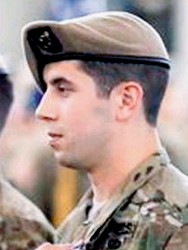

Citation:
The President of the United States of America, authorized by Act of Congress July 9, 1918 (amended by an act of July 25, 1963), takes pleasure in presenting the Silver Star to Sergeant Derek J. Anderson, United States Army, for gallantry in action as a Ranger Fire Team Leader in Company B, 1st Battalion, 75th Ranger Regiment,, for a Joint Task Force in support of Operation ENDURING FREEDOM in Afghanistan, on 2 December 2014. During this period, Sergeant Anderson maneuvered on multiple enemy fighting positions over a sustained six hour direct fire engagement, resulting in over 25 enemy combatants killed. With no regard to personal safety, Sergeant Anderson placed himself in direct fire and imminent danger in order to move a wounded Ranger behind cover. Sergeant Anderson undoubtedly saved the lives of numerous Rangers and directly contributed to the success of the Joint Task Force. Through his distinctive accomplishments, Sergeant Anderson reflected great credit upon himself, this Command, and the United States Army. NARRATIVE TO ACCOMPANY AWARD: Sergeant Derek J. Anderson distinguished himself through conspicuous gallantry and intrepidity on 2 December 2014 as a Ranger Fire Team Leader while deployed to Afghanistan in support of Operation ENDURING FREEDOM. On 2 December 2014, Sergeant Anderson was a Ranger Fire Team Leader for a Joint Task Force tasked with executing an objective in Nangahar Province, Afghanistan. After execution of the first targeted compound, the Assault Force (AF) moved to clear an assessed media center approximately two kilometers away. During movement to the follow on objective, two enemy combatants two armed with ATK-47's maneuvered through the wood line on the left flank of the lead element. Sergeant Anderson was within near ambush range when one enemy combatant took aim at the pointman with intent on engaging the Assault Force. When the enemy combatant "charged" his weapon system, Sergeant Anderson instinctively maneuvered to a point of tactical advantage with zero regard for personal safety and accurately engaged one of the two enemy combatants. Sergeant Anderson continued to fire on the remaining enemy who then took cover in a ditch while engaging the Assault Force. He then ordered Corporal Doffing and Private First Class Fausey to continue suppressing the ditch as Staff Sergeant Jones and Sergeant Dunn maneuvered to cover as they were exposed to enemy fire. Upon reaching cover, Staff Sergeant Jones employed a hand grenade on the enemy fighting position as they continued to engage the Assault Force. Knowing the risk of enemy fire involved, Sergeant Anderson exposed himself yet again in order to precisely fix the enemy's position with direct fire until the hand grenade detonated. Sergeant Anderson's direct actions during this near ambush resulted in two EKIAs and the safe passage of the assault force through fortified enemy positions. While executing an objective, Sergeant Anderson was tasked with isolating the follow-on targeted compound from enemy influence. When the callout began, six enemy personnel left a neighboring compound and moved west along the southern wall towards the Assault Force. Sergeant Anderson, along with Sergeant Dunn, engaged the enemy before they had a chance to affect the Assault Force, resulting in five EKIAs. The remaining combatant immediately began fleeing to the east and was engaged by Rotary Wing Close Air Support (CAS). During the call out of the follow-on objective, three barricaded fighters inside the target compound engaged the roof top security team with small arms and fragmentation grenades. Sergeant Dunn and Sergeant Anderson moved to the southwest breach of the compound to engage the enemy with Sergeant Dunn's M-320 grenade launcher. After shooting a 40-mm. grenade at the compound, Sergeant Dunn was struck by close enemy fire and fell down the embankment into the courtyard of the compound. Willingly and without hesitation or regard for his own personal safety, completely exposing himself to heavy automatic gunfire, Sergeant Anderson ran into the courtyard and grabbed Sergeant Dunn, pulling him back to the breach and eventually to cover for treatment, while Sergeant First Class White and Staff Sergeant Healy suppressed the northern building. Sergeant Anderson's quick and decisive actions saved the life of a fellow Ranger and prevented any other injuries from happening within the targeted compound. Through his distinctive accomplishments, Sergeant Anderson's actions were exceptional and reflect great credit upon himself, his unit, and the Department of Defense.


Synopsis:
The President of the United States takes pleasure in presenting the Silver Star Medal to Roderick C. Anderson, Sergeant Major, U.S. Army, for conspicuous gallantry and intrepidity in action while serving with Operational Detachment Alpha 365 (ODA-365), 2d Battalion, 3d Special Forces Group (Airborne) in support of Operation ENDURING FREEDOM, on 3 July 2004, in Afghanistan. On that date, Sergeant Major Anderson was leading a task force of Special Forces soldiers, Marines and Afghan soldiers out of the Korangal Valley in the Konar province of Afghanistan, when his convoy of 15 vehicles was ambushed while heading out of the valley after capturing nine suspected insurgent leaders. Guerrillas were dug in behind a stone wall and peppered the convoy from three sides with rocket-propelled grenades and machine-gun fire. Afghan security forces with the Special Forces team were in the lead vehicle and stopped to find cover, trapping the rest of the convoy in the kill zone. Sergeant Major Anderson jumped out of his truck and fired back with a machine gun. Caught in a crossfire, he continued to fire without losing command of the more than 80 soldiers under his command. He also directed strafing runs by A-10 attack fighter jets, the award citation said. After firing the anti-tank weapon at the guerrillas, Sergeant Major Anderson again exposed himself to machine-gun fire when he placed a wounded soldier in his seat as the convoy escaped the valley. He ran along with the truck for more than 300 meters, carrying a machine gun and ammunition. Before the soldiers could escape, enemy fighters disabled a truck containing sensitive communications equipment. Anderson covered a four-man team as it destroyed the truck so the equipment would not fall into enemy hands.
Personal Awards: Silver Star (War on Terrorism), Soldiers Medal
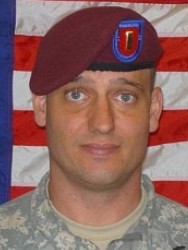

Synopsis:
The President of the United States of America, authorized by Act of Congress July 9, 1918 (amended by an act of July 25, 1963), takes pride in presenting the Silver Star (Posthumously) to Second Lieutenant (Infantry) Darryn Deen Andrews, United States Army, for conspicuous gallantry and intrepidity in connection with military operations against the enemy while serving with the 1st Battalion, 501st Parachute Infantry Regiment, 4th Brigade Combat Team (Airborne), 25th Infantry Division, in support of Operation ENDURING FREEDOM in Afghanistan, on 4 September 2009. While recovering a vehicle that was disabled, Second Lieutenant Andrews' Platoon came under heavy RPG fire. Second Lieutenant Andrews fatally placed himself between the incoming enemy fire and his fellow comrades. His courage under fire was essential in saving another Soldier's life, and saving the lives of five other Soldiers who were with him. His gallant actions and dedicated devotion to duty, without regard for his own life, were in keeping with the highest traditions of military service and reflect great credit upon himself, his unit, and the United States Army.
Home Town: Dallas, Texas
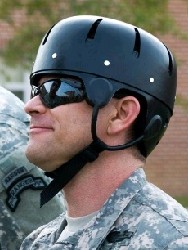

Citation:
The President of the United States of America, authorized by Act of Congress July 9, 1918 (amended by an act of July 25, 1963), takes pleasure in presenting the Silver Star to Staff Sergeant Dominic J. Annecchini, United States Army, for conspicuous gallantry and intrepidity in action on 16 May 2012 during combat operations against an armed enemy of the United States as a Squad Leader for a Joint Task Force in support of Operation Enduring Freedom. On this date, Sergeant Annecchini fearlessly exposed himself to effective fire from multiple barricaded shooters in order to rescue a wounded Afghan special operations soldier. He was critically wounded during the engagement, but his selfless actions neutralized several barricaded enemies and prevented further friendly casualties. Staff Sergeant Annecchini's distinctive accomplishments are in keeping with the finest traditions of military service and reflect great credit upon himself, this Command, and the United States Army. NARRATIVE TO ACCOMPANY AWARD: Staff Sergeant Dominic J. Annecchini, United States Army distinguished himself by exceptionally heroic gallantry on 16 May 2012 as a Ranger Rifle Squad Leader while deployed to Afghanistan in support of Operation ENDURING FREEDOM. Staff Sergeant Annecchini's heroic actions under effective enemy fire during combat operations in eastern Afghanistan saved the lives of at least two of his teammates and were instrumental in the death of at least five enemy fighters. On 16 May 2012, Staff Sergeant Annecchini participated in a hasty raid against enemy fighters in eastern Afghanistan. Staff Sergeant Annecchini was the mentor to an Afghan squad, assisting with their mission planning and clearance of the objective. After the assault force inserted in to the target area, Staff Sergeant Annecchini followed and supported the Afghan squad as they moved in to assault positions. Once the target compound was isolated and contained by the remainder of the assault force, the Afghan squad began their deliberate clearance with Staff Sergeant Annecchini following to provide guidance and direction throughout the mission. Staff Sergeant Annecchini trailed the Afghan squad throughout the clearance of the target compound, providing guidance to the Squad Leader as they entered and secured each room. As the Afghan troops moved from west to east along the compound, they removed civilian men, women and children and placed them in to protective custody outside the building. The Afghan squad sent a team in to the last outside door of the compound and began clearance while Staff Sergeant Annecchini remained outside to continue communication with the Afghan squad leader. Once the Afghan troops entered the last room, their lead man received effective fire from five barricaded enemy inside the room. The Afghan soldier was critically wounded and fell forward into the room with the enemy combatants. Staff Sergeant Annecchini realized the necessity to immediately neutralize the enemy threat and retrieve the fallen Afghan soldier, so he risked his own life to move toward the breach of the room. Staff Sergeant Annecchini had a choice to either remain behind cover or to deliberately enter the room where one Afghan soldier had already been critically wounded by enemy fire. There was no cover or concealment for Staff Sergeant Annecchini as he moved toward the fallen Afghan soldier, and he knew he would be exposed to the same enemy gunfire that had wounded the Afghan soldier. With no regard for his own personal safety, Staff Sergeant Annecchini entered the compound, moved to the breach of the last room, secured the breach, and communicated with his platoon sergeant to come up with a course of action to secure the fallen Afghan soldier and move him to safety.
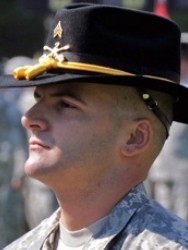

Synopsis:
The President of the United States of America, authorized by Act of Congress July 9, 1918 (amended by an act of July 25, 1963), takes pleasure in presenting the Silver Star to Corporal Jose G. Arocha, United States Army, for conspicuous gallantry and intrepidity in connection with military operations against the enemy while serving with the 4th Squadron, 2d Stryker Cavalry Regiment, in action on 19 March 2011 in support of Operation ENDURING FREEDOM the vicinity of Shah Wali Khot, Afghanistan. Corporal Arocha's action and courage under enemy fire directly contributed to the killing of an enemy insurgent and thereby saving the lives of his fellow soldiers. By his outstanding bravery and courage corporal Arocha served to inspire all who observed him and upheld the highest traditions of the armed forces. His actions bring great credit upon himself, 2d Cavalry Regiment, and the United States Army.
ARZAMENDI, NICHOLAS L.
Synopsis:
The President of the United States of America, authorized by Act of Congress July 9, 1918 (amended by an act of July 25, 1963), takes pleasure in presenting the Silver Star to Corporal Nicholas L. Arzamendi, United States Army, for conspicuous gallantry and intrepidity in connection with military operations against the enemy while serving with the 3d Battalion, 160th Special Operations Aviation Regiment (Airborne), in support of Operation ENDURING FREEDOM in Afghanistan 14 September 2011. On that date he was a member of one of two aircraft dispatched to recover a Navy explosive ordnance disposal (EOD) technician who had been badly injured by an antipersonnel IED in a very active region with a large confirmed insurgent presence. The technician was successfully recovered and, despite the loss of his leg, received life-saving medical treatment. Corporal Arzamendi's gallant actions and dedicated devotion to duty, without regard for his own life, were in keeping with the highest traditions of military service and reflect great credit upon himself, his unit, and the United States Army.


Citation:
The President of the United States of America, authorized by Act of Congress July 9, 1918 (amended by an act of July 25, 1963), takes pleasure in presenting the Silver Star to Specialist Chase N. Ash, United States Army, for gallantry in action on 12 September 2004 during combat operations against an armed enemy while serving with Company A, 1st Battalion, 9th Cavalry Regiment, 1st Cavalry Division, in Baghdad, Iraq, in support of Operation IRAQI FREEDOM. With total disregard for his own safety, he risked his life to save the lives of his comrades. Specialist Ash's ability to react quickly and selflessly to a vehicle-borne improvised explosive device enabled the Soldiers in the disabled and burning vehicle to escape to safety. Specialist Ash's heroism and gallantry in battle are in keeping with the finest traditions of military service and reflects great credit upon himself, Company A, and the United States Army. NARRATIVE TO ACCOMPANY AWARD: On the morning of 12 September 2004 Alpha Company, 1st Battalion, 9th Cavalry Regiment, 1st Cavalry Division, was conducting operations on Haifa Street in Baghdad, Iraq, to extract the beleaguered 1-9 Cavalry scout platoon and Navy SEAL snipers from an observation post on the top of a 17-story apartment building. Upon arriving at the objective area, Alpha Company encountered an enemy force of 60 AIF fighters and came under heavy enemy RPG, grenade, and small arms fire from all directions. 2d Platoon was tasked to secure the objective area from the southeast. At approximately 0643 a VBIED turned northwest onto Haifa Street at a high rate of speed. The vehicle drove up onto the sidewalk and directly into A50, the Company Executive Officer's Bradley Fighting Vehicle. The explosives in the vehicle detonated on impact and the Bradley burst into flames. Specialist Ash distinguished himself with heroism under enemy fire by risking his life to save the lives of his comrades. Without orders, Specialist Ash displayed extraordinary courage, exposing himself to the heavy volume of enemy small arms, grenade and RPG fire by running 50 meters forward of his covered and concealed position to the burning Bradley. Upon reaching the Bradley Fighting Vehicle, he exposed himself a second time by climbing onto the burning vehicle, exposing himself to both enemy fire and intense heat as he peered into the driver's hatch. Seeing the driver's seat empty, he dismounted the vehicle and moved to the side of the emblazed Bradley, where he was still exposed to enemy fire and intense flames. He remained there, in the open, helping the six wounded soldiers down off the vehicle and then directed them to the nearest covered and concealed position. Specialist Ash personally led the Bradley crew across the open area to link up with the rest of the squad behind cover. After first aid was given to the wounded soldiers, the Platoon's Bradley Fighting Vehicles maneuvered to pick up the wounded. The vehicles, however, were restricted by the terrain and could not get to a position that would allow the wounded to be loaded behind cover. The wounded would have to cross an open area to get to the Bradley Fighting Vehicles. Specialist Ash, determined to ensure the wounded were loaded into the vehicle safely, provided suppressive fire on known enemy positions and overwatched the area. Specialist Ash, undaunted by the vicious fighting, refused to mount the armored vehicle and remained in his position to place fire on the enemy until the last possible moment when the company began to move from the objective area. Specialist Ash was instrumental in providing direction to the wounded and badly shaken soldiers from the vehicle. His extraordinary heroism and gallantry in battle at risk to his own life, saved the lives of his comrades and were in keeping with the highest traditions of the military service, and brings great credit upon himself, 1st Battalion, 9th Cavalry, 1st Cavalry Division, and the United States Army.
Home Town: Mentone, California


Citation:
The President of the United States takes pleasure in presenting the Silver Star Medal to Randall Lee Ashby, First Lieutenant (Corps of Engineers), U.S. Army, for gallantry while serving as the Platoon Leader of Second Platoon, Company B, 317th Engineer Battalion, 2d Battalion, 69th Armor Regiment, 3d Infantry Division (Mechanized). First Lieutenant Ashby consistently demonstrated valor in executing his engineer missions as the lead sapper platoon leader for Task Force 2-69 Armor. Serving with Team ASSASSIN, he voluntarily executed dangerous missions in order to contribute to the engineer's success. First Lieutenant Ashby's personal bravery and selfless actions are in keeping with the highest traditions of the military service and reflect great credit upon himself, Third Infantry Division "Rock of the Marne," and the United States Army.
NARRATIVE TO ACCOMPANY AWARD:
For gallantry in connection with military operations against a hostile force in the country of Iraq in support of Operation IRAQI FREEDOM. First Lieutenant Ashby distinguished himself while serving as Platoon Leader with Second Platoon, Company B, 317th Engineer Battalion, and attached to 2d Battalion, 69th Armor Regiment, 3d Infantry Division (Mechanized). First Lieutenant Ashby exhibited extreme gallantry on multiple occasions in over 25 days of continuous combat operations. He spearheaded engineer movement for the Division for roughly 200 kilometers to OBJ CLAY, the Highway 1 Bridge across the Euphrates located to the west of An Nasiriyah. On the night of 21 March 2003, First Lieutenant Ashby led the engineer effort at OBJ CLAY under Team Assassin by providing the first reconnaissance of this key bridge as elements of the Iraqi 11th Infantry Division defended the area. First Lieutenant Ashby, while under fire, conducted a difficult classification mission and ensured the safe passage of an armored company onto OBJ CLAY NORTH. Moreover, after the Task Force had established a tactical assembly area to the west, First Lieutenant Ashby returned to OBJ CLAY to reconnoiter a construction bridge adjacent to the Highway 1 Bridge amid enemy artillery fire from the northern shore. Later, as Team Assassin conducted a dangerous linkup with elements of 3-7 Cavalry south of the city of Al Kifl, First Lieutenant Ashby directed his platoon's emplacement of vital blocking obstacles to prevent enemy penetration of the company's sector for more than seventy hours of continuous enemy contact. In addition, under his leadership 2nd Platoon destroyed 300 pounds of TNT intended by the enemy for use on the Al Kifl Bridge. In southern Al Kifl, his platoon gained entry using demolitions to a water-bottling factory with a water supply greatly needed by both the Task Force and the local populous. First Lieutenant Ashby again distinguished himself on 1 April 2003 by emplacing explosive obstacles along RTE VENEZUELA to the east of the key city of Karbala at OBJ LEE. He led the emplacement with Team Assassin under fire from Saddam Fedayeen RPG ambushes and T-62 tanks. On 6 April 2003 again with Team Assassin as the lead element of the Task Force's attack into the Taji region north of Baghdad against Republican Guard and Saddam Fedayeen units, First Lieutenant Ashby personally destroyed with, MK-19 fire, eight enemy RPG teams and dismounted enemy soldiers over a 55 kilometer attack to OBJ MONTY. He displayed calm leadership following a fatal enemy RPG strike on one of his M113 armored personnel carriers, providing stability for his men as they treated two other soldiers wounded in action. While escorting a D9 Dozer, a Division high value asset, to OBJ MONTY, First Lieutenant Ashby protected the dozer from an enemy vehicle intent on ramming them. First Lieutenant Ashby's personal bravery as the lead sapper platoon leader for Task Force 2-69 Armor are in keeping with the highest traditions of military service and reflect great credit upon himself, Third Infantry Division "Rock of the Marne," and the United States Army.
Born: January 1, 1977 at Arlington Heights, Illinois
Home Town: Spartanburg, South Carolina
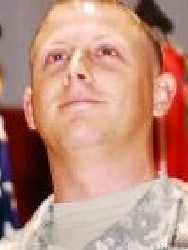

Citation:
The President of the United States of America, authorized by Act of Congress July 9, 1918 (amended by an act of July 25, 1963), takes pleasure in presenting the Silver Star to Specialist James David Ashley, United States Army, for gallantry in action while performing his duties as a dismounted squad member in the 1st Platoon, Troop K, 3d Squadron, 3d Armored Cavalry Regiment, in action on 12 November 2008, in support of Operation IRAQI FREEDOM, in Iraq. On that date, Specialist Ashley was on dismounted patrol in Mosul, Iraq. While securing the courtyard of a small building in the platoon's sector, an Iraqi army soldier in uniform opened fire on him and his platoon, killing one soldier, and mortally wounding another. Without thinking and acting only on instinct, Specialist Ashley grabbed the private next to him and pushed the Soldier to cover. He then found cover and returned fire on the shooter. Shot in the face, he disregarded his injuries and continued to fire until the threat was neutralized. He then secured the three rooms of the building and continued to provide perimeter security. Refusing evacuation due to his wounds, as the platoon evacuated, Specialist Ashley took over one of the vehicles as truck command, a role he volunteered to perform and normally reserved for a noncommissioned officer. Specialist Ashley's action saved the lives of 12 men in his unit. NARRATIVE TO ACCOMPANY AWARD: Specialist James David Ashley displayed exceptionally valorous conduct while performing his duties as a dismounted squad member in 1st platoon, Killer Troop, 3d Squadron, 3d Armored Cavalry Regiment. On 12 November 2008, 1st Platoon, Killer Troop, conducted movement to the Zinjali traffic circle, Mosul, Iraq, in order to conduct SOI engagement with 1st Company, 2nd Battalion, National Police, who are co-located with elements of the 1/6/2 Iraqi Army. Upon entering the Iraqi compound, Specialist Ashley assumed a security position in the courtyard area while his platoon leader moved into the commander's office to conduct SOI engagements, while the SOI engagement was being conducted, an IA soldier walked out of a nearby room and began firing an AK-47 assault weapon, charged with a 75 round drum magazine, into American Soldiers who were also pulling security into the courtyard. Showing unequaled courage and bravery Specialist Ashley pushed one of his fellow platoon members out of the line of fire before finding cover for himself. As Specialist Ashley dove to the ground, he was struck by enemy fire in the face. Specialist Ashley faced multiple rounds of incoming fire passing only inches from him. He fired over 60 rounds into the combatant before the extremely close quarters firefight was complete. When the enemy gunman was effectively neutralized, Specialist Ashley stood to find one American Soldier KIA and four others wounded. Disregarding the fact that he was bleeding from his wounds, and his body armor was covered in blood, Specialist Ashley did not seek medical attention; he only asked where his help was needed. There were three nearby rooms with unknown occupants. Specialist Ashley moved with two of his fellow Soldiers to clear the rooms and secure all individuals within them in a centralized location. After this was complete and the site was considered under control, Specialist Ashley took a knee and pulled security, preparing for a second attack, despite having been told multiple times that he could move to a vehicle. Specialist Ashley's TC, Staff Sgt. Greenwood, had been injured during the attack and was taken to the Combat Support Hospital, leaving no TC for his vehicle. Specialist Ashley quickly volunteered for the position and was granted permission to enable to the remaining HMMVV's to move to the CSH. The actions of Specialist Ashley saved the lives of twelve American Soldiers. His heroism and courage are an inspiration to all American Soldiers. Specialist Ashley's actions demonstrate the highest qualities of Cavalry excellence and reflect distinct credit upon himself, Thunder Squadron, the Regiment of the Mounted Riflemen, and the United States Army.
Home Town: Key West, Florida


Citation:
The President of the United States of America, authorized by Act of Congress July 9, 1918 (amended by an act of July 25, 1963), takes pleasure in presenting the Silver Star to Staff Sergeant Robert B. Ashwell, United States Army, for conspicuous gallantry and intrepidity in connection with military operations against the enemy on 6 April 2013, while serving as the Senior Weapons Sergeant, Special Forces Operational Detachment-Alpha 3131, Special Operations Task Force-East, Bagram Airfield, Afghanistan in support of Operation ENDURING FREEDOM. Staff Sergeant Ashwell distinguished himself while his element was receiving a large volume of effective fire from two sides. He then bounded through heavy enemy fire to clear a compound enabling the Operational Detachment-Alpha to take cover. Staff Sergeant Ashwell, with complete disregard for his own safety, charged through a hail of enemy fire to assist a friendly casualty. His bravery and calm demeanor under fire saved countless lives and facilitated the extraction of casualties from the engagement area. His actions are in keeping with the finest traditions of military heroism and reflect distinct credit upon himself, the Combined Joint Special Operations Task Force Afghanistan, the Special Operations Joint Task Force-Afghanistan, the United States Forces-Afghanistan, and the United States Army. NARRATAIVE TO ACCOMPANY AWARD: Staff Sergeant Robert B. Ashwell, United States Army, heroically distinguished himself by exceptionally valorous conduct in the face of the enemy of the United States as a Weapons Sergeant, Special Forces Operational Detachment-Alpha (ODA) 3131, Special Operations Task Force-East, Bagram Airfield, Afghanistan, Combined Joint Special Operations Task Force Afghanistan in support of Operation ENDURING FREEDOM. On 06 April 2013, Sergeant Ashwell, 10 other Special Forces Operators, a Forward Observer, a Combat Controller and 2 interpreters were sent into the Sono Valley to extract friendly forces, who were pinned down in a compound by over 100 Taliban and foreign fighters near Bar Ghunday Village, Shigal Wa Sheltan District, Kunar Province. By 0830 in the morning, the enemy surrounded the compound and were within 200 meters of the perimeter wall, engaging from elevated, fortified fighting positions with small arms, machine gun and rocket propelled grenade fire. The ODA, serving as a secondary quick reaction force, moved to the mouth of the Sono Valley and were tasked to secure a casualty evacuation corridor and facilitate the extraction. Once at the mouth of the valley, the ODA realized that their vehicles were not able to traffic the Sono Valley road. The ODA initiated a four kilometer foot movement under heavy enemy fire to seize a tactically advantageous position to control fires and secure the casualty evacuation corridor. Once the ODA was within 400 meters of the pinned down element, the ODA was receiving extremely accurate enemy fire from the south and east. To get the ODA out of the open area, Sergeant Ashwell along with another member of the ODA, ran to a nearby compound and kicked in a locked exterior door as machine gun bursts were hitting the exterior wall next to the door. Once inside, they cleared the structure as the rest of the ODA followed them inside to take cover and establish a command and control position. With complete disregard for his own safety, Sergeant Ashwell, along with two other members from the ODA, continued east and established a critical overwatch position of the corridor to begin extracting the pinned down element. While the pinned down element was moving past their overwatch position, Sergeant Ashwell observed the two friendly casualties approaching an open dry river bed, which was receiving heavy machine gun fire. Sergeant Ashwell and another member of the ODA advanced forward 50 more meters into the linear danger area to facilitate the movement of casualties. While running forward, the enemy fire was so accurate that Sergeant Ashwell's antenna was shot off his radio. Undeterred by the enemy fire, and with complete disregard for his own safety, he charged through a hail of enemy fire to recover the now fallen casualty. Both Sergeant Ashwell and his teammate took control of the fallen casualty and carried him back through the linear danger area and into a nearby vehicle. His bravery and calm demeanor while under a heavy volume of effective enemy fire certainly saved countless American and Afghan lives and facilitated the extraction of the pinned down friendly forces from the Sono Valley. His actions are in keeping with the finest traditions of military heroism and reflect distinct credit upon himself, the Combined Joint Special Operations Task Force-Afghanistan, the Special Operations Joint Task Force-Afghanistan, the United States Forces-Afghanistan, and the United States Army.
Home Town: Rocky Mount, Virginia


Synopsis:
The President of the United States of America, authorized by Act of Congress July 9, 1918 (amended by an act of July 25, 1963), takes pleasure in presenting the Silver Star to Brigadier General Lloyd James Austin, III, United States Army, for conspicuous gallantry and intrepidity in connection with military operations against the enemy as Assistant Division Commander for Maneuver, 3d Infantry Division, in support of Operation IRAQI FREEDOM during the Battle for Baghdad, Iraq, in April 2003. Brigadier General Austin's heroic leadership and dedicated devotion to duty, without regard for his own life, were in keeping with the highest traditions of military service and reflect great credit upon himself, the 3d Infantry Division, and the United States Army.
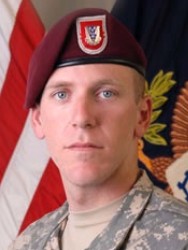

Citation:
The President of the United States of America, authorized by Act of Congress July 9, 1918 (amended by an act of July 25, 1963), takes pleasure in presenting the Silver Star to Corporal Jonathan R. Ayers, United States Army, for conspicuous gallantry and intrepidity in action against the enemy while serving as a Machine Gunner with Company C, 2d Battalion (Airborne), 503d Parachute Infantry Regiment, 173d Airborne Brigade Combat Team, during an enemy attack on Vehicle Patrol Base Wanat, in Kunar Province, Afghanistan, in support of Operation Enduring Freedom. Corporal Ayers' perseverance under fire and courage in the face of mortal danger, at the cost of his own life, saved the day when almost all had been lost. Corporal Ayers' valorous efforts, enabling the defeat of a numerically superior enemy force, are in keeping with the finest traditions of military service and reflect great credit upon himself, the 173d Airborne Brigade Combat Team, and the United States Army.
Home Town: Snellville, Georgia
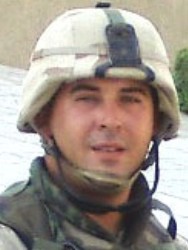

Synopsis:
The President of the United States of America, authorized by Act of Congress July 9, 1918 (amended by an act of July 25, 1963), takes pride in presenting the Silver Star (Posthumously) to Specialist Travis Alan Babbitt, United States Army, for conspicuous gallantry and intrepidity in action against the enemy while serving with the 1st Battalion, 8th Cavalry Regiment, 1st Cavalry Division, in action against the enemy in support of Operation IRAQI FREEDOM, during an ambush on 9 November 2004, in Baghdad, Iraq. Specialist Babbitt's gallant actions and dedicated devotion to duty, without regard for his own life, were in keeping with the highest traditions of military service and reflect great credit upon himself, his unit, and the United States Army.
Home Town: Uvalde, Texas


Citation:
The President of the United States takes pleasure in presenting the Silver Star Medal to Brent R. Baldwin, Staff Sergeant, U.S. Army, for conspicuous gallantry and intrepidity in action against enemy forces while serving as the Detachment Weapons Sergeant for Special Forces Operational Detachment Alpha 062 (ODA-062), Company C, 2d Battalion, 10th Special Forces Group (Airborne), under Advanced Operational Base 060, in action at Baqubah, Iraq, on 9 April 2004, during combat operations in support of Operation IRAQI FREEDOM. Staff Sergeant Baldwin's outstanding leadership, personal bravery and selfless actions are in keeping with the highest traditions of the military service and reflect great credit upon himself, the 10th Special Forces Group (Airborne), and the United States Army.
NARRATIVE TO ACCOMPANY AWARD:
Staff Sergeant Brent R. Baldwin distinguished himself through conspicuous gallantry and intrepidity in action against enemy forces, in Baqubah, Iraq, on 9 April 2004, while serving as the Detachment Weapons Sergeant for Special Forces Operational Detachment Alpha 062 (ODA-062), Company C, 2d Battalion, 10th Special Forces Group (Airborne), under Advanced Operational Base 060. Staff Sergeant Baldwin's heroism and bravery under intense enemy fire and in total disregard for personal safety, saved the life of a wounded American Soldier and led to the overwhelming success and survival of Operational Detachment Alpha 062 (ODA-062) in an engagement with Anti Iraqi Forces (AIF). While Staff Sergeant Baldwin and his detachment were patrolling to downtown Baqubah after receiving multiple reports that 500 AIF were staged to conduct attacks on Coalition and Iraqi government entities and structures, Staff Sergeant Baldwin and two other detachment members moved to the rooftop of the Diyala Police Station and emplaced hasty defensive fighting positions. As the attack began his hasty defensive position was destroyed by three direct hits from a volley of approximately a dozen rocket propelled grenades (RPG), fired from four separate positions. During the initial phases of the attack, Staff Sergeant Baldwin dug a trapped and wounded Soldier out of the rubble and revived him under intense hostile fire and continuous barrages of RPGs. Realizing that the massing of fires was the prelude to an all-out assault, Staff Sergeant Baldwin emerged from the destroyed fighting position firing his M-249 machine gun at the AIF attackers. The AIF continued to systematically target his rooftop position with a sustained attack of at least 25 RPGs supported by medium machine gun and various small arms fire. Without regard for his own personal safety, Staff Sergeant Baldwin engaged and killed several AIF attempting to breach the building's defensive perimeter by moving to multiple positions and engaging the enemy with withering fire in a close-pitched battle. Staff Sergeant Baldwin then repositioned himself to his initial exposed defensive position to counter another enemy flanking maneuver killing several more attackers at close range and destroying an enemy machine gun position with an AT-4. As the battle continued, Staff Sergeant Baldwin further exposed himself to enemy fire as he systematically moved around the rooftop perimeter coordinating and directing friendly fires in order to gain fire superiority over the enemy. Having repelled the enemy assault, Staff Sergeant Baldwin then moved from the rooftop to the first floor of the jail compound of the Diyala Police Station. He then organized U.S. Forces to retake the detention facility from approximately 350 inmates who were rioting and attempting to escape. The inmates had broken out of their cells to get away from a very large fire in the jail portion of the police station caused by the intense RPG fire. While leading the U.S. Forces to retake the detention facility, Staff Sergeant Baldwin was forced to engage a very large inmate, whose ultimate plan was to pull Staff Sergeant Baldwin into a sea of rioting prisoners, in hand-to-hand combat. While engaged with the inmate in unarmed combat, and risking his own safety, he instructed U.S. Forces to fire non-lethal ammunition at the prisoner. The inmate was shot three times with non-lethal rounds and continued to fight Staff Sergeant Baldwin with intense vigor until Staff Sergeant Baldwin subdued him using hand-to-hand techniques, quelling the riotous intentions of the rest of the prisoners. Staff Sergeant Baldwin demonstrated an extraordinary degree of heroism under fire, by rallying his Special Forces detachment in the successful repelling of an over-whelming superior battalion-sized enemy force, which maintained the integrity and authority of the Diyala Police Station and the Iraqi Interim Government Counsel. His heroic actions are in keeping with the finest traditions of gallantry and intrepidity, which reflect great credit upon himself, the Special Operations Command Central, and the United States Army.
Born: at Monroe, Michigan
Home Town: Jonesville, Michigan


Citation:
The President of the United States of America, authorized by Act of Congress July 9, 1918 (amended by an act of July 25, 1963), takes pleasure in presenting the Silver Star to Specialist Jason A. Baldwin, United States Army, for extraordinary heroism in action while serving as Mortar Gunner with Company C, 2d Battalion (Airborne), 503d Parachute Infantry Regiment, 173d Airborne Brigade Combat Team, in action at Ranch House in Nuristan Province, Afghanistan, on 22 August 2007. Specialist Baldwin's gallant actions and dedicated devotion to duty, without regard for his own life, were in keeping with the highest traditions of military service and reflect great credit upon himself, his unit, and the United States Army. NARRATIVE TO ACCOMPANY AWARD: On 22 August 2007, at 0455L, the Ranch House Outpost at Aranas, Afghanistan, was attacked from all sides by a company-sized insurgent force, simultaneously engaging every post in the perimeter by multiple RPG and small arms fire. Specialist Baldwin was serving as 60-mm. Mortar Gunner for Company C, 2d Battalion (Airborne), 503d Parachute Infantry Regiment. On that morning he woke up to the sound of intense small arms fire and RPG explosions. When he moved outside his quarters he came under effective small arms fire and he saw Afghan National Army (ANA) and Afghan Security Guard (ASG) forces fleeing from their post, which had swiftly been overrun by insurgents. He took cover by the ASP and moved to the Aid Station where Staff Sergeant Phillips was getting his gear on. Staff Sergeant Phillips and Sergeant Baldwin then moved to the mortar pit to provide fire missions in support of Post 3. The mortar pit continued to receive effective small arms fire and RPG fire. The enemy at this point had overrun the ASG and ANA Post and were directing fire at the TOC, the Aid Station, and the mortar firing point from it. The enemy had now advanced to within ten to twenty meters of Specialist Baldwin's position. He threw hand grenades and fired all his weapon systems to suppress the enemy and protect the Platoon Leader, First Lieutenant Ferrara, so he could maintain communications with the company. Specialist Baldwin, with no instructions from his leaders recognized that the ANA and ASG positions had been overrun and began to fire his 60-mm. mortar in handheld mode at an 80 to 100 meter range at the advancing enemy. With no regard for his own safety he alternated from throwing hand grenades at the insurgents ten meters from the mortar pit and conducting fire missions with his mortar system on enemy positions. Specialist Baldwin fired about 20 rounds that greatly affected the enemy advance onto Post 2 from Post 3 and the enemy stronghold and breach of the Ranch House wire at the ASG OP. Specialist Baldwin's mortar fires on the enemy kept them from reinforcing the element that was firing at him from 10 meters away and disrupted the enemy advance preventing him from overrunning the platoon leader's position. Without Specialist Baldwin's quick thinking and proficiency on the 60-mm. mortar system the enemy advance would have continued. He acted without regard for his own life but with incredible courage and quick thinking that destroyed a quickly advancing enemy force just 10 meters from his position. This allowed the platoon leader to call in CAS to destroy any enemy that remained at the stronghold near the ASG and ANA posts. Through his quick thinking and total disregard for his own safety, Specialist Baldwin used precision hand-held 60-mm mortar fire and disrupted and destroyed the quickly advancing enemy. His actions prevented the Ranch House Outpost from being overrun by an enemy force that had superior firepower and was three times larger than the U.S. force. His quick decision to employ all available fires protected the Platoon CP from being overtaken, allowing external assets to be employed against the enemy and defeating them. This action against the enemy yielded invaluable intelligence with the death of HVT Hazrat Omar and at least ten of his fighters, as well as enemy video tapes of attack plans, pictures of insurgents, and payroll documents utilized by insurgent commanders. Battle damage assessment showed evidence of the precision of his fires.
Home Town: Henderson, Nevada


Synopsis:
The President of the United States takes pleasure in presenting the Silver Star Medal to Thomas Ballard, Master Sergeant, U.S. Army, for conspicuous gallantry and intrepidity in action while serving with Military Transition Team 0810, 4th Brigade Combat Team (Airborne), 25th Infantry Division, during combat operations in support of Operation IRAQI FREEDOM, on 28 and 29 January 2007. On that date, Iraqi soldiers of the 1st Brigade, 8th Iraqi Army Division, were killed in action against enemy insurgents and their brigade commander reported that he was taking fire and needed help. Believing that the enemy force was no larger than 15 or 20 militants, 12 paratroops of the 4th Brigade Combat Team (Airborne) went to their aid. As the reinforcements reached the site of the ongoing battle, they witnessed an AH-64 Apache helicopter fall from the sky. Immediately their mission changed and they moved to the downed chopper to protect the wreckage and look for the pilots. As the paratroopers reached the crash site they drove on a road parallel to the downed helicopter with Maser Sergeant Ballard's vehicle in the lead. Master Sergeant Ballard was ordered to pull onto the far side while the rest of the convoy remained on the side opposite him. As the team commanders vehicle pulled into an open area, it began receiving heavy machine gun fire and an RPG was launched against it. It quickly became obvious that the enemy force was much larger than originally estimated, and a heavy fire fight ensued. After a three- hour battle more than 265 enemy bodies were found and more than 400 militants surrendered. Master Sergeant Ballard's actions on the day of the fight and the following day were phenomenal. His dedication to the mission, his disregard for the enemy threat, and his lead from the front attitude was an inspiration to all of his men.
BANKSTON, EDWARD B.
Synopsis:
The President of the United States of America, authorized by Act of Congress July 9, 1918 (amended by an act of July 25, 1963), takes pleasure in presenting the Silver Star to Captain Edward B. Bankston, United States Army, for conspicuous gallantry and intrepidity in action while serving as Commanding Officer of Headquarters and Headquarters Company, 2d Battalion, 327th Infantry Regiment, 1st Brigade Combat Team, 101st Airborne Division during Operation STRONG EAGLE III in support of Operation ENDURING FREEDOM in Afghanistan on 29 March 2011. His gallant actions and dedicated devotion to duty, without regard for his own life, were in keeping with the highest traditions of military service and reflect great credit upon himself, his unit, and the United States Army.
Home Town: Decatur, Georgia


Citation:
The President of the United States takes pride in presenting the Silver Star Medal (Posthumously) to Thomas Joseph Barbieri, II, Specialist, U.S. Army, for gallantry in action during combat operations against an armed enemy, while serving as a Gunner with the 1st Battalion, 325th Airborne Infantry Regiment, 2d Brigade, 82d Airborne Division, as part of the Joint Task Force in support of Operation IRAQI FREEDOM on 23 August 2006. Specialist Barbieri assaulted heavily armed enemy combatants who were occupying a strong ambush position with dominating fields of fire. Utilizing his squad automatic weapon, he conducted a daring assault on the flank of the enemy force, exposing himself in full view of the enemy in order to bring his weapon to bear and prevent enemy fire on his Platoon Sergeant and the rest of his platoon located in the ambush kill zone. He killed one enemy combatant and made possible the destruction of the second, but only at the cost of his own life. Specialist Barbieri's distinctive accomplishments are in keeping with the finest traditions of the military service and reflect great credit upon himself, this Command, and the United States Army.
Home Town: Gaithersburg, Maryland
Personal Awards: Silver Star (War on Terrorism), Bronze Star, Purple Heart
BARNETT, SAMUEL W.
Citation:
The President of the United States of America, authorized by Act of Congress July 9, 1918 (amended by an act of July 25, 1963), takes pleasure in presenting the Silver Star to Master Sergeant Samuel W. Barnett, United States Army, for conspicuous gallantry and intrepidity in connection with military operations against the enemy in Iraq, in support of Operation IRAQI FREEDOM, on 25 April 2006. Faced with an enemy flank attack, Master Sergeant Barnett exposed himself to sustained enemy fire while leading his men in a counterattack. He anchored the element's vulnerable right flank while simultaneously directing the recovery of his fallen team member. His gallant actions and dedicated devotion to duty, without regard for his own life, were in keeping with the highest traditions of military service and reflect great credit upon himself, his unit, and the United States Army.


Citation:
The President of the United States takes pleasure in presenting the Silver Star Medal to Michael L. Barrera, Jr., Staff Sergeant, U.S. Army, for conspicuous gallantry and intrepidity in action while serving with the 2d Battalion, 1st Infantry Regiment, 172d Stryker Brigade Combat team, at Mosul, Iraq, on 19 November 2005, during military operations in support of Operation IRAQI FREEDOM III. Staff Sergeant Barrera's courage and disregard for his own welfare resulted in saving the lives of his fellow comrades who were severely wounded. His bravery is in keeping with the highest traditions of military heroism and reflect distinct credit upon himself, his unit, the United States Army, and the United States of America.
Home Town: Green River, Wyoming
Personal Awards: Silver Star (War on Terrorism), Purple Heart
BARRY, STEVEN T.
Citation:
The President of the United States of America, authorized by Act of Congress July 9, 1918 (amended by an act of July 25, 1963), takes pleasure in presenting the Silver Star to Captain Steven Thomas Barry, United States Army, for gallantry in action while serving as the Commander of Charlie Company, 4th Battalion, 64th Armored Regiment, 2d Brigade Combat Team, 3d Infantry Division, in combat operations during Operation IRAQI FREEDOM on 3 April 2003. Captain Barry's company fought in several key battles, including an intense battle against defending BMP-2's and T-72's resulting in the destruction of 27 tanks, 35 BMP's, 21 artillery pieces and countless other vehicles, and enemy personnel. His common-sense leadership, resilience, and calmness under pressure enabled the Task Force to secure key intersections, bridges, and presidential palaces in breathtaking speed. His actions reflect great credit upon himself, the 3d Infantry Division, and the United States Army.
Home Town: Hamilton, New Jersey
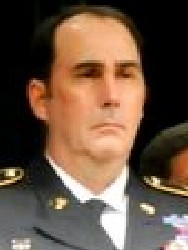

Citation:
The President of the United States of America, authorized by Act of Congress July 9, 1918 (amended by an act of July 25, 1963), takes pleasure in presenting the Silver Star to Master Sergeant Jeffrey Joseph Batson, United States Army, for gallantry in action while serving as the Team Sergeant, Special Forces Operational Detachment Alpha 3124 (ODA-3124), Special Operations Task Force-East, Vssa Nerkh, Wardak Province, Afghanistan, in support of Operation ENDURING FREEDOM from 22 to 24 October 2012. Sergeant Batson distinguished himself by extraordinary valor under accurate deadly enemy small arms and sniper fire during combat operations. Sergeant Batson's personal courage and commitment to mission accomplishment contributed to the success of Operation AMAL KARD SYGANA II. His actions are in keeping with the finest traditions of military heroism and reflect distinct credit upon himself, the Special Operations Task Force-East, the Combined Joint Special Operations Task Force-Afghanistan, Special Operations Joint Task Force-Afghanistan, the United States Forces-Afghanistan, and the United States Army. NARRATIVE TO ACCOMPANY AWARD: Master Sergeant Jeffrey Joseph Batson, United States Army, heroically distinguished himself by exceptionally valorous conduct in the face of the enemy of the United States as the Team Sergeant for Operational Detachment Alpha 3124, Special Operations Task Force-East, Village Stability Staging Area Nerkh, Afghanistan, in support of Operation ENDURING FREEDOM XIX. From 22 through 24 October 2012, Sergeant Batson was the Detachment's Senior Non-Commissioned Officer-in-Charge of a two-day operation known as Operation AMAL KARD SYGAN II, in a known enemy stronghold in the Chak Valley of Wardak Province. On the morning of 23 October 2012, Sergeant Batson directed the establishment of three blocking positions in the Monkay Village vegetated area, known as the green zone, to support clearing operations in multiple Chak Valley locations. On the morning of 23 October 2012, all three of the team's defensive positions began to receive accurate small arms fire (SAF), heavy machine gun, rocket-propelled grenade (RPG), and sniper fire. As the situation developed, insurgent positions located north and east of the American positions transitioned the majority of their firepower towards Sergeant Batson's position in the northern blocking position (NBP). Sergeant Batson fluidly maneuvered to multiple firing positions in the NBP, directing fire and rallying Afghan and American Soldiers to successfully repel the attack. During this action, Sergeant Batson continuously exposed himself to accurate fire as he bravely led the defense of NBP, drawing fire away from the detachment commander's position, allowing the commander to coordinate air-to-ground (ATG) suppressive fires through higher headquarters. During the ATG engagement, Sergeant Batson provided key observations and corrections that successfully suppressed the attack. Sergeant Batson's brave actions in this hour-long fire fight prevented the enemy from overrunning the NBP and re-taking vital terrain. The steadfastness of the American blocking positions enabled the halt of a subsequent attack launched at 1130. At 1300, the enemy re-grouped and delivered their most determined and effective attack of the day. All three blocking positions were pinned down by an unknown number of insurgents delivering effective enemy SAF, heavy machine gun, sniper, and RPG fire from the multiple fortified positions to the north, northeast, and northwest. Unable to identify the precise location of the enemy, Sergeant Batson volunteered to break from the relative safety of the NBP compound walls and led a small team with all terrain vehicles (ATV) to identify enemy firing positions and relieve pressure on the three American blocking positions. As he gained an accurate understanding of enemy disposition, Sergeant Batson attempted to flank around the enemy's western-most position. Following this movement, the detachment commander led five personnel behind Sergeant Batson's position. Shortly after this movement, both dismounted positions began receiving accurate SAF and RPG fire, escalating to the point where both elements were effectively pinned down. Despite drawing the majority of enemy fire away from American blocking positions, Sergeant Batson and his team bounded north towards deadly accurate enemy fire in an attempt to positively identify their locations in a populated green zone. After moving over 400 meters north through open terrain, void of any cover or concealment, and under constant enemy fires, Sergeant Batson was able to positively identify multiple enemy locations. He immediately passed up grid locations, allowing the detachment commander to coordinate ATG fires, which enabled the Joint Terminal Attack Controller (JTAC) to call in deadly airstrikes on the enemy positions. Sergeant Batson continuously provided decisive corrections to ATG fires, enabling accurate impacts that effectively suppressed enemy offensive actions. Following the arrival of two attack helicopters, insurgent communications (ICOM) chatter revealed orders to break contact and retreat into the green zone. From his position, Sergeant Batson confirmed at least five enemy personnel killed in action (EKIA). Sergeant Batson subsequently withdrew back to established blocking positions. At 1200 on 24 October 2012, the enemy once again regrouped and engaged all American locations from multiple areas in the green zone. Sergeant Batson led covering fire from the NBP enabling the detachment commander, JTAC, and three personnel to maneuver to an over watch position west of enemy firing positions. From his position at the NBP Sergeant Batson relayed locations of positively identified enemy personnel in the green zone and provided corrections to the JTAC during multiple deadly ATG engagement from attack aircraft and helicopters resulting in at least eight confirmed EKIA. Following the ATG engagement, Sergeant Batson moved on an ATV over to the dismounted element and provided support with his M-240 machine gun. After the ATG attacks were completed, the detachment commander received a request from higher headquarters to conduct 'boots-on-ground' battle damage assessment (BDA). With attack helicopters overhead, Sergeant Batson skillfully maneuvered 20 personnel into three positions over watching the green zone and bravely led a five-man element more than 200 feet below into the BDA location to validate the detachment's defensive actions. Immediately upon entering the green zone, Sergeant Batson's team encountered eight armed enemy combatants hiding in thick foliage. In deadly proximity, he led his team to surround and engage the disorganized and shocked enemy element, some engagements taking place within five meters of their positions. While simultaneously engaging and maneuvering on the enemy in thick foliage and through multiple compounds, Sergeant Batson provided the JTAC critical observations of enemy movement, enabling attack helicopters to prevent enemy movements into the high ground surrounding the green zone. Despite thick foliage and extremely close combat, Sergeant Batson's tactical prowess and leadership enabled his team to find, fix, and destroy the enemy in minimal time, without incurring a single casualty. His actions in combination with the three support-by-fire positions resulted in eight confirmed EKIA and the recovery of multiple enemy weapons and communications equipment. Sergeant Batson also discovered a mortar tube hidden in thick green zone foliage within accurate range of American blocking positions. He effectively related its position to the JTAC who then utilized attack helicopters to destroy the mortar position just prior to the helo's departing. Recognizing the impending loss of air coverage, the detachment commander initiated the collapse of Sergeant Batson's dismounted element out of the green zone. As soon as the helicopters departed, the entire green zone and adjacent high ground came alive with accurate SAF, heavy machine gun, and sniper fire on all friendly positions. Sergeant Batson gallantly provided covering fire, while directing his team to tactically bound away from fire. He bravely applied effective fire on multiple enemy positions, enabling all personnel on his team to bound to relative safety, until he was hit in his right leg by insurgent small arms fire. The round went through his leg, fracturing his femur and severing his femoral artery, before lodging in his left leg. After being shot, Sergeant Batson sought cover behind his ATV. He continued to return fire and maneuver until he realized how bad his bleeding was from the wounds in his legs. Two interpreters and an Infantryman moved to his position and delivered life saving first aid. Sergeant Batson continued to relay last known enemy locations as he was carried to the medical evacuation helicopter. This enabled the JTAC to deliver deadly fixed and rotary wing close-air-support on enemy positions, allowing all friendly positions to tactically bound to safety. At the completion of this two-day operation, during which enemy small arms fire engagements lasted for more than 14 combined hours, Sergeant Batson was a key factor in the destruction of five enemy vehicles, five motorcycles, one mortar system, one enemy cave system, 39 EKIA, 10 to 15 enemies wounded-in-action, and the recovery of multiple enemy weapons and equipment. Sergeant Batson personally engaged and killed five enemy combatants with his own weapon and an additional ten more through coordinated air strikes that he relayed through the JTAC. His actions are in keeping with the finest traditions of military heroism and reflect distinct credit upon himself, the Combined Joint Special Operations Task Force-Afghanistan, the Special Operations Joint Task Force-Afghanistan, the United States Forces-Afghanistan, and the United States Army.
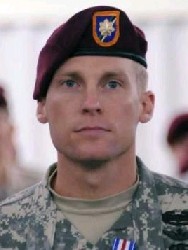

Synopsis:
The President of the United States of America, authorized by Act of Congress July 9, 1918 (amended by an act of July 25, 1963), takes pleasure in presenting the Silver Star to Major Robert K. Beale, United States Army, for conspicuous gallantry and intrepidity in connection with military operations against the enemy while serving with the 3d Battalion, 160th Special Operations Aviation Regiment (Airborne), in support of Operation ENDURING FREEDOM in Afghanistan 14 September 2011. On that date he was a member of one of two aircraft dispatched to recover a Navy explosive ordnance disposal (EOD) technician who had been badly injured by an antipersonnel IED in a very active region with a large confirmed insurgent presence. The technician was successfully recovered and, despite the loss of his leg, received life-saving medical treatment. Major Beale's gallant actions and dedicated devotion to duty, without regard for his own life, were in keeping with the highest traditions of military service and reflect great credit upon himself, his unit, and the United States Army.


Citation:
The President of the United States of America, authorized by Act of Congress July 9, 1918 (amended by an act of July 25, 1963), takes pleasure in presenting the Silver Star to Sergeant First Class William K. Beaver, United States Army, for conspicuous gallantry and intrepidity in action against the enemy while serving with a Military Transition Team, 1st Brigade, 1st Infantry Division, in action against enemy forces in support of Operation IRAQI FREEDOM, on 3 January 2008. After suffering severe wounds, Sergeant First Class Beaver not only continued to engage the enemy from an exposed position, he also coordinated efforts to aid and evacuate fellow soldiers. His actions saved the lives of not just other American soldiers but also Iraqi soldiers accompanying his patrol. His leadership skills, personal courage, and self discipline bring great credit upon him, MiTT 0511, and the United States Army. NARRATIVE TO ACCOMPANY AWARD: While conducting a combat patrol on 3 January 2008, Military Transition Team 0511 witnessed a car erratically leave the town of Sayyid Ibraham and crash into a nearby ditch. As the team's first vehicle approached the site, Major Olmsted, the team chief, dismounted vehicle 05166 with an interpreter and fired warning shots. He jumped over the ditch and through the wood line into a field on the opposite side. He was then struck by sniper fire. The driver of vehicle 05166, Captain Thompson, moved the truck to the other side of the ditch and wood line so Sergeant First Class Beaver, the M-2 gunner, had clear fields of fire on the field. Upon entering the field one of the dismounts surrendered. Sergeant First Class Beaver observed two of the fleeing dismounts raise AK-47s. He fired on them and killed them both. Sergeant First Class Beaver was then struck by sniper fire in the ear and neck. Maintaining situational awareness, he began to perform first aid on his own wounds. While performing first aid, he moved to the TC seat and sent a Troops in Contact report and MEDEVAC request on Blue Force Tracker. Sergeant First Class Beaver then observed Master Sergeant McDuffie taking fire from a sniper. The sniper fire struck Master Sergeant McDuffie's weapon disarming him and pinning him in a ditch. In spite of his blood loss--which was causing him to feel faint--and with great risk to himself, Sergeant First Class Beaver remounted the position where he had just been struck and killed the sniper firing on Master Sergeant McDuffie. Master Sergeant McDuffie remounted his vehicle, 05117, and moved towards Major Olmsted with an Iraqi Army Badger. The sniper fire continued and at least three rounds entered the Iraqi Army vehicle through the small gun ports. Throughout the engagement--and despite the severity of his own wounds--Sergeant First Class Beaver stayed in his exposed position firing suppressive fire in the vicinity of the sniper fire to allow the Iraqi Army to dismount and evacuate Major Olmsted. As the team rallied near the wrecked car they discovered that Captain Casey had been hit and was lying next to his truck on the TC side. His truck, 05115 had lost communications. Master Sergeant McDuffie was communicating to the IA to move their Badger to block the sniper fire for MEDEVAC. The crew of 05115 could not hear the plan because they had no functioning radios. Specialist First Class Beaver was increasingly light-headed from blood loss, but he continued to expose himself as he leaned out of the turret to inform the crew of 05115 of the sniper threat and to inform them of the plan to block enemy fire during the evacuation. The crew then waited for the protection of the Badger. Even after the casualties were evacuated by ground and MiTT 0511 broke contact with the enemy, Sergeant First Class Beaver continued to work at a high level and coordinated with MEDEVAC for an LZ. In sum, after suffering severe wounds at the outset of a firefight Sergeant First Class Beaver not only continued to engage the enemy, he killed a sniper who was engaging Master Sergeant McDuffie, called in the Troops in Contact Report, maintained continual suppressive fire from an exposed position, exposed himself further to direct Sergeant First Class Flores' attempts to aid Captain Casey, and even continued to function after MiTT 0511 broke contact. He did all these things while bleeding from wounds to the neck and head. Sergeant First Class Beaver's timely reporting and coordination, as well as his bravery and skill after taking fire allowed the team to quickly evacuate casualties and saved the lives of Master Sergeant McDuffie, Sergeant First Class Flores, as well as many Iraqi soldiers.
Home Town: Rapid City, Arizona


Citation:
The President of the United States of America, authorized by Act of Congress July 9, 1918 (amended by an act of July 25, 1963), takes pleasure in presenting the Silver Star to Lieutenant Colonel Christopher G. Beck, United States Army, for extreme courage and gallantry under heavy enemy fire while serving as the Task Force PHOENIX Commander (1st Brigade, 4th Infantry Division), in support of Operation Enduring Freedom from 7 May 2011 to 8 May 2011. Lieutenant Colonel Beck's exceptional leadership and command and control of coalition and Afghanistan National Security forces were the decisive factors in defeating multiple near simultaneous enemy attacks across Kandahar city. His unwavering commitment to the mission and motivation inspired coalition and Afghan national Security forces to succeed and destroy the enemy. His actions are in keeping with the finest traditions of military heroism and reflect distinct credit upon him, the 1st Special Troops Battalion, the Raider Brigade, Regional Command-South, United States Forces-Afghanistan, and the United States Army.


Synopsis:
The President of the United States takes pride in presenting the Silver Star Medal (Posthumously) to Shane Becker, Staff Sergeant, U.S. Army, for conspicuous gallantry and intrepidity in action while serving with the 1st Squadron, 40th Cavalry Regiment, 4th Brigade Combat Team, 25th Infantry Division, during combat operations in support of Operation IRAQI FREEDOM, on 3 April 2007, near Baghdad, Iraq.
Born: October 12, 1971 at Denver, Colorado
Home Town: Greeley, Colorado
Personal Awards: Silver Star (War on Terrorism), Purple Heart
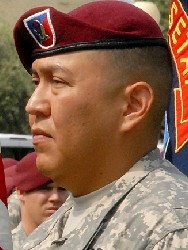

Synopsis:
The President of the United States of America, authorized by Act of Congress July 9, 1918 (amended by an act of July 25, 1963), takes pleasure in presenting the Silver Star to Staff Sergeant Conrad Begaye, United States Army, for gallantry in action while serving with Company C, 2d Battalion, 503d Parachute Infantry Regiment, 173d Airborne Brigade, in action on 9 November 2007, support of Operation ENDURING FREEDOM, near Aranas, Afghanistan. On that date, Sergeant Begaye was part of a unit that had just met with local leaders in Afghanistan's Nuristan province. They were hiking along rugged terrain when his squad, his platoon's headquarters sections and a squad of Afghan soldiers began taking fire from enemy positions above. Pinned down at first, Sergeant Begaye was struck in the arm while returning fire and directing his men. He bounded over a cliff, calling to his troops to follow him down the rocky slope to find cover. Keeping his composure against overwhelming odds, he directed and encouraged his fellow soldiers under heavy fire. One paratrooper had been shot in both legs and was still taking fire. Sergeant Begaye called out to him to play dead, knowing the enemy would shift their fire away if they thought the soldier was killed, quick thinking that likely helped to save that soldier's life. Ignoring his own injuries, Sergeant Begaye moved a wounded soldier to a nearby cave to protect him from enemy fire. Using a radio, he called his higher headquarters and directed mortar fire onto enemy positions, essentially ending the battle. Then he motivated a soldier to organize a defensive perimeter of Afghan soldiers to prevent their unit from being harassed or overrun. His gallant actions and dedicated devotion to duty, without regard for his own life, were in keeping with the highest traditions of military service and reflect great credit upon himself, his unit, and the United States Army.
Home Town: Black Canyon City, Arizona
BEHR, DILLON L.
Synopsis:
The President of the United States of America, authorized by Act of Congress July 9, 1918 (amended by an act of July 25, 1963), takes pleasure in presenting the Silver Star to Staff Sergeant Dillon L. Behr, United States Army, for exceptionally valorous conduct in the face of the enemy of the United States as Communications Sergeant, Operational Detachment Alpha 3336 (ODA-3336), 3d Special Forces Group (Airborne), Special Operations Task Force - 33, Combined Joint Special Operations Task Force - Afghanistan, in support of Operation ENDURING FREEDOM on 6 April 2008. Sergeant Behr heroically distinguished himself during a combined raid against a High Value Target while combat advising the Afghan Commandos in Shok Valley, Nuristan Province, Afghanistan. Sergeant Behr was serving as the Detachment Commander's radio operator. While he climbed a 60-foot near vertical cliff with a rucksack weighing more than 60 pounds, Insurgent forces initiated an unprecedented volume of coordinated sniper, machine gun, and Rocket Propelled Grenade fire from the surrounding high ground. Within seconds several Commandos were wounded, and an interpreter was killed. With total disregard for his own safety, Sergeant Behr held his position as bullets impacted within inches of him, even after sustaining a life-threatening wound to his leg. Sergeant Behr courageously continued to engage multiple Insurgent fighting positions despite being critically wounded a second time. Sergeant Behr's suppressive fire allowed wounded US and Afghan Soldiers to be evacuated to covered positions. Throughout the duration of the six and a half hour battle, Sergeant Behr continued to fight and kill the enemy, until he was physically incapable of holding his weapon. His absolute refusal to quit and poise under fire was a testament to his bravery, inspiring the other members of the patrol to fight on. Sergeant Behr's actions allowed US and Afghan Soldiers to move to covered positions and undoubtedly saved countless lives. His actions are in keeping with the finest traditions of military heroism and reflect distinct credit upon himself, Special Operations Task Force - 33, the Combined Joint Special Operations Task Force - Afghanistan, Special Operations Command Central, and the United States Army.
Home Town: Rock Island, Illinois
BELGARDE, TREVOR J.
Synopsis:
The President of the United States of America, authorized by Act of Congress July 9, 1918 (amended by an act of July 25, 1963), takes pleasure in presenting the Silver Star to Specialist Trevor J. Belgarde, United States Army, for conspicuous gallantry and intrepidity in connection with military operations against the enemy in support of Operation ENDURING FREEDOM in Afghanistan. His gallant actions and dedicated devotion to duty, without regard for his own life, were in keeping with the highest traditions of military service and reflect great credit upon himself, his unit, and the United States Army.
BELLOC, RAUL G.
Synopsis:
The President of the United States of America, authorized by Act of Congress July 9, 1918 (amended by an act of July 25, 1963), takes pleasure in presenting the Silver Star to Sergeant Raul G. Belloc, United States Army, for conspicuous gallantry and intrepidity in connection with military operations against the enemy while serving with Company B, 3d Battalion, 7th Infantry Regiment, 2d Brigade Combat Team, 3d Infantry Division, in support of Operation IRAQI FREEDOM in the Battle for Baghdad, Iraq, in April 2003. Sergeant Belloc's ability to maneuver his team and take pinpoint, long-range shots throughout the war demonstrated his advanced training and outstanding sniper skills. Sergeant Belloc's gallant actions and dedicated devotion to duty, without regard for his own life, were in keeping with the highest traditions of military service and reflect great credit upon himself, the 3d Infantry Division, and the United States Army.
Home Town: Arizona


Citation:
The President of the United States takes pleasure in presenting the Silver Star Medal to David Bellavia, Staff Sergeant, U.S. Army, for conspicuous gallantry and intrepidity in action while serving with Company A, Task Force 2-2, 1st Infantry Division, during combat operations in support of Operation IRAQI FREEDOM during the battle for Al Fallujah, Iraq, on 10 November 2004. Staff Sergeant Bellavia's personal bravery and selfless actions are in keeping with the highest traditions of the military service and reflect great credit upon himself, 1st Infantry Division and the United States Army.
NARRATIVE TO ACCOMPANY AWARD:
Staff Sergeant David Bellavia distinguished himself by conspicuous gallantry and intrepidity in action while serving with Company A, Task Force 2-2, 1st Infantry Division, in support of Operation IRAQI FREEDOM during the battle for Al Fallujah, Iraq, on 10 November 2004. On that date Sergeant Bellavia's platoon was ordered to clear a block of 12 buildings from which Jihadists were firing on American forces. The first nine buildings were unoccupied, but were found to be filled with enemy rockets, grenade launchers and other kinds of weapons. When Bellavia and four others entered the tenth building, they came under fire from insurgents in the house. Other soldiers came to reinforce the squad and a fierce battle at close quarters ensued. Many American soldiers were injured from the gunfire and flying debris. At this point, Sergeant Bellavia, armed with a M249 SAW gun, entered the room where the insurgents were located and sprayed the room with gunfire, forcing the Jihadists to take cover and allowing the squad to move out into the street. Jihadists on the roof began firing at the squad, forcing them to take cover in a nearby building. Sergeant Bellavia then went back to the street and called in a Bradley Fighting Vehicle to shell the houses. After this was done, he decided to re-enter the building to determine whether the enemy fighters were still active. Seeing a Jihadist loading an RPG launcher, Sergeant Bellavia gunned him down. A second Jihadist began firing as the soldier ran toward the kitchen and Bellavia fired back, wounding him in the shoulder. A third Jihadist began yelling from the second floor. Sergeant Bellavia then entered the uncleared master bedroom and emptied gunfire into all the corners, at which point the wounded insurgent entered the room, yelling and firing his weapon. Sergeant Bellavia fired back, killing the man. Sergeant Bellavia then came under fire from the insurgent upstairs and the staff sergeant returned the fire, killing the man. At that point, a Jihadist hiding in a wardrobe in a bedroom jumped out, firing wildly around the room and knocking over the wardrobe. As the man leaped over the bed he tripped and Sergeant Bellavia shot him several times, wounding but not killing him. Another insurgent was yelling from upstairs, and the wounded Jihadist escaped the bedroom and ran upstairs. Sergeant Bellavia pursued, but slipped on the blood-soaked stairs. The wounded insurgent fired at him but missed. He followed the bloody tracks up the stairs to a room to the left. Hearing the wounded insurgent inside, he threw a fragmentary grenade into the room, sending the wounded Jihadist onto the roof. The insurgent fired his weapon in all directions until he ran out of ammunition. He then started back into the bedroom, which was rapidly filling with smoke. Hearing two other insurgents screaming from the third story of the building, Sergeant Bellavia put a choke hold on the wounded insurgent to keep him from giving away their position. The wounded Jihadist then bit Sergeant Bellavia on the arm and smacked him in the face with the butt of his AK-47. In the wild scuffle that followed, Sergeant Bellavia took out his knife and slit the Jihadist's throat. Two other insurgents who were trying to come to their comrade's rescue, fired at Bellavia, but he had slipped out of the room, which was now full of smoke and fire. Without warning, another insurgent dropped from the third story to the second-story roof. Sergeant Bellavia fired at him, hitting him in the back and the legs and causing him to fall off the roof, dead. At this point, five members of 3rd Platoon entered the house and took control of the first floor. Before they would finish off the remaining Jihadists, however, they were ordered to move out of the area because close air support had been called in by a nearby unit.
Home Town: Batavia, New York
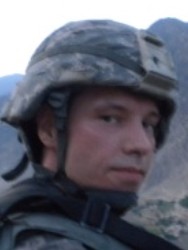

Synopsis:
The President of the United States of America, authorized by Act of Congress July 9, 1918 (amended by an act of July 25, 1963), takes pleasure in presenting the Silver Star to Private First Class Richard T. Bennett, United States Army, for gallantry in connection with military operations against an opposing armed force while serving with the 1st Battalion, 327th Infantry Regiment, 1st Brigade Combat Team, 101st Airborne Division, in support of Operation ENDURING FREEDOM in Afghanistan. Private First Class Bennett distinguished himself by valorous actions against armed and heavily fortified enemy during Operation STRONG EAGLE on 13 July 2010. Early on that morning, about 200 enemy insurgents attacked the vehicle patrol base in Wanat, Afghanistan. The Taliban surrounded the remote base and its observation post, then attacked the village and its surrounding farmland. American heavy munitions were destroyed, U.S. lines were broken and the based was invaded. Faced with enemy fire, outnumbers, and in many cases wounded, Private First Class Bennett and his fellow paratroopers fought desperately for each other, overcoming fear and willingly risking their lives to save others. Private First Class Bennett's gallant actions and dedicated devotion to duty, without regard for his own life, were in keeping with the highest traditions of military service and reflect great credit upon himself, the 101st Infantry Division, and the United States Army.
Home Town: St. Charles, Illinois


Synopsis:
The President of the United States takes pleasure in presenting the Silver Star Medal to Sean Bennett, Sergeant First Class, U.S. Army, for conspicuous gallantry and intrepidity in action while serving with the 2d Battalion, 377th Parachute Field Artillery Regiment, 4th Brigade Combat Team (Airborne), 25th Infantry Division, during combat operations in support of OPERATION IRAQI FREEDOM, on 20 January 2007, at Karbala, Iraq. Sergeant First Class Bennett was assigned to a civil affairs group training police and other provincial personnel in the Karbala area and occupied a room that functioned as a communications center and bunkhouse for four or five soldiers when the militants, dressed in American uniforms, burst into the provincial building. The militants arrived in SUVs like the ones used by private military contractors and either bluffed their way past Iraqi-manned checkpoints or had inside help from supposed coalition allies. They attempted to force their way through the door of the communications room, but Sergeant First Class Bennett pressed back. When one of the militants poked the muzzle of an AK-47 assault rifle through the small opening in the door, he grabbed it and attempted to direct its fire away from the other soldiers. A militant tossed a grenade into the room and Private First Class Johnathon Millican, either jumped or fell on the grenade, absorbing the brunt of its force. Sergeant First Class Bennett lost a chunk of his left biceps, either from rifle fire or the grenade, and suffered severe burns from the hot rifle muzzle. Yet he continued to hold back the door until the militants detonated a charge in the hallway as they fled, then he communicated what had happened to his commanders back on base and helped organize the medical evacuation of the wounded.
Home Town: Elgin, Oklahoma
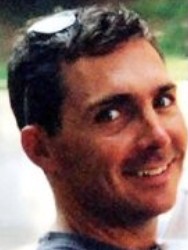

Synopsis:
The President of the United States of America, authorized by Act of Congress July 9, 1918 (amended by an act of July 25, 1963), takes pride in presenting the Silver Star (Posthumously) to Sergeant First Class William M. Bennett, United States Army, for conspicuous gallantry and intrepidity in action while serving with Operational Detachment Alpha 583 (ODA-583), 3d Battalion, 5th Special Forces Group (Airborne) in support of Operation IRAQI FREEDOM in Iraq, on 7 April 2003. Sergeant First Class Bennett's performance as a member of a two-detachment direct action force was exemplary. His selfless dedication to his fellow Soldiers served as an example for others. Sergeant First Class Bennett's willing sacrifice of his own life proved instrumental in saving the lives of his fellow warriors. Sergeant First Class Bennett's gallant actions and dedicated devotion to duty, without regard for his own life, were in keeping with the highest traditions of military service and reflect great credit upon himself, his unit, and the United States Army.
Home Town: Seymour, Tennessee
BENTON, LEROY D.
Synopsis:
The President of the United States of America, authorized by Act of Congress July 9, 1918 (amended by an act of July 25, 1963), takes pleasure in presenting the Silver Star to Captain Leroy David Benton, United States Army, for conspicuous gallantry and intrepidity in connection with military operations against an armed hostile force while serving as Commanding Officer, 3d Battalion, 7th Infantry Regiment, 2d Brigade Combat Team, 3d Infantry Division, in support of Operation IRAQI FREEDOM during the Battle for Baghdad, Iraq, in April 2003. Captain Benton's gallant actions and dedicated devotion to duty, without regard for his own life, were in keeping with the highest traditions of military service and reflect great credit upon himself, the 3d Infantry Division, and the United States Army.
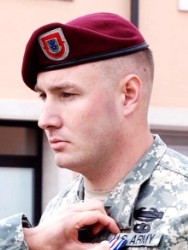

Citation:
The President of the United States of America, authorized by Act of Congress July 9, 1918 (amended by an act of July 25, 1963), takes pleasure in presenting the Silver Star to Specialist Dillon C. Bergstad, United States Army, for gallantry in connection with military operations against an opposing armed force while serving with Headquarters and Headquarters Company, 1st Battalion (Airborne), 503d Parachute Infantry Regiment, 173d Airborne Brigade Combat Team, in action against the enemy on 27 August 2007, in support of Operation ENDURING FREEDOM. Specialist Bergstad's gallant actions and dedicated devotion to duty, without regard for his own life, were in keeping with the highest traditions of military service and reflect great credit upon himself, his unit, and the United States Army. NARRATIVE TO ACCOMPANY AWARD: On 27 August 2007, Specialist Bergstad performed valorously when his mounted patrol was ambushed by a twenty to thirty man Anti-Coalition Militia (ACM) element in Zerok District, Afghanistan. The enemy was set in an "L" shaped ambush, and effectively engaged the first four trucks in the patrol with RPG's and armor piercing small arms fire. The patrol was hit at approximately 0430 Zulu, when it was moving into an over watch position to pull security for the Route Clearance Package. Specialist Bergstad was the M-2 gunner on the Company Commander's vehicle for the 2d HMMWV in the 7-truck convoy that consisted of 4 Delta Company vehicles and 3 HHC Headquarters vehicles. His vehicle was the second to receive effective enemy fire and sustained 3 direct hits from RPG's and 29 PKM, RPK, and AK-47 strikes, many of which were armor piercing rounds. With complete disregard for personal safety, Specialist Bergstad stayed in the turret and continued to fight the enemy even after being wounded by small arms fire. Specialist Bergstad was knocked out of the turret from a direct hit from an RPG to the front of the vehicle. He was again knocked out of the gunner's copula by an armor piercing incendiary round that went through his right biceps. He was thrown from the gunner's turret a third time by a direct hit from an enemy RPG. He continued to fight his way back into the turret and continued to engage the enemy helping to preserve the lives of the Soldiers in the convoy. Specialist Dillon Bergstad's combat actions killed the gunner of an enemy RPT team, while suppressing known enemy machine guns. Upon completion of the ambush Specialist Bergstad refused medical treatment until the other wounded personnel were treated. Specialist Bergstad finally allowed the medic to administer medical attention to the gun shot wound in his right arm. Specialist Bergstad did not accept pain killer for morphine. Specialist Bergstad returned to the company, ready to fight, five days after being wounded, unable to produce his medical profile. Specialist Bergstad's repeated disregard for personal safety, selfless courage, and gallantry in battle are in the finest traditions of the United States Army combat service. His actions not only saved the lives of the Paratroopers around him, but also inspired other Paratroopers by his steel confidence. Specialist Dillon Bergstad is a warrior without peer in this combat tested Task Force.
Home Town: North Bend, Oregon


The President of the United States takes pride in presenting the Silver Star Medal (Posthumously) to David R. Bernstein, First Lieutenant (Infantry), U.S. Army, for exceptionally valorous achievement while serving with Company C, 1st Battalion, 508th Parachute Infantry Regiment, 173d Airborne Brigade, 101st Airborne Division, attached to the 4th Infantry Division, on 18 October 2003, while on patrol in Qutash, Iraq, during Operation IRAQI FREEDOM. First Lieutenant Bernstein, under extreme enemy fire, risked his life in an effort to rescue one of his soldiers. Although suffering from a mortar wound, First Lieutenant Bernstein extracted the driver to safety, directed the security of his objective, and repulsed the enemy forces before succumbing to his wounds. First Lieutenant Bernstein's actions are in keeping with the finest traditions of military service and reflect distinct credit upon himself, the 4th Infantry Division, Combined Joint Task Force SEVEN, and the United States Army.
Home Town: Phoenixville, Pennsylvania
Personal Awards: Silver Star (War on Terrorism), Purple Heart


Synopsis:
The President of the United States takes pleasure in presenting the Silver Star Medal to Joshua D. Betten, Sergeant First Class, U.S. Army, for conspicuous gallantry and intrepidity in action while serving with Company A, 3d Battalion, 20th Special Forces Group (Airborne), during combat operations in support of Operation ENDURING FREEDOM, during Operation Anaconda on 5 March 2003. On that date Sergeant First Class Betten, together with Sergeant First Class Andrew Lewis, departed their fire base on the border of Afghanistan for a planned six-day, two-man sniper/observer mission, intended to provide early warning to their base and to interdict enemy infiltration. The two men prepared a night position about 1,600 meters from the base. Soon they were engaged by a large force of the enemy, moving on their position. Sergeant Lewis fired a claymore mine and set to cover their position, eliminating on attacker and then shot a second one with his pistol. Simultaneously, Sergeant Betten opened fire on other enemy soldiers, killing three of them. The team was quickly under fire from two sides and they were forced to cover each other as one reloaded and the other fired. At one point enemy soldiers were so close that Sergeant Lewis threw three grenades, finally breaking up the direct attack, though they remained under constant fire, while Sergeant Lewis was in constant communication with their base, which advised the two men that it would be 10 minutes before a relief force could arrive. When the two soldiers tried to move to a less exposed position, they came under machine gun fire from two directions. After expending all their rifle ammunition and with only their pistols, the two men slid 500 meters down a canyon cliff where they found cover while waiting for the relief force composed of other Special Forces members and Afghanistan soldiers. Once rescued, their report made it obvious that a large force was massing to attack the base. The quick and determined actions of these two soldiers gave enough advanced warning that the base was spared an attack. Both men defended not only each other, but all of the men in the base by their quick and effective actions by their bravery and quick response in the face of an overwhelming enemy assault. Sergeant First Class Betten's actions are in keeping with the finest traditions of military heroism and reflect distinct credit upon himself, this Command, and the United States Army.


Synopsis:
The President of the United States takes pleasure in presenting the Silver Star Medal to Mark Bieger, Major (Infantry), U.S. Army, for conspicuous gallantry and intrepidity in action while serving as Operations Officer of the 1st Battalion, 26th Infantry Regiment, 2d Brigade Combat Team, 1st Infantry Division, during combat operations in support of Operation IRAQI FREEDOM, on 29 December, 2004, while Commanding a convoy of six Strykers near Combat Outpost Tampa, in Iraq. Following a massive truck bomb attack that left one American dying and many others wounded, Major Bieger's Stryker was ambushed while racing to reinforce Combat Outpost Tampa when it too was attacked from ambush about a half mile from the Outpost. When several men were wounded, Major Bieger loaded up those who were critical and raced back onto the highway through the patch of still-unstable roadside bombs, traveling unescorted for four miles to a combat support hospital. The prompt and daring actions of Major Bieger saved the lives of two of his soldiers and his actions are in keeping with the finest traditions of military heroism and reflect distinct credit upon himself, this Command, and the United States Army.


Citation:
The President of the United States takes pleasure in presenting the Silver Star Medal to Matthew Binney, Staff Sergeant, U.S. Army, for conspicuous gallantry and intrepidity in action while serving as the Medical Sergeant for Special Forces Operational Detachment Alpha 765 (ODA-765), Company A, 2d Battalion, 7th Special Forces Group (Airborne), during combat operations in support of Operation ENDURING FREEDOM, at Pashmul, Kandahar, Afghanistan, on 24 June 2006. Sergeant Binney’s heroic actions, despite two serious wounds, defeated a Taliban attack, saved the lives of his comrades, and prevented the destruction of his team. His actions are in keeping with the highest traditions of military heroism and reflect distinct credit upon himself, the Combined Special Operations Task Force-Afghanistan, Special Operations Command Central, and the United States Army.
NARRATIVE TO ACCOMPANY AWARD
Staff Sergeant Matthew S. Binney, United States Army, distinguished himself by conspicuous gallantry in action as the Medical Sergeant for Special Forces Operational Detachment Alpha 765, in support of Operation ENDURING FREEDOM. On 24 June 2006, while conducting a cordon and search mission to capture or kill Taliban leadership in Panjawi District, Kandahar Province, Afghanistan, Sergeant Binney was assigned to lead a support by fire element as part of an effort to seize a compound located on key terrain adjacent to the detachment’s perimeter. His element consisted of one US Army Embedded Tactical Trainer (ETT), an interpreter, and nine Afghan Soldiers. As they moved to a position approximately 75 meters south of the objective, they came under heavy Taliban fire. Sergeant Binney maneuvered his element through enemy fire to his designated position and prepared his weapons to support the assault. The compound was quickly cleared and secured by the assault team. Immediately following the assault, an unexpectedly large Taliban Force counter-attacked with automatic fires. From his support by fire position, Sergeant Binney initiated lethal direct fires on the enemy, who were attempting to close on the target compound. Sergeant Binney’s action blunted the enemy envelopment of the element in the compound. Sergeant Binney’s small group immediately began receiving a heavy volume of accurate machinegun, rocket-propelled grenade, and small arms fires from all directions. Sergeant Binney maneuvered his element to close with and destroy an enemy automatic weapon that was placing effective fire on the beleaguered element within the compound. Continuing to maneuver his element, Sergeant Binney moved through an opening in a low mud wall and unknowingly into the midst of group of Taliban fighters. Sergeant Binney, the ETT, and the interpreter reacted with furious fire in several directions and employed hand grenades at extremely close ranges, killing many of the enemy. Groups of enemy fighters continued to approach to within 15 meters and fire directly into Sergeant Binney’s position while shouting insults and threats at the Afghan National Army Soldiers, indicating their intent to capture the group. As Sergeant Binney exposed himself to employ a grenade at a nearby group of enemy fighters, a bullet struck him in the back of the head, knocking him down, resulting in his temporary loss of vision and hearing. As he groped for his weapon and attempted to regain his bearings, two Afghan Soldiers were forced to withdraw from their support by fire position, leaving Sergeant Binney’s small element further isolated. When Sergeant Binney regained his vision, he returned to cover, refused medical attention, and rejoined the battle. In a valiant attempt to inspire the remaining defenders, he shouted words of encouragement at them and directed their fires against the determined and advancing Taliban. He then led them in an assault upon Taliban fighters who now seemed more determined to capture the isolated element. While attempting to maneuver on the flank of the approaching Taliban fighters, now as close as ten meters, the ETT was seriously injured by a rocket-propelled grenade. Sergeant Binney, ignoring his own bleeding head wound, selflessly risked his own life while immediately moving to retrieve the injured ETT. Caught in the open and completely exposed to enemy fire, he was brought down a second time by a burst of machine gun fire that destroyed his M4 carbine and shattered his left shoulder and upper arm. As he lay wounded, he continued encouraging the members of his element, and directed their fire as they became the target of an even heavier fusillade of machinegun and rocket-propelled grenade fires. Ignoring his wounds, Sergeant Binney maintained his composure, passed his radio to his interpreter, and assisted in directing a relief force to his position. When the relief force arrived to provide assistance, Sergeant Binney, despite both of his serious wounds, again refused medical assistance and resolved to walk out on his own so that all assistance could be afforded the more seriously wounded ETT. Sergeant Binney’s courageous actions and determined spirit not only prevented his small element from being overrun, captured, or destroyed, but decisively engaged and eliminated enemy forces who would have joined the assault on the beleaguered element defending the compound. His gallantry, dedication to duty, and selfless sacrifice exemplified the warrior ethos and directly contributed to the detachment seizing the initiative, denying the enemy the use of key terrain, and forcing the Taliban retreat. The heroic accomplishments of Sergeant Binney reflect great credit upon himself, the Combined Joint Special Operations Task Force-Afghanistan, Special Operations Command Central, and the United States Army.
Born: at Payson, Arizona
Home Town: Payson, Arizona
Personal Awards: Silver Star (War on Terrorism), Bronze Star, Army Commendation Medal, Purple Heart
BIRCH, ALFRED G.
Synopsis:
The President of the United States of America, authorized by Act of Congress July 9, 1918 (amended by an act of July 25, 1963), takes pleasure in presenting the Silver Star to Command Sergeant Major Alfred G. Birch, United States Army, for conspicuous gallantry and intrepidity in connection with military operations against an armed hostile force while serving in support of Operation IRAQI FREEDOM in Iraq on 31 March 2003. Throughout the battle, Command Sergeant Major Birch continuously walked in the open despite enemy fire, instilling confidence in the youngest Soldiers. He also provided advice and recommendations to operation leaders. Command Sergeant Major Birch's courage, gallantry under fire and professional competence contributed directly to the mission's success. Command Sergeant Major Birch's gallant actions and dedicated devotion to duty, without regard for his own life, were in keeping with the highest traditions of military service and reflect great credit upon himself, his unit, and the United States Army.
BITTERMAN, JASON M.
Synopsis:
The President of the United States of America, authorized by Act of Congress July 9, 1918 (amended by an act of July 25, 1963), takes pleasure in presenting the Silver Star to Sergeant First Class Jason M. Bitterman, United States Army, for conspicuous gallantry and intrepidity in connection with military operations against an armed hostile force while serving with Operational Detachment Alpha 551 (ODA-551), in support of Operation IRAQI FREEDOM in Iraq on 6 April 2004. Sergeant First Class Bitterman's heroic actions during combat operations contributed to the overwhelming success of the command's mission. Sergeant First Class Bitterman's gallant actions and dedicated devotion to duty, without regard for his own life, were in keeping with the highest traditions of military service and reflect great credit upon himself, his unit, and the United States Army.


Synopsis:
The President of the United States takes pleasure in presenting the Silver Star Medal to Raymond Bittinger, Staff Sergeant, U.S. Army, for conspicuous gallantry and intrepidity in action while serving with the 2d Battalion, 2d Infantry Regiment, 3d Brigade Combat Team (Attached to the 1st Battalion, 6th Field Artillery), 1st Infantry Division, during combat operations in support of Operation IRAQI FREEDOM at Baqubah, Iraq, on 9 April 2004, as his troops approached the small town of Behriz, Iraq. Military intelligence and a recent attack suggested insurgents were planning actions against U.S. forces in the area. Staff Sergeant Bittinger and his team found themselves in what appeared to be a ghost town: not an Iraqi in sight and no security visible. Suddenly, the men spotted movement in the palm groves; insurgents unleashed a torrent of RPG and small-arms fire. During the battle, as enemies directed their fire toward specific targets, Staff Sergeant Bittinger weaved in and out of the line of fire, protecting his comrades by drawing gunfire to his own vehicle. As they fought, Bittinger's gunner took a hit, and fell from his seat. Staff Sergeant Bittinger quickly removed his flak jacket, used it to pressure the wound, and then jumped behind the gun and kept firing. In the heat of battle, Staff Sergeant Bittinger knew that if his men stayed where they were, they'd be sitting ducks for the better-positioned insurgents. He had his driver move their Bradley between the enemy fire and the other soldiers, allowing them to move to a better tactical location. Eventually, Staff Sergeant Bittinger and his men subdued the enemies as they left the area. Later that night, 20 to 30 insurgents attacked Coalition forces in the heart of Baqubah. Staff Sergeant Bittinger rounded up a crew of volunteers and headed out to help. En route, his vehicle took out insurgents who were firing RPGs and using small arms. Before arriving at the scene, his vehicle was hit by an IED, but they continued forward. Before he reached Baqubah, Staff Sergeant Bittinger received orders to instead secure a bridge over the Diyala River. So his team took a turn and headed toward the river. On April 9th Staff Sergeant Bittinger and his soldiers killed at least 10 insurgents and wounded several others at Behriz; on their route to Baqubah, they killed five and wounded an additional four. Staff Sergeant Bittinger's actions are in keeping with the finest traditions of military heroism and reflect distinct credit upon himself, the 1st Infantry Division, and the United States Army.
Born: at Chicago, Illinois
Home Town: Chicago, Illinois
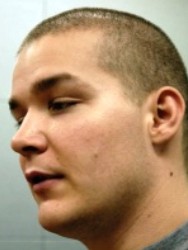

Citation:
The President of the United States of America, authorized by Act of Congress July 9, 1918 (amended by an act of July 25, 1963), takes pleasure in presenting the Silver Star to Specialist David J. Bixler, United States Army, for conspicuous gallantry and intrepidity in connection with military operations against the enemy as a member of the 1st Battalion, 320th Field Artillery Regiment, 101st Airborne Division, in support of Operation ENDURING FREEDOM in Afghanistan, on 30 September 2010. Specialist Bixler's heroic actions during combat operations in Afghanistan saved the life of an Afghan National Army Soldier partnered with his platoon. Specialist Bixler's brave action in securing a comrade in immediate danger was unwavering despite the great personal risk to himself. Specialist Bixler's gallantry, selflessness, and courage in combat is in keeping with the finest traditions of military heroism and reflects great credit upon himself, Headquarters and Headquarters Battery, Combined Task Force Top Guns, Combined Task Force Strike, USFOR-A, and the United States Army.
BLANCO, JOSE M.
Synopsis:
The President of the United States of America, authorized by Act of Congress July 9, 1918 (amended by an act of July 25, 1963), takes pleasure in presenting the Silver Star to Sergeant Jose Manuel Blanco, United States Army, for conspicuous gallantry and intrepidity in connection with military operations against an armed hostile force while serving in support of Operation Iraqi Freedom during the Battle for Baghdad in March/April 2003. Sergeant Blanco was a gunner on a Bradley Fighting Vehicle when he and his comrades came under attack. After recovering from the initial blast that had knocked him out of the turret to the bottom of the vehicle, Sergeant Blanco shook off his dizziness, treated his wounded crewmates, and moved them out of harm's way. Seeing that the turret gun had not been damaged, Sergeant Blanco crawled back into the turret, placed the gun in manual mode, and started to engage the enemy, destroying an enemy recoilless rifle team and four rocket propelled grenade teams before help arrived. Sergeant Blanco's gallant actions and dedicated devotion to duty, without regard for his own life, were in keeping with the highest traditions of military service and reflect great credit upon himself, his unit, and the United States Army.


Synopsis:
The President of the United States takes pleasure in presenting the Silver Star Medal to Matt Blaskowski, Staff Sergeant, U.S. Army, for conspicuous gallantry and intrepidity in action while serving as 3d Platoon Weapon Squad Leader for Company C, 2d Battalion (Airborne), 503rd Infantry, 173d Infantry Brigade, during combat operations in support of Operation ENDURING FREEDOM, on 3 May 2005, in Afghanistan, Staff Sergeant Blaskowski displayed undaunted gallantry and valor without regard for his own safety under heavy enemy machine gun and RPG fire for over four hours while wounded near Bulac Kalay, Afghanistan in the Arghandab Valley. Numerous times, Staff Sergeant Blaskowski placed himself at great risk while engaging the enemy positions and relaying directions to his machine gun crews. Staff Sergeant Blaskowski's unwavering valor and understanding of his mission fixed a determined enemy and prevented them from maneuvering in any direction, thereby allowing 1st Platoon to destroy 17 enemy in the orchard, breaking all resistance in the valley. Staff Sergeant Blaskowski fought with dogged determination even after he was wounded in the leg pulling a wounded solider to safety, maintaining his position for another hour until he was able to help other wounded soldiers to safety. His actions reflect great credit upon himself, CJF 76 and the United States Army.
Home Town: Cheboygan, Michigan
Personal Awards: Silver Star (War on Terrorism), Purple Heart
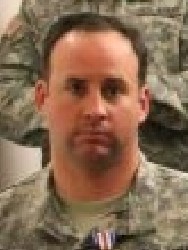

Citation:
The President of the United States of America, authorized by Act of Congress July 9, 1918 (amended by an act of July 25, 1963), takes pleasure in presenting the Silver Star to Sergeant First Class David A. Blish, United States Army, for conspicuous gallantry and intrepidity in connection with military operations against the enemy on 24 October 2012, as Senior Communications Sergeant, Special Forces Operational Detachment Alpha-3124, Special Operations Task Force-East. Nerkh, Wardak Province, Afghanistan in support of Operation ENDURING FREEDOM. Sergeant Blish distinguished himself by extraordinary valor under accurate and heavy enemy small arms and sniper fire during combat operations. Sergeant Blish's personal courage and commitment to mission accomplishment in combat greatly contributed to the success of Operation AMAL KARD SYGANA II. His actions are in keeping with the finest traditions of military heroism and reflect distinct credit upon himself, the Combined Joint Special Operations Task Force-Afghanistan, The Special Operations Joint Task Force-Afghanistan, and the United States Army. NARRATIVE TO ACCOMPANY AWARD: Sergeant First Class David A. Blish, United States Army, heroically distinguished himself by exceptionally valorous conduct in the face of the enemy of the United States as Senior Communications Sergeant, Special Forces Operational Detachment Alpha-3124, Special Operations Task Force-East, Nerkh, Wardak Province, Afghanistan in support of Operation ENDURING FREEDOM. Sergeant Blish was the Senior Communications Sergeant in charge of all radio traffic and procedures during a combat operation in eastern Afghanistan. During the mission, Sergeant Blish volunteered for multiple dangerous tactics, exposed himself numerous times to enemy fire to maintain communications, and put the mission and his teammates' well-being in front of his own. On 24 October 2012, while under heavy enemy fire, Sergeant Blish established satellite communications resulting in approval from higher to commence with air-to-ground engagements. These engagements allowed the team to decisively engage enemy personnel. After the air-to-ground attacks, Sergeant Blish volunteered to move into a known enemy safe haven in the highly vegetated low ground and conduct a battle damage assessment. Knowing the risks involved, he entered the area without hesitation. Once on the objective, his element started receiving effective enemy fire from eight enemy dismounts inside the thick green zone. Despite the immediate threat to his life, Sergeant Blish assaulted towards the enemy, personally neutralizing 3 enemy personnel at a range of 5-20 meters with his rifle. Despite this close enemy engagement, he insisted on completing the mission and pushed further into the objective area where he had no effective cover or concealment. During this operation, the enemy attempted to surround Sergeant Blish's element, but he continued to push into their known defensive positions. His actions helped recover one machine gun, one AK-47, destroy two enemy motorcycles, one mortar tube, multiple boxes of ammunition, and eliminate five insurgents. After confirming a total of 13 enemy personnel were neutralized, Sergeant Blish's element started moving out of the green zone. On the way out to link up with their team, they were ambushed from over a dozen concealed locations. During the ambush, the Team Sergeant was wounded. Sergeant Blish immediately established satellite communications and called in a medical evacuation while still being decisively engaged. After relaying the nine-line, Sergeant Blish moved the wounded teammates to a secure helicopter landing zone while constantly receiving effective enemy fire. Once at the helicopter landing zone, he exposed himself to fire once again, to mark the landing zone for the medical evacuation. As a result of his actions throughout the mission, communications were constantly maintained, over three dozen enemy fighters were neutralized, and his Team Sergeant's life was saved. His actions are in keeping with the finest traditions of military heroism and reflect distinct credit upon himself the Combined Joint Special Operations Task Force-Afghanistan, the Special Operations Joint Task Force-Afghanistan, and the United States Army.


Citation:
The President of the United States of America, authorized by Act of Congress July 9, 1918 (amended by an act of July 25, 1963), takes pleasure in presenting the Silver Star to Sergeant Rocky W. Bloom, United States Army, for valorous achievement on 14 November 2010, while serving as a team leader for 3d Platoon, Company A, 1st Battalion, 327th Infantry Regiment, 101st Airborne Division (Air Assault), in support of Operation Enduring Freedom X-XI. Sergeant Bloom demonstrated the highest standard of performance and valor, saving the lives of several Soldiers by leaving cover on multiple occasions, securing an Afghan National Army M-240B machine gun, and suppressing the enemy, preventing them from overrunning the platoon's position during an operation in the Watapur Valley, Afghanistan. His selfless actions and disregard for personal safety saved the lives of numerous Soldiers, reflecting great credit upon him, the 1st Brigade Combat Team, the 101st Airborne Division (Air Assault), and the United States Army.
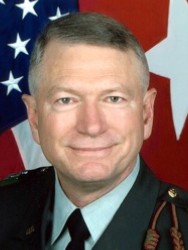

Citation:
The President of the United States of America, authorized by Act of Congress July 9, 1918 (amended by an act of July 25, 1963), takes pleasure in presenting the Silver Star to Major General Bufford C. Blount, III, United States Army, for conspicuous gallantry and intrepidity in connection with military operations against an armed hostile force as Commanding General of the 3d Infantry Division in support of Operation IRAQI FREEDOM during the Battle for Baghdad in March and April 2003. Major General Blount's heroic leadership and dedicated devotion to duty, without regard for his own life, were in keeping with the highest traditions of military service and reflect great credit upon himself, the 3d Infantry Division, and the United States Army.
Home Town: Bassfield, Mississippi
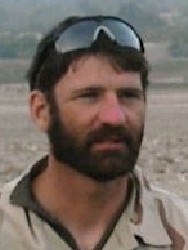

Citation:
The President of the United States of America, authorized by Act of Congress July 9, 1918 (amended by an act of July 25, 1963), takes pleasure in presenting the Silver Star to Sergeant First Class Jeffrey S. Boan, United States Army, for gallantry in action from 31 October 2006 to 11 November 2006 against an armed enemy of the United States as the Senior Medical Sergeant, Operational Detachment Alpha 376 (ODA-376), Company A, 3d Battalion, 3d Special Forces Group (Airborne), Combined Joint Special Operations Task Force-Afghanistan, Tagab Village, Kapisa, Afghanistan, in support of Operation ENDURING FREEDOM. Sergeant First Class Boan displayed unparalleled heroism without regard for his own safety in combat during multiple engagements with the enemy. Sergeant First Class Boan's actions are in keeping with the finest traditions of military service and reflect great credit upon himself, the Combined Joint Special Operations Task Force-Afghanistan, Special Operations Command Central and the United States Army. NARRATIVE TO ACCOMPANY AWARD: Sergeant First Class Jeffrey S. Boan, United States Army, heroically distinguished himself by exceptionally valorous conduct in the face of an enemy of the United States as the Senior Medical Sergeant on Special Forces Operational Detachment Alpha 376 (ODA-376), Combined Joint Special Operations Task Force-Afghanistan, in support of Operation ENDURING FREEDOM IX. During a Combined/Joint combat patrol near Tagab Village, Kapisa Province, Afghanistan, Operation AL HASN, Coalition forces conducted a raid on a compound of a known Mid-Value Tart (MVT). The ODA conducted clearing operations in compounds in the Tagab Valley believed to be harboring three High-Value Targets (HVT) and a high number of enemy fighters and insurgents. The patrol sustained multiple ambushes and indecisive contacts with the enemy over a period of six days during which Sergeant Boan repeatedly exposed himself to enemy fire. On the fourth day of operations, the patrol moved through a canalized route in the village of Tagab. Suddenly, the lead element of the Afghanistan National Army (ANA) came under intense fire from an ambush in an orchard located across a riverbed. Sergeant Boat dismounted the lead vehicle exposing himself to intense enemy small arms and machinegun fire and armed only with his M4 Carbine, to lay suppressive fire so the element could move forward across the river into the Orchard. He ran 30 meters across an open construction yard to a small shack where he single-handedly fixed the enemy and held the position until both of the ODA's Ground Mobility Vehicles (GMV) were able to move out of the canalization, maneuver into position and begin suppressing fires on the enemy positions. Sergeant Boan's fire support enabled other United States Special Forces (USSF) to continue the forward momentum into the ambush by exploiting his aggressive action. The ODA continued firing, dismounted their vehicles and employed mortar systems which broke the enemy's heavy volume of fire. Sergeant Boan's unguarded forward movement across an open area to engage the enemy from a key tactical position was the pivotal action that provided critical covering fires for mortar emplacement. Without Sergeant Boan's gallant action, the entire element would not have been able to engage the enemy with the same decisive lethality. Following the disruption of the ambush, coalition forces moved across the riverbed, defeated the ambush, and began pursuit of enemy elements fleeing the ambush site. Sergeant Boan again moved from the protection of his vehicle, exposing himself to enemy small arms fire, machine gun fire, and rocket propelled grenades (RPG), to gain a position to better engage the enemy and return fire. While firing on the enemy who were retreating in front of him, he saw hostile movement to the North and directed ANA elements to secure walls and high ground that exposed all the friendly forces remaining in the river bed. This ANA element under the command of Sergeant Boan pushed forward and ultimately drove the enemy's counter attacking element out into the riverbed where it was later engaged by air dropped munitions as they retreated North. The enemy continued to retreat from their positions, forcing the ODA to conduct three or four bounds until the detachment was able to fix the enemy fighters with overwhelming fire. During these bounds Sergeant Boan left the protection of his vehicle exposing himself to incoming enemy fire on at least four occasions in order to provide fire direction and assist the placement of ANA elements to better engage enemy forces. In an attempt to flank and destroy the remaining fleeing enemy, the patrol broke into two separate elements; a ZULU element led by the Team Sergeant and an ALPHA element led by the ODA Commander. The ZULU element, which included Sergeant Boan, moved alongside a compound to provide covering and suppressive fires for the ALPHA element. At the same time, the ZULU element attempted a link-up with three other ODAs sweeping up a river bed approximately one kilometer to the South with elements of ANA. The other ODAs were emplaced by the ZULU element in order to begin pushing the enemy forces up the valley by creating a linear forward push that spanned across the valley floor. Establishing the connection between all the moving elements was critical to ensure that the enemy could not slip through or flank the friendly elements with an attack from the rear. It was difficult to establish contact between the ZULU element and the other ODAs due to the rough terrain, multiple walls and irrigation ditches that lay between them. Sergeant Boan volunteered to move 600 meters on foot with two ANA soldiers to establish visual contact with the other ODAs. Moving through sporadic enemy gunfire, Sergeant Boan successfully pinpointed the near side of the lead ODA's ANA element, effected linkup, reported the forward trace of friendly elements, and then returned to the ZULU element. Sergeant Boan had executed the critical coordination that allowed three ODAs to conduct a sweeping action to clear the valley of Taliban forces. Following the link-up, the ZULU element was able to disengage contact with the enemy and begin movement into a position where they could better support the ALPHA element, which was again under enemy small arms fire. The ZULU element mistakenly maneuvered into a small village as it was attempting to gain a support position to assist the ALPHA element. The village terrain was a maze of tight, narrow roads with four to six foot high walls on both sides, which led deeper into the village of two and three story houses. In the village, the patrol was engaged by an ambush from the South. The ANA immediately dismounted their GMVs and attempted to return fire while moving to covered positions in nearby alleyways. As they moved towards the enemy, the ANA lost control of their element and could no longer provide effective covering fires. During the ambush, Sergeant Boan dismounted the rear of his vehicle and moved through enemy small arms, machinegun, and RPG fires to the ANA position. Sergeant Boan maintained his presence of mind under the intense enemy fire and accounted for all of the ANA while directing them back to the vehicles in order to continue the forward push out of the ambush. When some of the ANA had mounted, the convoy began moving forward but stopped after only ten meters to allow more ANA back on the vehicles. The convoy was attempting to continue movement in order to push through the ambush but had to wait for the ANA to remount their vehicles, rejoining the convoy. As the last ANA were mounting the GMVs, the patrol came under enemy fire from the North. Sergeant Boan moved forward to the lead vehicle to update the situation in the rear when enemy gunfire erupted from a third position that was behind a wall adjacent to the vehicles. Three to four enemy personnel had engaged the middle and rear of the ZULU element utilizing machine gun and small arms fire. Sergeant Boan immediately moved to the wall protecting the enemy from the lead vehicles, returned fire and dropped two fragmentation grenades over the wall, silencing the enemy fire so the ANA could finish mounting the trucks, allowing the entire column to move out of the on-going ambush. His quick thinking, decisive action, and flawless tactics saved over 30 coalition soldiers lives during a near ambush. The ZULU element continued to receive sporadic enemy small arms fire as they attempted to maneuver out of the village. Sergeant Boan rode exposed and unprotected in the rear of the GMV calling out the distance and direction of enemy personnel while returning fire up the narrow streets and alleyways. After 1,100 meters, the patrol came to a dead end. As the element reconsolidated and repositioned its personnel and vehicles to fight their way back through the kill zone, communications were reestablished with the Forward Operating Base (FOB) and close air support was requested but was not currently available. From their rear, the patrol received small arms fire from three to four enemy personnel and other enemy movement was observed attempting to flank and surround the now stationary element. The Team Sergeant made the decision to deliberately clear the route with ANA and US dismounts leading the way to ensure a higher degree of security for the vehicles through the tight village streets and alleys. The vehicles were unable to maneuver around each other so they exited the dead end in reverse order. When the movement back through the village began, Sergeant Boan moved on foot to the front of the convoy. In the confusion of turning the vehicles around, the ANA had mounted the vehicles and Sergeant Boan alone led the convoy for several hundred meters without cover until the ANA could be organized to clear the way. The greatest concern was the risk to coalition vehicles which were vulnerable to RPG fire from numerous blind alleys along the route. Dismounted personnel could more effectively clear the intricate roadways through the village. The ZULU element navigated the remaining 800 meters back out of the village and conducted a link up with the other ODA. On 4 November 2006, Sergeant Boan repeatedly demonstrated his exemplary courage by exposing himself to intense enemy fire for over ten hours, ignoring his own personal safety in favor of protecting other coalition lives and aggressively accomplishing the mission. Sergeant Boan's courage in the face of danger throughout the day saved over 140 coalition lives and took actions that led to approximately 100 enemy casualties in the defense of both Coalition Forces and the Government of Afghanistan. His actions are in keeping with the finest traditions of military heroism and reflect distinct credit upon himself, Task Force 33, the Combined Joint Special Operations Task Force-Afghanistan, Special Operations Command Central, and the United States Army.
Home Town: Southern Pines, North Carolina
BOBADILLAINIRIO, LENIN A.
Synopsis:
The President of the United States of America, authorized by Act of Congress July 9, 1918 (amended by an act of July 25, 1963), takes pleasure in presenting the Silver Star to Specialist Lenin A. Bobadillainirio, United States Army, for conspicuous gallantry and intrepidity in connection with military operations against an armed hostile force while serving in support of Operation IRAQI FREEDOM in Iraq. Specialist Bobadillainirio's gallant actions and dedicated devotion to duty, without regard for his own life, were in keeping with the highest traditions of military service and reflect great credit upon himself, his unit, and the United States Army.
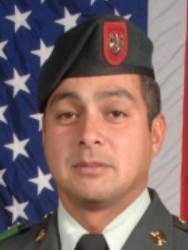

Citation:
The President of the United States of America, authorized by Act of Congress July 9, 1918 (amended by an act of July 25, 1963), takes pleasure in presenting the Silver Star to Master Sergeant Julio Lionel Bocanegra, Jr., United States Army, for exceptionally valorous achievement during Operation ENDURING FREEDOM. As the Team Sergeant for Operational Detachment Alpha 7313 in Paktika, Afghanistan, on 26 August 2008. His heroic actions during combat operations in Afghanistan were critical to his element's survival in combat against larger enemy forces. His bravery is in keeping with the finest traditions of military heroism and reflect distinct credit upon himself, this command, and the United States Army. NARRATIVE TO ACCOMPANY AWARD: Master Sergeant Julio Lionel Bocanegra, Jr., Special Forces, heroically distinguished himself by exceptionally valorous conduct in the face of the enemy of the United States as an Operations Sergeant for Operational Detachment Alpha 7313, Special Operations Task Force - 73, Combined Joint Special Operations Task Force - Afghanistan, Bagram Airfield, Afghanistan, in support of Operation ENDURING FREEDOM on 26 August 2008. Sergeant Bocanegra distinguished himself by demonstrating courage beyond the call of duty against a force three times larger than his own element. On the morning of 26 August 2008, Sergeant Bocanegra's team was in route to Orgun-E to conduct operations. During the movement to Orgun-E, Sergeant Bocanegra's convoy was ambushed. The ambush was initiated by enemy forces utilizing PKM, RPG, and Semi-Automatic fire from several elevated positions. Sergeant Bocanegra's vehicle was caught in the center of the kill zone along with an Afghan National Police Ford Ranger. The Afghan National Police Vehicle came to a stop due to the amount of fire they were receiving. An Afghan National Policeman who was driving an All Terrain Vehicle moved his bike near the Ford Ranger in order to provide more fires for the downed vehicle. Almost immediately after the ambush was initiated, the Remote Weapon System gunner in Sergeant Bocanegra's vehicle (RG-31 #3) began to shoot his weapon. The weapon was going through ammunition quickly when he gave the signal that he was going to reload the weapon system. As soon as Sergeant Bocanegra attempted to open his door to provide cover fire for the gunner, the side of the door was hit by enemy fire. Disregarding the accurate fire, Sergeant Bocanegra along with the engineer, and medical sergeants exposed themselves to provide cover fire while the weapons sergeant reloaded his weapon system. On the gunner's third reload the medical sergeant was shot in the neck. The engineer sergeant tended to the medical sergeant's wound. Sergeant Bocanegra continued to provide cover fire while the weapons sergeant reloaded his weapon. Once the weapons sergeant reloaded his weapon and returned to his vehicle, Sergeant Bocanegra jumped back into the passenger seat and called the lead vehicle to see why the convoy had not moved. Sergeant Bocanegra realized the Ford Ranger and an All Terrain Vehicle were stopped immediately to their front. Sergeant Bocanegra then told his driver (Senior Communications Sergeant) to move up as close as he could to the Ford Ranger to provide the Afghani National Policemen with cover from the rear. Once Sergeant Bocanegra's vehicle was in position behind the vehicle, Sergeant Bocanegra and his driver realized that three of the four individuals were shot and the driver of the vehicle was not going to make an attempt to retrieve his fellow policemen. Disregarding his own personal safety and exposing himself to enemy fire, Sergeant Bocanegra left his vehicle to aid the wounded. As soon as he jumped out, an RPG flew by the rear of the vehicle and hit a few meters away. Fortunately it did not explode. Sergeant Bocanegra then took cover behind the front of his vehicle and yelled at the policeman who was not shot to move while he engaged the enemy. The policeman still did not move. Sergeant Bocanegra then disregarded the enemy fire and picked up one of the wounded and placed him into the vehicle while continuing to receive effective fire. Continuing to ignore the danger to his life, Sergeant Bocanegra then picked up a second policeman with multiple gunshot wounds to both legs and placed him into the vehicle. Sergeant Bocanegra ran to the third policeman who was down near the front of the vehicle and quickly saw that he was shot in the neck and hand. Finally, the Afghan driver came to Sergeant Bocanegra's aid and together they controlled the policeman's neck and put the wounded policeman in the vehicle. Sergeant Bocanegra then motioned the driver to start driving. The Ford Ranger was able to move out of the kill zone with three flat tires. Sergeant Bocanegra was heading back to his vehicle when the second RG-31 (RG-31 #2) came to provide additional cover fire allowing for the convoy to move out. Sergeant Bocanegra lost his ability to communicate with the rest of the team because his radio had dropped its crypto while he was retrieving the wounded. As the second RG-31 was passing, Sergeant Bocanegra decided to recover the unmanned All Terrain Vehicle by following behind the second RG-31. The second RG-31 started accelerating, leaving Sergeant Bocanegra exposed to sporadic enemy fire. Sergeant Bocanegra decided to leave the All Terrain Vehicle and return to his vehicle. Once inside his vehicle, Sergeant Bocanegra instructed his driver to bypass all the other vehicles and take the lead. Sergeant Bocanegra took the convoy to a safe distance away in order to establish a Casualty Collection Point. Sergeant Bocanegra then moved his element around to secure the area and had his mortar crew get into action to provide indirect fire if need be, shortly afterwards, Close Air Support arrived and engaged the enemy. Master Sergeant Bocanegra's actions on that day directly saved the lives of four policemen and enabled the convoy to start moving out of the kill zone and to the Casualty Collection Point evacuating six wounded soldiers. His actions are in keeping with the finest traditions of military heroism and reflect distinct credit upon himself, Special Operations Task Force - 73, the Combined Joint Special Operations Task Force - Afghanistan, Special Operations Command Central, and the United States Army.
Home Town: Houston, Texas
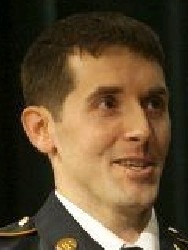

Citation:
The President of the United States of America, authorized by Act of Congress July 9, 1918 (amended by an act of July 25, 1963), takes pleasure in presenting the Silver Star to Master Sergeant Jeffrey Bochey, United States Army, for gallantry in action while serving as Operations Sergeant, Special Forces Operational Detachment Alpha 3234 (ODA-3234), Special Operations Task Force-Northeast, Kandahar Airfield, Afghanistan, in support of Operation ENDURING FREEDOM on 17 January 2014. While under withering RPG, PKM, small arms, hand grenade, 37-mm. UGL, 82-mm. mortar, and PBIED fire, Master Sergeant Bochey continually exposed himself to additional danger by leading an assault on a fortified enemy fighting position and suppressing the enemy positions with multiple weapon systems in order to ensure the safe withdrawal of his team and partner force. His actions are in keeping with the finest traditions of military heroism and reflect distinct credit upon himself, the Combined Joint Special Operations Task Force-Afghanistan, the Special Operations Joint Task Force-Afghanistan, and the United States Army. NARRATIVE TO ACCOMPANY AWARD: Master Sergeant Jeffrey Bochey, United States Army, heroically distinguished himself by exceptionally valorous conduct in the face of the enemy of the United States as Operations Sergeant, Special Forces Operational Detachment Alpha 3234, Special Operations Task Force-Northeast (SOTF-NE), Kandahar Airfield, Afghanistan, Combined Special Operations Task Force-Afghanistan (CJSOTF-A) in support of Operation ENDURING FREEDOM. On 17 January 2014, while under extremely effective insurgent small arms and PKM fire, Master Sergeant Bochey led a combined Afghan Local Police (ALP) – Operational Detachment Alpha (ODA) assault element on a fortified insurgent fighting position. Approximately four to five insurgents occupied a fighting position engaging the friendly ground force with fixing, withering fire. After Positively Identifying (PID) insurgent fighting positions, Sergeant Bochey organized a four-man assault force consisting of two U.S. soldiers and 2 ALP, established support by fire positions, and made entry into the fighting position exposing himself to enemy fire multiple times. With complete disregard for his own safety, he led his assaulting element from the front which rallied the ALP to follow, and overtook the enemy fighting positions. During the same operation, after two days of being decisively engaged by a determined enemy force with effective small arms, PKM, RPG, 37-mm. UGL, hand grenades, 82-mm. mortars, and PBIEDs, Sergeant Bochey again willingly exposed himself to extremely effective enemy fire to cover the withdrawal of the remainder of the friendly ground force. From less than 200 meters, more than 50 insurgents engaged ODA 3234 and its Afghan allies with withering fire as the element maneuvered to the relative safety of a friendly training center. During a three and a half kilometer dismounted bounding movement where the friendly element took two U.S. Wounded in Action (WIA), one USK9 WIA, and one CMRG WIA, Sergeant Bochey placed himself at personal risk to provide effective suppression fires to allow the ground force to move to safety. With the mounted element critically low on ammunition and an enemy force maneuvering with great freedom, Sergeant Bochey left the cover of his vehicle to provide these critical suppression fires, placing himself at great risk for personal harm. Firing multiple weapon systems with great accuracy, his efforts were instrumental in stopping the reinforced and determined enemy from maintaining fire superiority and causing further casualties to the ODA and its ALP partner force. Sergeant Bochey's actions are in keeping with the finest traditions of military heroism and reflect distinct credit upon himself, the Combined Joint Special Operations Task Force-Afghanistan, the Special Operations Joint Task Force-Afghanistan, and the United States Army.
BOERRIGTER, SEAN M.
Synopsis:
The President of the United States of America, authorized by Act of Congress July 9, 1918 (amended by an act of July 25, 1963), takes pleasure in presenting the Silver Star to Sergeant Sean M. Boerrigter, United States Army, for conspicuous gallantry and intrepidity in action against the enemy while serving as a Squad Leader with Troop H, 1st Squadron, 73d Cavalry Regiment, 2d Brigade Combat Team, 82d Airborne Division, in action in support of Operation IRAQI FREEDOM in Iraq, in March 2007. After Sergeant Boerrigter's platoon found a large weapons cache along the Tigris River, the Platoon Leader left him and a three-man element behind to provide overwatch on the cache. The rest of the platoon headed back to the patrol base to wait for Explosive Ordnance Disposal to arrive so that the cache could safely be destroyed. While guarding the cache, Sergeant Boerrigter heard a grenade being armed, and then observed it landing a few feet from him before bouncing and coming to rest in the center of the group of soldiers. Before the grenade could detonate, Sergeant Boerrigter grabbed it, threw it into his fighting position and attempted to roll out. Although wounded in the subsequent blast, Sergeant Boerrigter remained calm to report to his platoon leader what was happening. As the battle raged, his squad came under heavy machine gun fire from both sides of the river. After an hour and a half, with assistance from aviation and mortar support, his squad was able to withdraw to the patrol base, at which time Sergeant Boerrigter was evacuated for treatment. Sergeant Boerrigter's gallant actions and dedicated devotion to duty, without regard for his own life, were in keeping with the highest traditions of military service and reflect great credit upon himself, the 82d Airborne Division, and the United States Army.
Home Town: Dacula, Georgia
BOETTCHER, JESSE D.
Citation:
The President of the United States of America, authorized by Act of Congress July 9, 1918 (amended by an act of July 25, 1963), takes pleasure in presenting the Silver Star to Master Sergeant Jesse D. Boettcher, United States Army, for gallantry in action on 17 June 2005 during combat operations against an armed enemy while serving as an Assault Team member, United States Special Operations Command. During an assault against terrorist combatants, Master Sergeant Boettcher displayed a degree of valor, clear and sound judgment, and superb mission focus while under enemy fire. His exceptional leadership combined with his courage in the face of danger, were major factors in his element's mission success. Master Sergeant Boettcher's distinctive accomplishments are in keeping with the finest traditions of military service and reflect great credit upon himself, the Command, and the United States Army.
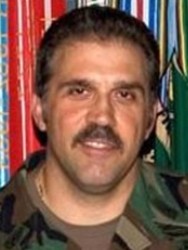

Synopsis:
The President of the United States of America, authorized by Act of Congress July 9, 1918 (amended by an act of July 25, 1963), takes pleasure in presenting the Silver Star to Sergeant Major Lawrence Theodore Boivin, United States Army, for conspicuous gallantry and intrepidity in connection with military operations against the enemy while serving with the U.S. Special Operations Command in support of Operation IRAQI FREEDOM on 26 April 2004. While providing training and support to a small Marine contingency, Sergeant Major Boivin's unit was attacked from several locations by a large massing enemy force. During the first minutes of the attack, 50 percent of the Marine forces were incapacitated. During the initial attack, RPG rounds were impacting all around him and he was hit by shrapnel from an RPG round in close proximity to his location. During the attack he withstood several penetrating wounds to the left side of his head, legs and buttock. After regaining composure, he fought back with the remaining Marines until wounded again by a fragmentation grenade. Later, with a comrade, he provided covering support to allow the Marines to evacuate the wounded. Once all of the wounded Marines were safe or moving back to a safe location, Sergeant Major Boivin and his teammate bounded back toward the Marine Forward Operating Base (FOB) while continuing to provide covering fire for our Marines until the rest made it back to safety. Sergeant Major Boivin's gallant actions and dedicated devotion to duty, without regard for his own life, were in keeping with the highest traditions of military service and reflect great credit upon himself, this Command, and the United States Army.
Home Town: Stratford, New Hampshire
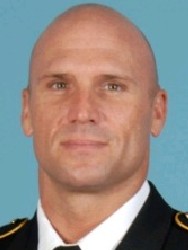

Citation:
The President of the United States of America, authorized by Act of Congress July 9, 1918 (amended by an act of July 25, 1963), takes pleasure in presenting the Silver Star to Sergeant First Class Colin M. Boley, United States Army, for conspicuous gallantry and intrepidity in connection with military operations against an armed hostile force while serving as a Platoon Sergeant with the 75th Ranger Regiment in support of Operation IRAQI FREEDOM in Iraq, on 1 October 2005. On this date, Sergeant First Class Boley courageously led his platoon during a company assault on an insurgent stronghold, defeating numerous enemy fighters while under a heavy attack from direct fire and grenades. His sound judgment, leadership, and aggressive spirit saved friendly lives while eliminating the enemy threat to the Company. Through his distinctive accomplishments, Sergeant First Class Boley reflected great credit upon himself, this Command, and the United States Army.
Home Town: Moon, Pennsylvania


Synopsis:
The President of the United States takes pride in presenting the Silver Star Medal (Posthumously) to John G. Borbonus, Private First Class, U.S. Army, for conspicuous gallantry and intrepidity in action while serving with Headquarters and Headquarters Company, 1st Squadron, 40th Cavalry Regiment, 4th Brigade Combat Team, 25th Infantry Division, during combat operations in support of Operation IRAQI FREEDOM, on 12 April 2007, in Iraq. On that date, an insurgent suicide truck bomber attempted to drive his explosive-laden vehicle into Private First Class Borbonus' control base. There were 20 soldiers within the base and the truck bomb was made with 500 to 600 pounds of homemade explosives. Manning his machine gun and without regard for his own personal safety, Private First Class Borbonus' steady stream of fire diverted the vehicle before it detonated in an explosion that destroyed three buildings and killed him instantly. Although the truck bomb breached the perimeter, Private First Class Borbonus' self-sacrificing actions averted a much large loss of life.
Home Town: Boise, Idaho
Personal Awards: Silver Star (War on Terrorism), Purple Heart
BORS, DANIEL J.
Synopsis:
The President of the United States of America, authorized by Act of Congress July 9, 1918 (amended by an act of July 25, 1963), takes pleasure in presenting the Silver Star to Sergeant First Class Daniel J. Bors, United States Army, for conspicuous gallantry and intrepidity in connection with military operations against an armed hostile force while serving in support of Operation ENDURING FREEDOM in Afghanistan. His gallant actions and dedicated devotion to duty, without regard for his own life, were in keeping with the highest traditions of military service and reflect great credit upon himself, his unit, and the United States Army.
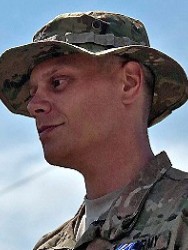

Citation:
The President of the United States of America, authorized by Act of Congress July 9, 1918 (amended by an act of July 25, 1963), takes pleasure in presenting the Silver Star to Sergeant Joshua L. Bostic, United States Army, for conspicuous gallantry and intrepidity in action while serving with Company C, 2d Battalion, 327th Infantry Regiment, 1st Brigade Combat Team, 101st Airborne Division during Operation STRONG EAGLE III in support of Operation ENDURING FREEDOM in Afghanistan on 29 March 2011. Sergeant Bostic's actions are in keeping with the finest traditions of military service and is a testament to his devotion to duty. His steadfast leadership, selfless service, and fierce determination contributed greatly to the success of the mission. His actions reflect great credit upon himself, the 2-327th Infantry Regiment, the 1st Brigade Combat Team, the 101st Airborne Division (Air Assault), and the United States Army. NARRATIVE TO ACCOMPANY AWARD: Sergeant Joshua Bostic distinguished himself by heroic achievement to the United States as a Squad Leader, Task Force NO SLACK, Kunar Valley, Afghanistan during Operation STRONG EAGLE III on 29 March 2011. He exhibited outstanding decision making and bravery during the air assault operation into the remote and extremely hostile Ganigal Valley. His sound judgment and selfless service would become overwhelmingly apparent through numerous firefights on OBJ LEXINGTON. After the Air Assault into HLZ BEE EATER, 3d Platoon elements began their harsh movement to the southern ridgeline and planned support by fire position. When the platoon halted to assess their route, fifteen enemy personnel ambushed the lead element which resulted in three casualties including a squad leader and team leader. Sergeant Bostic, knowing that he was outnumbered 3 to 1, led his squad through PKM, RPG, and AK-47 fire to move into the kill zone where they provided security for the medical evacuation of the casualties. Once the medical evacuation was complete, Sergeant Bostic's squad became the lead element for the platoon. During the clearance of the objective, approximately 150 enemy fighters initiated a complex attack on the Company's position. When the contact began, Sergeant Bostic completely exposed himself to enemy direct fire in order to direct his squad to establish covering fire for the rest of the platoon. Extremely effective fire was initiated by the overwhelming enemy force by AK-47, RPK, and PKM machine guns from the southern ridgeline. Sergeant Bostic immediately moved his squad's position under intense enemy fire to provide much needed suppression along the southern ridgeline. Only second after contact started, multiple enemy positions began to fire from the North, North-East, and immediate West of Sergeant Bostic's location. With the platoon nearly surrounded, and poor weather conditions mitigated air support, Sergeant Bostic and 3d Platoon were on their own. Sergeant Bostic had to rely completely on organic weapons systems to defend against the enemy attack. Sergeant Bostic's position was pinned down and very exposed as he continued to give fire commands, provide suppressive fire, and relay effective communication to higher. His actions at that critical moment in the battle allowed the company commander to gain situational awareness needed for decision making. Without regard to his own self preservation, Sergeant Bostic instructed his rear team to move to a rock building approximately 100 meters and two terraces up from his location, and directed his lead element to provide suppressive fire. Sergeant Bostic and two other members of his team were now left completely exposed, alone, cut off from the rest of the company and under concentrated enemy fire. The terrain between his element and the rest of the platoon made it impossible to visually locate Sergeant Bostic, let alone provide accurate support for any movement. Sergeant Bostic could not move from his location due to the concentration of fire and when he was wounded in the upper rear of his right leg, he was forced to low crawl to cover. At this time one of Sergeant Bostic's men, PV2 Faulkner, was also shot through the arm and into the chest. Despite being wounded, Sergeant Bostic moved under intense and deadly fire to get PV2 Faulkner and provide initial first aid. Once a the casualty, Sergeant Bostic was pinned down behind the rock wall by enemy fire, but remained focused on providing first aid to PV2 Faulkner. Due to the intense enemy fire, the first aid and litter team attempt did not make it to Sergeant Bostic's position. He then reported PV2 Faulkner has passed as a result of his wounds. While under direct enemy fire Sergeant Bostic made the heartbreaking call to bound his remaining men back and up the terraces and consolidate with the rest of Cougar Company elements. Once the Air Weapons Team returned, a recovery party was formed and Sergeant Bostic immediately volunteered to put the safety of others above his own and lead the element under direct enemy fire to successfully recover PV2 Faulkner. Sergeant Bostic's actions exhibit the epitome of valor in the most extreme combat situations and reflect distinct credit upon himself, the 2-327th Infantry Regiment (NO SLACK), 1st Brigade Combat Team (BASTOGNE), 101st Airborne Division (AIR ASSAULT) and the United States Army.
Home Town: Spring City, Tennessee
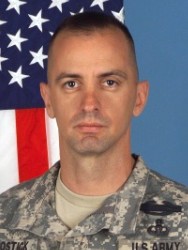

Citation:
The President of the United States of America, authorized by Act of Congress July 9, 1918, takes pride in presenting the Distinguished Service Cross (Posthumously) to Major (Infantry) Thomas Gordon Bostick, United States Army, for extraordinary heroism while engaged in an action against an enemy of the United States while serving as the Commanding Officer of Troop B, 1st Squadron, 91st Cavalry Regiment, 173d Airborne Brigade, on 27 July 2007 in Afghanistan. When he was advised by friendly foreign forces that an enemy element was approaching his position, Major Bostic rapidly employed mortar fire and close air support on the approaching enemy to suppress them. While directing fire, his position came under enemy small arms fire, nevertheless, he continued to direct fire until the enemy was defeated. When the immediate threat was neutralized, Major Bostic maneuvered his quick reaction force to a forward position to retrieve three casualties. After a lull in the battle, the enemy reinforced their attack and engaged Major Bostick and the forward elements from three sides. Once again, he employed direct and indirect fire on the enemy positions and enabled the lead element to begin to move to more defensible positions. As the fire on his position intensified, Major Bostick positioned himself between the enemy and his own exposed Soldiers who were navigating the mountainous terrain and engaged the enemy with accurate fire. While in this exposed position and under continuous small arms and rocket propelled grenade fire, he was mortally wounded. Major Bostick's selfless actions ensured his Soldiers had sufficient time to retreat through the hazardous terrain in order to seek cover and survive the attack. Major Bostick's actions are in keeping with the highest traditions of the military service and reflect great credit upon himself, the 91st Cavalry Regiment, and the United States Army.
Home Town: Llano, Texas
BOWMAN, ZACHARY L.
Synopsis:
The President of the United States of America, authorized by Act of Congress July 9, 1918 (amended by an act of July 25, 1963), takes pleasure in presenting the Silver Star to Master Sergeant Zachary L. Bowman, United States Army, for conspicuous gallantry and intrepidity in action against the enemy in support of Operation Freedom's Sentinel. His gallant actions and dedicated devotion to duty, without regard for his own life, were in keeping with the highest traditions of military service and reflect great credit upon himself, his unit, and the United States Army.


Synopsis:
The President of the United States of America, authorized by Act of Congress July 9, 1918 (amended by an act of July 25, 1963), takes pride in presenting the Silver Star (Posthumously) to Sergeant Joshua M. Boyd, United States Army, for conspicuous gallantry and intrepidity in connection with military operations against an armed hostile force while serving with the 2n, 505th Parachute Infantry Regiment, 3d Brigade Combat Team, 82d Airborne Division, in support of Operation IRAQI FREEDOM in Iraq, on 5 March 2007. While on combat patrol operations during Specialist Boyd's instinctive actions and personal courage undoubtedly prevented a future attack on Coalition Forces, ISF or innocent civilians at the cost of his own grievous injuries. Sergeant Boyd's gallant actions and dedicated devotion to duty, at the cost of his own life, were in keeping with the highest traditions of military service and reflect great credit upon himself, the 82d Airborne Division, and the United States Army.
Home Town: Seattle, Washington
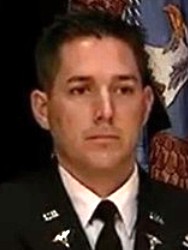

Citation:
The President of the United States of America, authorized by Act of Congress July 9, 1918 (amended by an act of July 25, 1963), takes pleasure in presenting the Silver Star to First Lieutenant Tom Bozzay, United States Army, for gallantry in action on 17 December 2009, while assigned as a Physicians Assistant attached to Operational Detachment-Alpha 2214, Special Operations Task Force-2092, Baghram Airfield in support of Operation ENDURING FREEDOM. While under attack from a large enemy force, First Lieutenant Bozzay distinguished himself by moving 200 meters under fire to the locations where five members of the unit were seriously injured, to render medical care. With complete disregard for his own personal safety, First Lieutenant Bozzay assessed and began to treat the wounded, systematically moving them one by one to positions of greater safety while the battle ensued around them. He repeatedly used his body to shield wounded comrades from incoming mortar and machine gun fire. His quick thinking and selfless actions ensured that all of the injured unit members survived. First Lieutenant Bozzay's actions contributed to saving the lives of his injured teammates. First Lieutenant Bozzay's actions are in keeping with the finest traditions of military service and reflect great credit upon himself, Special Operations Command Central and the United States Army.


Citation:
The President of the United States of America, authorized by Act of Congress July 9, 1918 (amended by an act of July 25, 1963), takes pleasure in presenting the Silver Star to Sergeant First Class Clayton James Brachtenbach, United States Army, for gallantry in action while serving as Senior Communications Sergeant, Special Forces Operational Detachment Alpha 3234 (ODA-3234), Special Operations Task Force-Northeast, Bagram Airfield, Afghanistan, in support of Operation ENDURING FREEDOM on 17 January 2014. Under withering RPG, PKY, 37-mm. UGL and small arms fire, Sergeant First Class Brachtenbach continually exposed himself to additional danger in order to suppress enemy positions with his assigned weapon, killing multiple enemy and inspiring ALP to continue moving forward. His actions are in keeping with the finest traditions of military heroism and reflect distinct credit upon himself, the Combined Joint Special Operations Task Force-Afghanistan, the Special Operations Joint Task Force-Afghanistan, and the United States Army. NARRATIVE TO ACCOMPANY AWARD: Sergeant First Class Clayton James Brachtenbach, United States Army, heroically distinguished himself by exceptionally valorous conduct in the face of the enemy of the United States as the Senior Special Forces Communications Sergeant, Special Forces Operational Detachment Alpha 3234, Special Operations Task Force-Northeast, Bagram Airfield, Afghanistan, Combined Joint Special Operations Task Force-Afghanistan in support of Operation ENDURING FREEDOM. On 17 January 2014, Sergeant First Class Brachtenbach was part of a ground force conducting an area reconnaissance of the Afghaniya Valley, Nejrab District, Kapisa Province, Afghanistan. While part of a dismounted force consisting of four Americans and three Afghans clearing through a riverbed in support of the mounted element moving along the road, the element was engaged by enemy positions from an adjacent village as close as 20 meters. Sergeant Brachtenbach fired and maneuvered multiple times exposing himself to enemy positions as the other dismount element advanced on the enemy. Sergeant Brachtenbach maneuvered the dismounted element into the enemy fighting position cluster, cleared through, and neutralized the enemy. The dismounted element then continued movement east along the riverbed, receiving harassing fire for the duration of the movement. While decisively engaged and pinned down by two enemy positions to the northeast and southwest, Sergeant Brachtenbach crawled into a position in order to engage three enemies, killing two and wounding the third. Those actions allowed for the remainder of the dismount element to engage the enemy positions to the northeast, suppressing the enemy and continuing movement. Just south of the Jarr village, Sergeant Brachtenbach and the dismounted element again were engaged by heavy volumes of effective enemy fire. Sergeant Brachtenbach, with complete disregard for his own personal safety, intentionally exposed himself to enemy fire in order to lay down a base of suppressive fire that allowed the rest of the element to reach cover. While pinned down in a small ditch, Sergeant Brachtenbach low-crawled 50 meters while intense 37-mm. UGL fire exploded within seven meters of his position in order to reach a position of advantage. Sergeant Brachtenbach occupied a position on a rooftop, providing suppressive fires on enemy positions, resulting in two enemies killed in action (EKIA), and allowing follow-on dismounted forces to continue engaging the enemy. Sergeant Brachtenbach then moved with the dismounted element north across the riverbed to a security position just southeast of Jarr village where he was once again engaged by intense and highly accurate SAF, PKM, and 37-mm. UGL fire. Once again, Sergeant Brachtenbach low-crawled down a small ditch until he reached a position of advantage in order to lay down suppressive fire for the rest of the element to maneuver. Sergeant First Class Brachtenbach's actions are in keeping with the finest traditions of military heroism and reflect distinct credit upon himself, the Combined Joint Special Operations Task Force-Afghanistan, the Special Operations Joint Task Force-Afghanistan, and the United States Army.
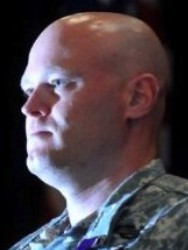

Citation:
The President of the United States of America, authorized by Act of Congress July 9, 1918 (amended by an act of July 25, 1963), takes pleasure in presenting the Silver Star to Sergeant First Class Chad E. Brack, United States Army, for gallantry in action while serving as the Senior Engineer Sergeant, Special Forces Operational Detachment Alpha 3322 (ODA-3322), Special Operations Task Force-East, Bagram Airfield, 1 to 3 May 2011 in support of Operation ENDURING FREEDOM. Sergeant First Class Brack distinguished himself through gallantry and intrepidity by selflessly exposing himself to extremely effective machine gun and sniper fire in order to engage highly trained foreign fighters, provide suppressive fire for friendly maneuver, conduct effective counter sniper operations, and prevent friendly forces from being overrun. His heroic leadership and bravery under fire inspired a demoralized commando element to continue mission and saved the lives of Coalition Forces. His action are in keeping with the finest traditions of military heroism and reflect distinct credit upon himself, the Combined Joint Special Operations Task Force-Afghanistan, the Combined Forces Special Operations Component Command-Afghanistan, and the United States Army. NARRATIVE TO ACCOMPANY AWARD: Sergeant First Class Chad E. Brack heroically distinguished himself by exceptionally valorous conduct in the face of the enemy of the United States as the Senior Engineer Sergeant, Special Forces Operational Detachment Alpha 3322 (ODA-3322), Special Operations Task Force-East, Bagram Airfield in support of Operation ENDURING FREEDOM. Over the period of 1 – 3 May 2011, ODA-3322 and their partnered force, 1st Company, 2d Commando Kandak, conducted clearance operations in Awlagal and Chapo villages, Barge-e Matal District, Nuristan Province. The extremely rugged terrain of the Darrah Katigal Valley, including sheer cliffs on three sides and an impassable river to the West, allowed enemy fighters to utilize fortified fighting positions in the high ground to completely surround and pin down friendly positions. From Sun-up to Sun-down, insurgents attacked with extremely accurate direct and indirect fire while attempting to maneuver on friendly elements. Early in the morning, the northernmost position received highly accurate and sustained mortar fire. Without regard for personal safety, Sergeant Brack maneuvered into open ground to provide covering fire for the element's movement. He immediately suppressed two enemy sniper positions with his MK13 Sniper Weapons System as his comrades initiated movement. His selfless act shifted enemy machine gun fire to Sergeant Brack's location, saving the lives of the exposed personnel maneuvering in the low ground. Sergeant Brack remained steadfast and adjusted fire on insurgent machine gun positions as enemy rounds littered the ground around him. Despite facing heavier weapons, Sergeant Brack continued engaging enemy fighters even though his partnered Commandos were unable to aid in the suppression. Due to Sergeant Brack's actions, the entire element reached cover and concealment without suffering any casualties. Approximately one hour later, friendly elements were attacked with accurate and coordinated barrages from all directions. Intercepted communications indicated an insurgent Command and Control (C2) node within a compound on the high ground west of the village. Unable to positively identify the enemy position, Sergeant Brack knowingly moved to a location that afforded neither cover nor concealment in order to confirm enemy movement. Under effective machine gun fire, Sergeant Brack engaged insurgent fighters with his sniper rifle in the vicinity of the C2 node. This greatly demoralized the enemy forces and caused a short lull in fire as the insurgents reconsolidated. Commandos, led by two USSF soldiers, maneuvered to retrieve a Commando WIA when again they came under effective fire. Sergeant Brack took critical initiative and provided suppressing fire on insurgent machine gunners with his M4. While drawing enemy automatic fire from the high ground, Sergeant Brack remained calm and engaged enemy positions until the WIA was safely moved to the Casualty Collection Point. Later, elements in the east received sustained and effective sniper fire from the West. Sergeant Brack moved through precision direct fire and identified the insurgent's position. He immediately suppressed the effective sniper while relaying information for aerial engagement. Sergeant Brack provided counter sniper fire to prevent enemy contact until Apache Gun Ships eliminated the threat. Sergeant Brack's precision fire denied the enemy the ability to engage friendly positions and his accurate description of the hide allowed aerial assets to effectively destroy it. At approximately 1800D the battle reached its climax as the enemy massed to the east and advanced toward friendly positions while unleashing overwhelming firepower against the perimeter security elements. Insurgent snipers targeted explosive materials that had been left on a rooftop during the clearance operations the previous night. Sergeant Brack selflessly maneuvered onto the exposed rooftop, placed himself in the direct line of enemy fire, and removed the volatile bomb-making material to prevent additional casualties. If detonated, the explosives could have caused massive injury or death to friendly forces. Shortly thereafter, the enemy closed to within 25 meters of Sergeant First Class Davis' position on the eastern flank. While exposed and receiving accurate direct fire, Sergeant Brack courageously returned to the same open roof top and provided suppression for friendly maneuver. Commandos fled the building, but Sergeant Davis and his interpreter were unable to egress as heavy machine gun fire penetrated the walls of the structure. Realizing that Sergeant Davis was still in the besieged building, Sergeant Brack held his ground and continued to suppress with his M4 even after insurgents shifted fire onto his location. Sergeant Brack maintained a position in the open, with rounds impacting inches from his person, and engaged fighters moving in the tree line surrounding Sergeant Davis. Aerial assets released two 500-pound bombs onto advancing insurgents which allowed Sergeant Davis and his interpreter the ability to maneuver. The blast nearly knocked Sergeant Brack off of his feet, yet he continued to engage enemy personnel until Sergeant Davis reached the safety of cover. Sergeant Brack's suppressive fire directly denied enemy fighters the ability to overrun friendly elements. As dazed insurgents began to regroup, Sergeant Brack rallied a small team of Commandos to assist in a flanking effort underway. He led them over 200 meters up hill, into the rugged high ground, with no cover and very little concealment. When enemy fighters engaged Sergeant Brack and his Commando partners with accurate volleys of machine gun and sniper fire, he directed the team into defensive positions. Sergeant Brack pushed forward, linked-up with the Team Sergeant, and engaged insurgents, killing two. Upon nightfall, Sergeant Brack and Master Sergeant Martin engaged multiple enemy personnel and killed more insurgents identified by aircraft overhead. Ultimately thwarting the attempt to break friendly lines, they repelled the enemy advance and allowed friendly forces to reconsolidate and reorganize. Sergeant Brack's element prepared to move to the village of Chapo, but intelligence indicated that insurgents were planning ambushed along the route. With Commandos hesitant to move, Sergeant Brack led from the front and cleared the entire western trail, remaining 50 meters forward of his element. His bravery instilled confidence in his partnered force and resulted in the aggressive clearance of Chapo before daybreak. Sergeant Brack's heroics during 40 hours of sustained combat denied the enemy freedom of movement and prevented friendly forces from being overrun. Sergeant Brack's selfless leadership and courage under fire saved the lives of multiple Coalition Forces. His actions are in keeping with the finest traditions of military heroism and reflect great credit upon himself, the Combined Joint Special Operations Task Force-Afghanistan, the Combined Forces Special Operations Component Command-Afghanistan, and the United States Army.


Citation:
The President of the United States of America, authorized by Act of Congress July 9, 1918 (amended by an act of July 25, 1963), takes pleasure in presenting the Silver Star to Lieutenant Colonel James H. Bradley, Jr., United States Army, for conspicuous gallantry and intrepidity in action against the enemy while Commanding the 3d Assault Helicopter Battalion, 1st Aviation Regiment, 1st Infantry Division, in action against enemy forces in support of Operation IRAQI FREEDOM on 16 January 2008. Lieutenant Colonel Bradley distinguished himself while conducting an air assault and insertion of an Aerial Reaction Force from Charlie Troop, 1st Squadron 32d Cavalry, 101st Airborne Division (Air Assault). After infiltration, ground troops became decisively engaged and began taking casualties from enemy fire. Colonel Bradley assessed the severity of the situation and realized the supporting Apache gunships could not engage with friendly forces in such close proximity to the enemy. He immediately took charge of the situation and directed an all out assault of the insurgent position with his Black Hawk team to allow the reaction force to withdraw. Lieutenant Colonel Bradley began a series of low, sweeping passes to identify both enemy and friendly positions in an attempt to clarify the increasingly chaotic situation, while other pilots made four gun runs at extremely close range while his door gunners poured a heavy volume of effective machine gun fire into the enemy. As the fight progressed, Lieutenant Colonel Bradley leapt into the close fight, again pouring machine gun fire into the enemy position. He and his crew made three deliberately slow passes under withering direct fire, expending all his ammunition and killing or injuring most of the enemy in their ambush position. They remained over the besieged troops and continued to expose his aircraft, even though his door gunners where out of ammunition, in order to draw enemy fire away from the reaction force Soldiers. Because of their concentrated fire at close range and continuous low, slow passes to draw enemy fire, the reaction force was able to finally withdraw their Soldiers out of the kill zone to a pick-up point for extraction and CASEVAC (casualty evacuation). Lieutenant Colonel Bradley's gallant actions and dedicated devotion to duty, without regard for his own life, were in keeping with the highest traditions of military service and reflect great credit upon himself, his unit, and the United States Army.
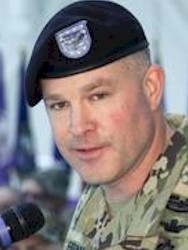

Synopsis:
The President of the United States of America, authorized by Act of Congress July 9, 1918 (amended by an act of July 25, 1963), takes pleasure in presenting the Silver Star to Lieutenant Colonel Matthew W. Braman, United States Army, for conspicuous gallantry and intrepidity in action against the enemy in support of Operation ENDURING FREEDOM in Afghanistan. His gallant actions and dedicated devotion to duty, without regard for his own life, were in keeping with the highest traditions of military service and reflect great credit upon himself, his unit, and the United States Army.


Synopsis:
The President of the United States takes pleasure in presenting the Silver Star Medal to Joshua Brandon, Captain, U.S. Army, for conspicuous gallantry and intrepidity in action while serving as the Military Transition Team Intelligence Officer for the 4th Battalion, 320th Field Artillery Regiment, 4th Brigade Combat Team, 101st Infantry Division, during combat operations in support of Operation IRAQI FREEDOM on 20 and 21 August 2006, in Adhamiyah, Iraq. On that date, the radio operator received a call from one of the Iraqi army company commanders who said, "I have 15 soldiers on the ground and I need you here or I'm dead." The MiTT team mounted up with 18 U.S. Soldiers and additional Iraqi army troops and moved to the location. When they arrived, the small group of Iraqi army soldiers with armored vehicles, together with a few Iraqi policemen and several uniformed members of Jaish Al-Mahdi, the military wing of Muqtada al-Sadr's militia, were hunkered down on a bridge near the Army canal under intense small-arms and machine-gun fire. With small-arms fire crackling around them and explosions from rocket-propelled grenades at about 100 meters away, Captain Brandon crossed the danger zone twice to rally Iraqi army soldiers who had little ammunition left. The MiTT turned the marchers back to a safer route; Captain Brandon led a flanking maneuver with Major Rick Ullian, 4-320th FAR executive officer, by crossing to suppress the machine-gun fire, while Captain Ben Shaha, commander of the MiTT, led a group who stepped in front of the marchers to shield them on the bridge. The next day, Captain Brandon and the MiTT platoon linked up with Iraqi army forces at Antar Square, which surrounds the Abu Hanifa Mosque, a revered Sunni place of worship. Iraqi army checkpoints had come under attack by numerous Sunni fighters. An Iraqi army platoon was pinned down under heavy fire and lost contact with six of their soldiers near the courthouse on the square. Captain Brandon and the MiTT chief planned to lead an Iraqi army assault element up the street to relieve the platoon and find the separated Iraqi soldiers. As the combined assault element moved north, he exited the safety of his vehicle and, under sustained small-arms fire from several roof tops, attempted without success to halt a retreating group of friendly fighters. Captain Brandon then split the Iraqi army and MiTT element on either side of the road, and pushed the element forward. Under heavy enemy fire, he led his first section north of the initial intersection by the courthouse and into the square where they could place effective fires upon the enemy. He maneuvered a vehicle from the second section into the intersection in order to suppress the enemy from the west. While he and Shaha attempted to rally an Iraqi assault element, his MiTT section was caught in a crossfire. Captain Brandon positioned a third Iraqi truck in a supporting fire position and assembled his second section for the assault. He and the assault element proceeded south where they encountered a five-man enemy reinforcement element. The assault element opened fire, killing two and wounding one Sunni fighter. The enemy fighters in the battle position, flanked by the assault force, withdrew. Captain Brandon led his Soldiers through the door into three suspected enemy houses. They cleared the houses, and then the assault element followed a blood trail but lost the wounded fighter when he crossed a sewer. Iraqi army elements entered Abu Hanifa Square and recovered their six soldiers.
Born: at Cleveland, Ohio
Home Town: Cleveland, Ohio
Personal Awards: Silver Star (War On Terrorism), Bronze Star w/V, Army Commendation Medal


Synopsis:
The President of the United States takes pleasure in presenting the Silver Star Medal to Patrick Brannon, Staff Sergeant, U.S. Army, for conspicuous gallantry and intrepidity in action while serving with Headquarters and Headquarters Company, 2d Battalion, 503d Infantry Regiment (Airborne), 173d Infantry Brigade, during combat operations in support of Operation ENDURING FREEDOM in Afghanistan on 3 May 2005. A group of scouts from the battalion's Headquarters and Headquarters Company came across a man while on a morning patrol who told them he had just been beaten up by a group of insurgents near Baluc Kalay. Led by Staff Sergeant Brannan, the scouts investigated and came into contact with an enemy force many times their own numbers. His forces engaged the enemy and called in reinforcements. Staff Sergeant Brannon's actions are in keeping with the finest traditions of military heroism and reflect distinct credit upon himself, this Command, and the United States Army.
Home Town: Jacksonville, Illinois
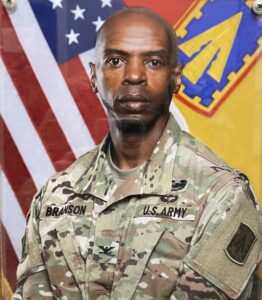

Citation:
The President of the United States takes pleasure in presenting the Silver Star Medal to Charles E. Branson, Captain, U.S. Army, for conspicuous gallantry and intrepidity in action in connection with military operations against a hostile force in Iraq in support of Operation IRAQI FREEDOM. Captain Branson distinguished himself while serving as the Commander of Alpha Battery, 1st Battalion, 3d Air Defense Artillery, in direct support of the First Brigade Combat Team of the 3d Infantry Division (Mechanized) during the Battle for Objective JENKINS from 24 to 29 March 2003. The First Brigade commander issued Captain Branson a tactical mission order to secure a bridge in the vicinity of the village of Al Kifal to enable the brigade to continue its attack in Karbala. For this mission, in addition to his two Bradley Linebacker platoons, Captain Branson received a tank platoon from 3-69 Armor as a reserve, a Combat Observation Lasing Team (COLT), and a Long-Range Acquisition System (LRAS) team. An air defense battery commander leading a Bradley and tank company team in an attack was unprecedented. Just after midnight on 25 March 2003, Captain Branson's company team reached the service road leading to the bridge and immediately began receiving heavy rocket-propelled grenades and small arms and mortar fire from a hostile force well established in prepared defensive positions on the near side of the bridge. Captain Branson pulled his forces back to a rally point and called in artillery fire to suppress the enemy fire. He rallied his forces and continued the attack, only to receive additional heavy fire. For the next eight hours, Captain Branson maintained the momentum of the attack, calling for artillery fires on three separate occasions and requesting he commitment of the reserve tank platoon, which arrived at 0800 on the morning of 25 March 2003. In a last ditch effort to halt Captain Branson's unrelenting assault, the Iraqis attempted to blow the bridge. A portion of the bridge collapsed, but that did not stop the attack as Captain Branson aggressively ordered his tanks to cross the weakened structure. This action turned the tide of the battle. Following additional fire and maneuver, Captain Branson's force secured the bridgehead, but fierce fighting continued for the next 36 hours. Later that day, the remainder of Task Force 3-69 Armor was committed to the fight. On 26 March 2003, Task Force 2-69 Armor relieved Task Force 3-69 Armor to continue the lodgment expansion on the far side of the bridgehead. Captain Branson and his company team were ultimately relieved on 29 March 2003. The enemy battle damage assessment for this operation included more than 200 enemy killed in action, 20 "technical" vehicles destroyed, and the capture of numerous weapons caches. Captain Branson's personal bravery, expert coordination of artillery fire and ground attack, and exemplary devotion to duty were in keeping with the highest traditions of the military service and reflected greet credit upon himself, the "Rock of the Marne" Division and the United States Army.
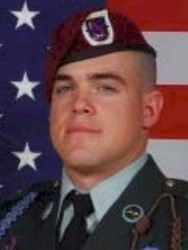

Synopsis:
The President of the United States of America, authorized by Act of Congress July 9, 1918 (amended by an act of July 25, 1963), takes pleasure in presenting the Silver Star to Sergeant First Class James J. Brasher, United States Army, for conspicuous gallantry and intrepidity in action against the enemy while serving as Platoon Sergeant for 2d Platoon, Company A, 1st Battalion, 508th Parachute Infantry Regiment, 4th Brigade Combat Team, 82d Airborne Division, in action in support of Operation ENDURING FREEDOM in Iraq, on 7 December 2007. On that date, Sergeant Brasher's company had been tasked to participate in Operation MAR KARARADAD, a multi-national mission to clear insurgents from the Taliban stronghold of Musa Qaleh. That operation had begun the night before when his company was landed by helicopter just outside the city and, under cover of darkness, had occupied a hill overlooking the city. At dawn, Company A started taking small arms and heavy machine gun fire from a small town at the base of the hill. Sergeant Brasher and his Platoon Leader decided to take the town, which was isolated from the rest of Musa Qaleh by a dry riverbed. As the soldiers began systematically clearing buildings, a Taliban fighter attacked the lead squad of Sergeant Brasher's platoon, but Sergeant Brasher killed him before he could kill or injure or kill any of the Paratroopers. The squad began taking small arms fire as it advanced to the next compound, and again Sergeant Brasher reacted, throwing fragmentation grenades toward the enemy position, which suppressed the attack and prevented the enemy from getting a fix on the soldiers' position. As the Taliban consolidated into a highly defensible compound with thick walls, Sergeant Brasher spotted the enemy positions inside and began engaging them. One of the insurgent's bullets tore through his right forearm and bicep, which slowed him down but failed to stop him. Sergeant Brasher's fearless actions and dedication to mission accomplishment enabled 2d Platoon to destroy over 20 well-trained Taliban fighters. His quick decisions and aggressive stance against the enemy saved the lives of his men and were in keeping with the highest traditions of military service and reflect great credit upon himself, his unit, and the United States Army.
Home Town: Albuquerque, New Mexico


Synopsis:
The President of the United States takes pleasure in presenting the Silver Star Medal to Kenneth Braxton, Staff Sergeant, U.S. Army, for conspicuous gallantry and intrepidity in action while serving with the 3d Infantry Division during combat operations in support of Operation IRAQI FREEDOM, in Iraq.
Home Town: Philadelphia, Pennsylvania
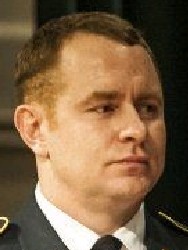

Citations:
The President of the United States of America, authorized by Act of Congress July 9, 1918 (amended by an act of July 25, 1963), takes pleasure in presenting the Silver Star to Master Sergeant Johnie B. Brewington, United States Army, for gallantry in action while serving as the Team Sergeant, Special Forces Operational Detachment Alpha 3141, Special Operations Task Force-East, Bagram Airfield, Afghanistan in support of Operation ENDURING FREEDOM on 6 April 2013. Master Sergeant Brewington distinguished himself when he realized that his element was receiving a large volume of effective fire from multiple sides and bounded through heavy enemy fire to push his element forward to cover. With complete disregard for his own safety, he repeatedly charged through a hail of enemy fire to ensure his operators were in the right positions, facilitate extraction of the pinned down element, and to recover the body of a fallen American. His superior tactical knowledge, leadership, and bravery under fire saved countless lives and facilitated the extraction of a killed American's body from the engagement area. His actions are in keeping with the finest traditions of military heroism and reflect distinct credit upon himself, the Combined Joint Special Operations Task Force-Afghanistan, the Special Operations Joint Task Force-Afghanistan, the United States Forces-Afghanistan, and the United States Army. NARRATIVE TO ACCOMPANY AWARD: Master Sergeant Johnie B. Brewington, United States Army, heroically distinguished himself by exceptionally valorous conduct in the face of the enemy of the United States as the Operations Sergeant, Special Forces Operational Detachment Alpha 3131 (ODA-3131), Special Operations Task Force-East, Bagram Airfield, Afghanistan, Combined Joint Special Operations Task Force-Afghanistan in support of Operation ENDURING FREEDOM. On 6 April 2013, Sergeant Brewington, ten other Special Forces Operators, a Forward Observer, a Combat Controller and two interpreters were sent into the Sono Valley to extract nine American advisors and their partner force, who were pinned down in a compound by over 100 Taliban and foreign fighters near Bar Ghunday Village, Shigal Wa Sheltan District, Kunar Province. By 0830 in the morning, the Taliban had surrounded the compound and were within 200 meters of the perimeter wall, engaging from elevated, fortified fighting positions with small arms, machine gun and rocket-propelled grenade fire. The ODA, serving as a secondary quick reaction force, moved to the mouth of the Sono Valley and were tasked to secure a casualty evacuation corridor and facilitate the extraction. Once at the mouth of the valley, the ODA realized their vehicles were not able to traffic the Sono Valley Road. The ODA initiated a four kilometer foot movement under heavy enemy fire to seize a tactically advantageous position to control fires and secure the casualty evacuation corridor. Once the ODA was within 400 meters of the pinned down element, the ODA was receiving extremely accurate enemy fire from the south and east. Sergeant Brewington, while maneuvering the ODA forward and ensuring that his Operators were in the most critical positions, bounded from element to element to ensure that the ODA maintained the tactical advantage. During every movement he was targeted and engaged with machine gun, rocket-propelled grenade and sniper fire from numerous enemy fighting positions. He continuously passed insurgent locations back to the Detachment Commander and corrected air-to-ground engagements, allowing the quick reaction force to continue advancing and exposing himself to a high volume of enemy fire. Realizing the need to secure a critical linear danger area in the evacuation corridor, Sergeant Brewington led an element that bounded east 50 meters through heavy machine gun fire from the north, south and east to establish a critical over watch position. Once the pinned down element began to bound through the linear danger area, the insurgent volume of fire increased and was concentrated on his position. Sergeant Brewington and a teammate bounded forward, again under heavy fire, to facilitate the extraction of the casualties who were approaching the linear danger area when he was struck in the back plate by a PKM round. With complete disregard for his own safety and as rounds were striking the stream bed all around him, Sergeant Brewington and his teammate moved across the linear danger area and recovered the killed American, who had fallen into the stream. His superior tactical knowledge, leadership and bravery while under a heavy volume of effective enemy fire certainly saved countless American and Afghan lives and facilitated the extraction of a killed American and a severely wounded Afghan Soldier from the Sono Valley. His actions are in keeping with the finest traditions of military heroism and reflect distinct credit upon himself, the Combined Joint Special Operations Task Force-Afghanistan, the Special Operations Joint Task Force-Afghanistan, the United States Forces-Afghanistan, and the United States Army.
BROADHEAD, ANTHONY R.
Synopsis:
The President of the United States of America, authorized by Act of Congress July 9, 1918 (amended by an act of July 25, 1963), takes pleasure in presenting the Silver Star to Master Sergeant Anthony Ray Broadhead, United States Army, for conspicuous gallantry and intrepidity in connection with military operations against an armed hostile force while serving with Troop C, 3d Squadron, 7th Cavalry Regiment, 3d Infantry Division, in support of Operation IRAQI FREEDOM at Al Samawa, Iraq in March 2003. Master Sergeant Broadhead's gallant actions and dedicated devotion to duty, without regard for his own life, were in keeping with the highest traditions of military service and reflect great credit upon himself, the 3d Infantry Division, and the United States Army.
Home Town: Hinesville, Georgia


Citation:
The President of the United States of America, authorized by Act of Congress July 9, 1918 (amended by an act of July 25, 1963), takes pleasure in presenting the Silver Star to Sergeant Scott D. Brooks, United States Army, for gallantry in connection with military operations against an opposing armed force while serving with the 82d Engineer Support Company, 65th Engineer Battalion, 130th Engineer Brigade, in action on 25 June 2007 in support of Operation Iraqi Freedom in Iraq. NARRATIVE TO ACCOMPANY AWARD: Specialist Scott D. Brooks, United States Army, heroically distinguished himself by exceptionally valorous conduct in the face of the enemy of the United States while assigned as a Heavy Equipment Operator to 618th Engineer Company, while attached to 1st Battalion, 505th Parachute Infantry Regiment, Forward Operating Base Summerall, Iraq on the morning of 25 June 2007 during OPERATION IRAQI FREEDOM V. On 25 June 2007, Specialist Brooks was attached to C Company when a Suicide Vehicle Borne Improvised Explosive Device (SVBIED) detonated at the wall of JSS Arvanitis-Sigua in Bayji, Iraq. His personal courage and gallantry prevented the enemy from penetrating a vulnerable perimeter. His actions on that day saved both coalition and Iraqi Security Force lives, and were directly responsible for protecting US and Iraqi Forces against one of the largest coordinated attacks executed by the Islamic State of Iraq and AL Qaeda. Woken up by the blast. Specialist Brooks immediately donned his IBA and helmet and headed to the roof because he heard enemy and friendly fire. He began engaging enemy targets that were making their way through the cloud of dust created by the explosion. The enemy, approximately 50 strong, was approaching from three different directions. Specialist Brooks reinforced the perimeter and began shooting at the enemy, taking down multiple enemies with his M4 fire despite the enemy's firepower coming in on their positions. At this point, Specialist Brooks, a heavy-equipment operator and engineer, noticed a gap in the perimeter and blast hole approximately the size of an infield of a baseball diamond. Seeing that there were wounded and dead IP's and wounded Americans, and seeing a fairly strong enemy approaching, Specialist Brooks made the decision to leave the roof and reinforce the perimeter. Running to the ground and finding an unarmored, civilian bulldozer, Specialist Brooks began moving toward the enemy fire, toward what was the perimeter. He moved thirteen destroyed Iraqi Police Chevrolet Silverado Pickup Trucks to close the gap in the wall that the SVBIED had created. His quick thinking and heroism allowed the Iraqi Police to push their wounded to American medical treatment and recover their dead without receiving direct fire. Even with the enemy engaging the rooftop positions and his vehicle from a higher vantage point, Specialist Brooks completely disregarded his personal safety and continued closing the gap in the wall. Eventually , the Battalion's B Company quick reaction force platoon arrived to reinforce the northern perimeter. However, Specialist Brooks already had the perimeter closed. The firefight continued while Specialist Brooks began assisting the Iraqi Policeman in removing debris and recovering the bodies of their fallen comrades. He helped remove the debris from 17 bodies and assisted in directly saving the lives of five Iraqi Policeman, who were trapped in a gap created between a falling wall and support beam. He then stayed awake for the next forty-eight hours removing debris and rebuilding the perimeter. Specialist Brooks is truly an American hero whose willingness to do whatever it takes to accomplish the mission and protect his fellow paratroopers is indicative of his selflessness. He put himself in harms way of the enemy to rebuild the perimeter during a firefight. He directly saved the lives of five Iraqis and protected the entire JSS that day. His actions reflect great credit upon him, Task Force One Panther, the 19th Engineer Brigade, the 25th Infantry Division and the United States Army
Home Town: Middleville, Michigan
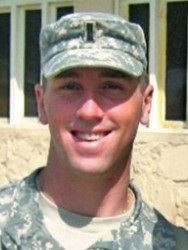

Citation:
The President of the United States of America, authorized by Act of Congress July 9, 1918 (amended by an act of July 25, 1963), takes pride in presenting the Silver Star (Posthumously) to First Lieutenant Jonathan P. Brostrom, United States Army, for conspicuous gallantry and intrepidity in action against the enemy on 13 July 2008, while serving as a Platoon Leader in Company C, 2d Battalion (Airborne), 503d Parachute Infantry Regiment, 173d Airborne Brigade, in support of Operation Enduring Freedom, in Afghanistan. First Lieutenant Brostrom's incredible valor, competence, and unstoppable drive to aid his men in need took the highest level of bravery and courage. First Lieutenant Brostrom's efforts kept the enemy from overwhelming the outpost position in time for additional reinforcements, eventually repelling the enemy attack. His actions, at the cost of his own life, saved the lives of his men and held the ground from enemy forces. First Lieutenant Brostrom's actions are in keeping with the finest traditions of the military service and reflect great credit upon himself, the 173d Airborne Brigade Combat Team, and the United States Army.
Home Town: Aiea, Hawaii
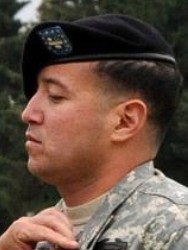

Synopsis:
The President of the United States of America, authorized by Act of Congress July 9, 1918 (amended by an act of July 25, 1963), takes pleasure in presenting the Silver Star to Staff Sergeant Jarret D. Brown, United States Army, for gallantry in connection with military operations against an opposing armed force in support of Operation ENDURING FREEDOM, in Afghanistan, while serving with the 1st Battalion, 17th Infantry Regiment, 2d Infantry Division on 24 August 2009. On that date, Staff Sergeant Brown was serving as Assistant M-240 machine gunner during a patrol in the Arghandab River Valley, a hotbed of Taliban resistance at that time. The patrol was ambushed and hit by a combination of fires from machine guns, small arms and rocket propelled grenades. Staff Sergeant Brown exposed himself to enemy fire to direct his machine gunner to cover a fire team caught in the open, while also firing his rifle. He then directed suppressive fire on the enemy's heaviest weapons. As the platoon consolidated, Staff Sergeant Brown's gunner collapsed in the 100-degree heat. He grabbed the machine gun and dragged the gunner to a concealed position, from which he delivered accurate support by fire. When it became clear the platoon's situation was untenable, the platoon sergeant ordered the squads to break contact. Staff Sergeant Brown alternately provided covering fire and moved, dragging his gunner with him. When he saw an enemy fire team creeping to within 30 meters of the platoon, he threw his gunner behind the last concealment available, abandoned his own cover and engaged them, killing one and wounding a second enemy fighter. He then set up the M-2450 and provided suppressive fire as the rest of the platoon covered about 100 meters to better cover and began a faster, bounding egress. He followed them, still carrying his gunner. The platoon came under heavy fire once more before making it back to the Joint District Coordination Center. Staff Sergeant Brown returned fire and identified multiple targets for other platoon members. His response created space for close-coordination aircraft to be called in to neutralize the enemy and allow the platoon to finally return to safety. Staff Sergeant Brown's first action once the platoon was safe was to find medical assistance for his gunner. Staff Sergeant Brown's gallant actions and dedicated devotion to duty, without regard for his own life, were in keeping with the highest traditions of military service and reflect great credit upon himself, the 2d Infantry Division, and the United States Army.
Home Town: Hoonah, Alaska
BROWN, JASON D.
Synopsis:
The President of the United States takes pleasure in presenting the Silver Star Medal to Jason D. Brown, Staff Sergeant, U.S. Army, for conspicuous gallantry and intrepidity in action while serving with Company C, 3d Battalion, 3d Special Forces Group (Airborne) in support of Operation IRAQI FREEDOM at Debecka Pass, Iraq, on 6 April 2003. Under fire from artillery, tank shells, mortars and antiaircraft artillery bursts fired in a low arc toward him, Sergeant Brown squatted and fired shoulder-launched Javelin antitank missiles to take out two armored personnel carriers and ignite a troop truck full of Iraqi infantrymen. An hour before, Sergeant Brown had fired his very first Javelin at an Iraqi troop truck in the distance. Staff Sergeant Brown's actions are in keeping with the finest traditions of military heroism and reflect distinct credit upon himself, this Command, and the United States Army.
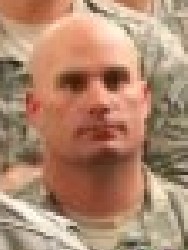

Citation:
The President of the United States of America, authorized by Act of Congress July 9, 1918 (amended by an act of July 25, 1963), takes pleasure in presenting the Silver Star to Sergeant First Class Matthew L. Brown, United States Army, for conspicuous gallantry and intrepidity in connection with military operations against the enemy on 10 November 2011, while serving as Senior Engineer Sergeant, Operational Detachment Alpha-3321, Special Operations Task Force East, Bagram Airfield in support of Operation ENDURING FREEDOM. Sergeant First Class Brown distinguished himself by courageously assaulting the Chamkani District Center with an unknown number of suicide bombers barricaded inside to rescue 15 hostages and regain control of the insurgent held structure. During the initial assault, Sergeant Brown caught an insurgent-thrown grenade and threw it into an unoccupied corner, saving the lives of numerous assaulters. Despite his wounds, Sergeant Brown continued to fight until the hostages were rescued. His actions are in keeping with the finest traditions of military heroism and reflect distinct credit upon himself, The Combined Joint Special Operations Task Force Afghanistan, the Combined Forces Special Operations Component Command-Afghanistan, the United States Forces-Afghanistan, and United States Army. NARRATIVE TO ACCOMPANY AWARD: Sergeant First Class Matthew L. Brown, United States Army, heroically distinguished himself by exceptionally valorous conduct in the face of the enemy of the United States as Senior Engineer Sergeant, Operation Detachment-Alpha 3321, Special Operations Task Force-East, Bagram Airfield, Afghanistan in support of Operation ENDURING FREEDOM. On 10 November 2011, insurgents (INS) assaulted the Chamkani District Center (DC) which is in close proximity of Village Stability Platform (VSP) Chamkani. The INS force seized control of the DC, killing three Afghan National Police personnel, and established fighting positions on the second floor of the DC, and in a second building within the DC compound. Utilizing these fighting positions, the INS opened fire on VSP Chamkani with Small Arms Fire (SAF), Light Machine Gun, and Rocket Propelled Grenade, wounding one Afghan Security Guard. Sergeant Brown reconnoitered a covered and concealed route through a section of the Chamkani Bazaar to the DC entry control point. Sergeant Brown radioed the Assistant Detachment Commander (ADC) and relayed the covered route, ensuring the remainder of the element could move safely to the DC. Sergeant Brown moved to the DC and breached the door as his element moved inside and established a foothold in the main lobby area. INS immediately began firing down the stairwell from the second floor. Sergeant Brown established security and prepared to lead members of the assault force to clear the adjoining rooms. As soon as a second door was kicked open, INS barricaded in the room opened fire. Sergeant Brown immediately returned fire, suppressing the INS inside. He threw a fragmentation grenade into the room, and upon detonation of the grenade, Sergeant Brown and the ADC moved back to the door. As the dust settled, the ADC and Sergeant Brown proceeded to clear the room. As soon as they stepped into the room, an INS threw a grenade which passed over the ADC's left shoulder. Sergeant Brown yelled "Grenade!" and caught the grenade in his hands. Sergeant Brown, with complete disregard for his own safety, moved rapidly back out of the door and faced down the hallway. He threw the grenade towards the corner of the lobby while shouting "Frag Out!", allowing friendly forces to seek cover. Sergeant Brown then ran down the hall grabbing an Afghan Uniformed Police (AUP) member and shielded him with his body. As the grenade exploded, Sergeant Brown absorbed the shock and shrapnel from the grenade in his back, risking his own life to save the life of the AUP. Following the explosion, Sergeant Brown moved down the hall and exited the DC. Once outside, Sergeant Brown was fired upon again by INS with SAF and grenades from an adjacent building at close range. Sergeant Brown immediately returned fire and moved around the building to link up with two AUP members pulling security. Sergeant Brown, suffering mild shock due to his wounds, stopped at that position and radioed the Detachment Commander his position and injuries. Sergeant Brown directed the establishment of the inner cordon while a command post was established west of the main building. As reinforcements arrived, Sergeant Brown continued to ignore his wounds and integrated additional forces into the inner cordon, ensuring the perimeter was sealed off. As night fell, communication was established with one group of hostages. As the group of hostages made their way out of the DC with the cordon force, Sergeant Brown ensured each hostage was properly searched and placed in a temporary holding area for their safety. Sergeant Brown courageously and selflessly entered a compound with barricaded INS equipped with suicide vests, grenades, and a Vehicle Borne Improvised Explosive Device. During the initial assault, Sergeant Brown caught a grenade thrown by an INS and risking his own life to save the lives of his team mates and partnered forces, moved out of the room and threw it in a comer. His actions saved the lives of numerous assault force members. Sergeant Brown's courageous leadership from the onset of INS operations, even while injured, led to the successful rescue of all hostages and elimination of all INS at the DC. His actions are in keeping with the finest traditions of military heroism and reflect distinct credit upon himself, the Combined Joint Special Operations Task Force Afghanistan, the Combined Forces Special Operations Component Command-Afghanistan, the United States Forces - Afghanistan, and the United States Army.
Home Town: Magnolia, Texas


Citation:
The President of the United States takes pleasure in presenting the Silver Star Medal to Specialist Brown, Specialist [the Private First Class], U.S. Army, for extraordinary heroism while serving with as a Combat Medic with the 4th Squadron, 73rd Cavalry Regiment, 4th Brigade Combat Team, during combat actions in support of Operation ENDURING FREEDOM, on 25 April 2007, in Afghanistan. While on patrol, the trail vehicle struck an IED which ignited the fuel, engulfing the vehicle in an intense fireball. The patrol began to take small arms and mortar fire. As the element retired fire, Specialist Brown immediately dismounted her vehicle, and without regard for her personal safety, moved to the burning vehicle amid intense enemy fire. After arriving at the vehicle, Specialist Brown began to treat two casualties. As she treated the wounded soldiers, intense enemy fire continued to impact her immediate vicinity. On several occasions, Specialist Brown used her body to shield the casualties from enemy fire, as well as the explosions of ammunition. Specialist Brown moved to the more protected position with her patients, and continued treatment as enemy small arms fire continued to impact around her. Once again, Specialist Brown shielded the wounded with her body. Specialist Brown's heroism and selfless devotion to duty reflect great credit upon herself, Task Force Fury, the Combined Joint Task Force-82, and the United States Army.
Home Town: Lake Jackson, Texas
BROWN, JIMMY M., JR.
Synopsis:
The President of the United States of America, authorized by Act of Congress July 9, 1918 (amended by an act of July 25, 1963), takes pleasure in presenting the Silver Star to Staff Sergeant Jimmy M. Brown, Jr., United States Army, for conspicuous gallantry and intrepidity in connection with military operations against an armed hostile force while serving with Company D, 2d Battalion, 8th Cavalry Regiment, 1st Cavalry Division, in support of Operation IRAQI FREEDOM on 8 October 2006 near An Diwaniyah, Iraq. Staff Sergeant Brown, while conducting urban operations displayed great leadership, skill, courage and aggressiveness. His actions epitomize what it means to be a combat Soldier and NCO. Staff Sergeant Brown's gallant actions and dedicated devotion to duty, without regard for his own life, were in keeping with the highest traditions of military service and reflect great credit upon himself, the 1st Cavalry Division, and the United States Army.


Citation:
The President of the United States takes pleasure in presenting the Silver Star Medal to Christian Bryant, Staff Sergeant, U.S. Army, for conspicuous gallantry and intrepidity in action while serving with Company C, 1st Battalion, 32d Infantry Regiment, 10th Mountain Division, during combat operations in support of Operation ENDURING FREEDOM, on 22 April 2007, near Shudergay Village, Afghanistan. Staff Sergeant Bryant's personal bravery and selfless actions are in keeping with the highest traditions of the military service and reflect great credit upon himself, the 10th Mountain Division, and the United States Army.
NARRATIVE TO ACCOMPANY AWARD:
Staff Sergeant Christian Bryant distinguished himself by conspicuous gallantry and intrepidity in action while serving with Combat Company, 1st Battalion, 32d Infantry Regiment, 10th Mountain Division, in support of Operation ENDURING FREEDOM, on 22 April 2007, near Shudergay Village, Afghanistan. On the morning of 22 April 2007, 2nd Platoon, Combat Company was conducting a cordon and search of Shudergay Village when the platoon became engaged by 30-40 enemy personnel from 15-20 enemy positions using AK-47s, sniper rifles, PKMs, RPKs, and RPGs, lasting approximately 17 hours. Upon the initial contact Staff Sergeant Bryant personally maneuvered his machine guns under fire into a support by fire position allowing the ANA to clear the village. When the platoon became pinned down inside the village Staff Sergeant Bryant led a gun team and fire team up a ridgeline, low-crawling most of the way under intense enemy fire in order to establish an OP that could identify and fix the enemy positions. He then low-crawled back to the Platoon CP with complete disregard for his own safety, and under enemy sniper and small arms fire in order to give his report to the Platoon Leader. Upon arrival at the CP, Staff Sergeant Bryant discovered the Platoon Sergeant had suffered an injury to his leg as he was evacuating a wounded ANA Soldier. Staff Sergeant Bryant immediately took over as the Platoon Sergeant and continued to assist the Platoon Leader controlling the fight. Staff Sergeant Bryant then noticed that one of his M-240Bs was running low on ammunition. He immediately moved ammunition to that gun, low crawling the entire way due to the accurate sniper fire and intense small arms and RPG. Throughout the engagement Staff sergeant Bryant continually moved between positions to account for his soldiers regardless of the heavy fire. He displayed great courage as he continued to move supplies to those soldiers who were running low on ammo and water while under heavy and accurate enemy fire. Throughout the contact, Staff Sergeant Bryant assisted the Platoon Leader in controlling the numerous CAS platforms to include Apache Gunships, A-10's, a B-l Bomber and an AC-130. His guidance and experience in directing these assets onto enemy targets was vital to the success of the platoon. He personally guided the Apaches onto three enemy positions on the eastern ridgeline that were suppressing his men, and effectively destroyed them. While under intense sniper fire (rounds were accurately being fired inside the room he was occupying), Staff Sergeant Bryant continued to directed the AH-64's onto multiple enemy positions maintaining a calm, cool, and collected attitude which effectively instilled confidence among all those around him. When a member of 3d Platoon was wounded by enemy fire Staff Sergeant Bryant helped coordinate his CASEVAC and he assisted moving the Soldier to the LZ. As the machine gunners began to run low on ammunition, Staff Sergeant Bryant calmly encouraged his machine gunners to engage enemy personnel only after they had positively identified them. Throughout the contact one enemy sniper had continued to plague the platoon. After roughly 10 hours of fighting, one of the machine gunners identified his position as the sun was going down and muzzle flashes became more distinguishable. Staff Sergeant Bryant immediately assisted the Javelin gunner in retrieving, loading and then engaging and destroying the enemy sniper, all the while under intense enemy fire. Throughout the fight Staff Sergeant Bryant not only commanded his squad but he also performed duties well above his level of responsibility. Staff Sergeant Bryant's actions exemplify what it means to be a true leader and a combat Soldier. His valorous actions under intense enemy fire showcased his personal courage and dedication to duty and to his men. Staff Sergeant Bryant's actions were directly responsible for killing a key ACM Sub commander Habib Jan, whom Coalition Forces had been targeting for three years and who had been responsible for multiple Coalition Force casualties. His actions also led to the destruction of Habib Jan's ACM cell killing over 20 ACM fighters.
BUCK, JASON T.
Synopsis:
The President of the United States of America, authorized by Act of Congress July 9, 1918 (amended by an act of July 25, 1963), takes pleasure in presenting the Silver Star to Sergeant First Class Jason T. Buck, United States Army, for conspicuous gallantry and intrepidity in action against the enemy while serving with the 10th Special Forces, in action against the enemy in support of Operation ENDURING FREEDOM in Afghanistan. His gallant actions and dedicated devotion to duty, without regard for his own life, were in keeping with the highest traditions of military service and reflect great credit upon himself, his unit, and the United States Army.


Citation:
The President of the United States takes pleasure in presenting the Silver Star Medal to Nathan J. Buelow, Chief Warrant Officer Two (CW2), U.S. Army, for conspicuous gallantry and intrepidity in action against enemy forces of the United States as Assistant Detachment Commander assigned to Operational Detachment Alpha 065 (ODA-065), Company C, 2d Battalion, 10th Special Forces Group (Airborne), at Baghdad, Iraq, on 9 July 2006, during combat operations in support of Operation IRAQI FREEDOM. Chief Warrant Officer Two Buelow's outstanding leadership, personal bravery and selfless actions are in keeping with the highest traditions of the military service and reflect great credit upon himself, the 10th Special Forces Group (Airborne), and the United States Army.
NARRATIVE TO ACCOMPANY AWARD:
Chief Warrant Officer Two Nathan J. Buelow heroically distinguished himself through conspicuous gallantry and intrepidity in action against enemy forces of the United States as Assistant Detachment Commander assigned to Operational Detachment Alpha 065 (ODA-065), Company C, 2d Battalion, 10th Special Forces Group (Airborne), at Baghdad, Iraq, on 9 July 2006. During Operation CAELUM in the heart of the As-Shulla neighborhood of Baghdad, Iraq, Chief Warrant Officer Two Buelow displayed unparalleled poise and confidence under intense direct small arms and rocket propelled grenade (RPG) fire from a maneuvering enemy. As the assault force leader on this raid, he led three Special Forces officers, nine Special Forces NCOs, and 44 senior Iraqi Special Operations Forces (ISOF) officers and NCOs (Commandos) into three buildings which were tenaciously defended by numerous insurgents. Upon entering the objective area, the entire convoy came under severe enemy fire from all directions. Without hesitation, Chief Warrant Officer Two Buelow took critical initiative and directed his assault force to establish a foothold in a heavily fortified building which they then secured in a matter of minutes. At one point during the movement to the next enemy stronghold, three combatants armed with AK-47s assaulted the western side of the friendly occupied objective. With weapons raised, the insurgents advanced toward Chief Warrant Officer Two Buelow's Communications NCO and acquired the SF Soldier in their sights. With complete disregard of his own life and safety, Chief Warrant Officer Two Buelow assaulted toward the advancing enemy and engaged them, killing the first man and wounding a second insurgent. The battle reached its climax as numerous enemy foot soldiers unleashed nearly overwhelming firepower against the perimeter security elements. Fearlessly exposing himself to enemy fire, Chief Warrant Officer Two Buelow personally directed the mounted .50 caliber machine gunners to volley their fire in order to maintain fire superiority and kill or neutralize dozens of insurgents thus insuring that the friendly perimeter remained intact. After coordinating his movement and fires with the Ground Force Commander, Chief Warrant Officer Two Buelow then organized additional commandos and led a charge into the final structure in pursuit of numerous wounded enemy. In a brief but violent assault, Chief Warrant Officer Two Buelow and his men secured the house, captured the remaining insurgents, and exploited the objective for intelligence. While withdrawing from the objective area, the convoy was caught in a well-coordinated ambush in which the enemy fired numerous RPGs, and AK-47s. In what amounted to a 360 degree ambush, the insurgents unleashed an arsenal of munitions with unmatched ferocity, establishing interlocking fields of fire. Maintaining absolute composure, Chief Warrant Officer Two Buelow maneuvered the entire convoy out of harm's way and then oversaw the evacuation of an ISOF Soldier who has just lost his leg and fingers from a direct RPG hit. Chief Warrant Officer Two Buelow's competence, professionalism, and courage under intense, direct small arms fire were critical to the successful prosecution of the target and preservation of the coalition force. His heroic acts saved the life of a brother-in-arms and brought the men of his detachment home safely. His heroic actions are in keeping with the finest traditions of gallantry and intrepidity, and reflect great credit upon himself, the Special Operations Command Central, and the United States Army.
Home Town: Dubuque, Iowa
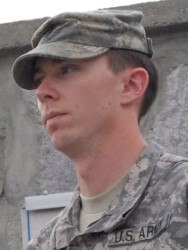

Citation:
The President of the United States of America, authorized by Act of Congress July 9, 1918, takes pleasure in presenting the Distinguished Service Cross to First Lieutenant Andrew L. Bundermann, United States Army, for extraordinary heroism while engaged in an action against an enemy of the United States while serving as the Acting Commander of Troop B, 3rd Squadron, 61st Cavalry Regiment, 4th Brigade Combat Team, 4th Infantry Division, on 3 October 2009 in Afghanistan. On this date, Combat Outpost Keating and Observation Post Fritsche came under a complex and sizeable enemy attack which breached the outpost's perimeter. Understanding the extreme necessity for external communication to coordinate air support and casualty evacuation, First Lieutenant Bundermann worked with two of his soldiers to set up the only remaining communications platform. Once communication was reestablished, he immediately coordinated with the tactical operations center for direct fire support. As the squadron's supporting artillery was at its maximum range and could not adequately engage targets near Observation Post Fritsche, First Lieutenant Bundermann directed the mortar teams on COP Keating to begin engaging targets at the nearby observation post, allowing the squadron's supporting artillery to effectively engage enemy targets at the combat outpost. As the battle waged on, it became clear to him that the enemy was engaging the combat outpost from a nearby village and had captured the Afghan National Police station. First Lieutenant Bundermann effectively directed his troops indirect fire assets and air support fire on the village neutralizing a key strategic enemy position. Realizing his soldiers were distributed in extended outer positions and the enemy had control of several positions in the combat outpost, he reallocated his forces and made the tactical decision to focus the attack on enemy forces within the perimeter. Having redirected his forces, he led a bold counterattack which cleared the enemy from several critical positions and ultimately led to a successful defense of COP Keating. First Lieutenant Bundermann's actions are in keeping with the highest traditions of military service and reflect great credit upon himself, the 61st Cavalry Regiment, and the United States Army.
Home Town: Bovry, Minnesota
BURNS, KYLE
Synopsis:
The President of the United States takes pleasure in presenting the Silver Star Medal to Kyle Burns, First Lieutenant (Infantry), U.S. Army, for conspicuous gallantry and intrepidity in action while serving with the 2d Battalion, 87th Infantry Regiment, 3d Brigade Combat Team, during combat operations in support of Operation ENDURING FREEDOM on June 20, 2006. Lieutenant Burns distinguished himself while serving as a Platoon Leader in Team Destroyer TF Catamount in Helmand Province, as part of Operation MOUNTAIN THRUST. While conducting a route reconnaissance, Lieutenant Burns' and another vehicle came under enemy ambush with small arms, machine gun and rocket-propelled grenade fire. Burns directed the vehicles to move forward, but his vehicle was disabled by enemy fire and he sustained a back injury from the impact. He was forced to abandon the vehicles and then directed his nine-man element to occupy a rooftop of a nearby compound. He quickly organized a defensive posture on the rooftop, where his element repelled 75 to 100 fighters who made repeated attempts at overrunning their position. Despite being injured, he calmly directed his element and leveraged air assets against the enemy force until reinforcements were able to breach the enemy positions to gain link-up. Over five hours, Lieutenant Burns' element destroyed an estimated 35 enemy fighters. His leadership enabled his men to inflict significant casualties against the enemy and sustained only one friendly casualty.
Born: at Syracuse, New York
Home Town: Syracuse, New York
Personal Awards: Silver Star (War on Terrorism), Purple Heart
BURNS, THOMAS J.
Synopsis:
The President of the United States of America, authorized by Act of Congress July 9, 1918 (amended by an act of July 25, 1963), takes pleasure in presenting the Silver Star to First Sergeant Thomas J. Burns, United States Army, for conspicuous gallantry and intrepidity in connection with military operations against an armed hostile force while serving in support of Operation IRAQI FREEDOM in Iraq. First Sergeant Burns' gallant actions and dedicated devotion to duty, without regard for his own life, were in keeping with the highest traditions of military service and reflect great credit upon himself, his unit, and the United States Army.
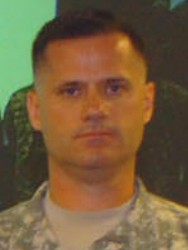

Synopsis:
The President of the United States of America, authorized by Act of Congress July 9, 1918 (amended by an act of July 25, 1963), takes pleasure in presenting the Silver Star to Captain Larry Quentin Burris, Jr., United States Army, for conspicuous gallantry and intrepidity in connection with military operations against an armed hostile force while serving as Commanding Officer, 3d Battalion, 15th Infantry Regiment, 2d Brigade Combat Team, 3d Infantry Division, in support of Operation IRAQI FREEDOM during the Battle for Baghdad, Iraq, on 7 April 2003. Captain Burris' heroic leadership and dedicated devotion to duty, without regard for his own life, were in keeping with the highest traditions of military service and reflect great credit upon himself, the 3d Infantry Division, and the United States Army.
Home Town: Richmond, Virginia
BUSBY, LEE V.
Synopsis:
The President of the United States of America, authorized by Act of Congress July 9, 1918 (amended by an act of July 25, 1963), takes pleasure in presenting the Silver Star to Staff Sergeant Lee V. Busby, United States Army, for conspicuous gallantry and intrepidity in connection with military operations against an armed hostile force while serving in support of Operation ENDURING FREEDOM in Afghanistan. His gallant actions and dedicated devotion to duty, without regard for his own life, were in keeping with the highest traditions of military service and reflect great credit upon himself, his unit, and the United States Army.
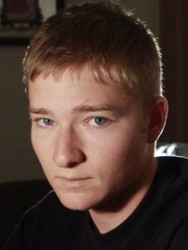

Synopsis:
The President of the United States of America, authorized by Act of Congress July 9, 1918 (amended by an act of July 25, 1963), takes pleasure in presenting the Silver Star to Corporal Joshua J. Busch, United States Army, for gallantry in connection with military operations against an opposing armed force while serving with the 1st Battalion, 327th Infantry Regiment, 1st Brigade Combat Team, 101st Airborne Division, in support of Operation ENDURING FREEDOM in Afghanistan, on 12 November 2010. Corporal Busch distinguished himself by valorous actions against armed and heavily-fortified enemy during Operation Strong Eagle. His gallant actions and dedicated devotion to duty, without regard for his own life, were in keeping with the highest traditions of military service and reflect great credit upon himself, his unit, and the United States Army.
Home Town: Seymour, Wisconsin
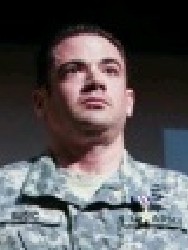

Citation:
The President of the United States of America, authorized by Act of Congress July 9, 1918 (amended by an act of July 25, 1963), takes pleasure in presenting the Silver Star to Sergeant First Class Andrew P. Busic, United States Army, for gallantry in action while serving as the Intelligence Sergeant for Operational Detachment Alpha 1434 (ODA-1434), Special Forces Advanced Operating Base 1430, Special Operations Task Force-Southeast, Forward Operating Base Ghazni in Support of Operation ENDURING FREEDOM on 28 August 2013. Sergeant Busic distinguished himself by courageously responding to an insurgent suicide attack on FOB Ghazni. His complete disregard for his own safety while in close combat with insurgent forces resulted in the obliteration of the enemy, denying their penetration of the FOB and saving countless Soldiers' and civilians' lives. His actions are in keeping with the finest traditions of military heroism and reflect distinct credit upon himself, The Combined Joint Special Operations Task Force-Afghanistan, the Special Operations Joint Task Force-Afghanistan, The United States Forces-Afghanistan and the United States Army. NARRATIVE TO ACCOMPANY AWARD: Sergeant First Class Andrew P. Busic heroically distinguished himself by exceptionally valorous conduct in the face of the enemy of the United States as an Intelligence Sergeant, Special Forces Operational Detachment Alpha 1434 (ODA-1434), Advanced Operating Base 1430, Special Operations Task Force-Southeast, Forward Operating Base Ghazni, Afghanistan in support of Operation ENDURING FREEDOM. On 28 August 2013, insurgents (INS) conducted a spectacular, complex attack on Forward Operating Base (FOB) Ghazni initiated by a vehicle borne improved explosive device on the east perimeter wall, near the airfield. Immediately following the blast, ten INS in Afghan National Army uniforms armed with small arms, grenades, grenade launchers and suicide vests poured through the breach intent on inflicting mass casualties. Sergeant Busic, completely ignoring his own well being, rushed to the sound of small arms fire in a non-tactical vehicle with two other Soldiers. His vehicle initially received enemy small arms fire from two directions, but upon identifying another friendly element heading the opposite direction, Sergeant Busic directed his vehicle to follow them towards what they quickly identified as the breach point of the FOB. While approaching the breach point the vehicle met with a hail of INS small arms fire. Once special operator dismounted while the vehicle maneuvered through intense INS small arms and rifle grenade fire. Sergeant Busic then dismounted the vehicle and, under enemy fire and with complete disregard for his personal safety, rushed directly towards the enemy while providing covering fire and forcing the INS to fall back from his fellow operators. He then linked up with a special operator returning from the enemy engagement area and they both aggressively counterattacked the INS while exchanging small arms fire. Sergeant Busic and the special operator sought cover and became embroiled in an intense, close quarter gun fight with three INS located only five meters from their position. Unable to gain fire superiority, both wounded from proximal grenade and suicide vest blasts, receiving concentrated enemy fire and fighting from inadequate cover, they decided to expose themselves to enemy fire in order to return to their original location. Sergeant Busic then linked up with additional special operators and organized them into two maneuver elements. Coalition mounted forces then arrived on site and Sergeant Busic assisted in directing them to move forward to suppress the breach point. His quick thinking and decisive action under pressure ensured no additional INS were able to enter the FOB. Using the vehicle movement as a distraction, he then led one maneuver element into the enemy engagement area towards an unknown number of remaining INS. Synchronizing his movements with the other element, Sergeant Busic, although wounded with multiple shrapnel injuries, led a methodical clearance of the area. As they continued advancing forward, an INS detonated his suicide vest near them. After continuing to clear the area and passing two apparently dead INS, one of them surprised the element by rolling a hand grenade to within 15 feet of their position. Unable to take cover, they absorbed the grenade. The INS then detonated his suicide vest throwing his body in the air and causing minor injuries to the special operators. Sergeant Busic then killed an INS with small arms fire that was maneuvering to the rear of their position. His element was then reinforced by additional special operators, and he next led them to clear additional areas ensuring the INS threat was completely eliminated. His quick thinking, outstanding situational awareness in an extremely dangerous situation and fearless leadership were directly responsible for ensuring the safety of over 1,400 personnel on FOB Ghazni. His action are in keeping with the finest traditions of military heroism and reflect distinct credit upon himself, The Combined Joint Special Operations Task Force-Afghanistan, the Special Operations Joint Task Force-Afghanistan, The United States Forces-Afghanistan and the United States Army.


Synopsis:
The President of the United States takes pride in presenting the Silver Star Medal (Posthumously) to Jacob Lee Butler, Sergeant, U.S. Army, for conspicuous gallantry and intrepidity in action while serving with Headquarters Company, 1st Battalion, 41st Infantry Regiment, 1st Armored Division, during combat operations in support of Operation IRAQI FREEDOM, on 1 April 2003, in Iraq.
Home Town: Wellsville, Kansas
Personal Awards: Silver Star (War on Terrorism), Bronze Star, Purple Heart
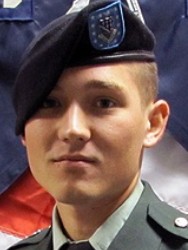

Citation:
The President of the United States of America, authorized by Act of Congress July 9, 1918 (amended by an act of July 25, 1963), takes pride in presenting the Silver Star (Posthumously) to Private First Class Jordan Matthew Byrd, United States Army, for gallantry in action against the enemy as a Combat Medic with the 1st Battalion, 506th Infantry Regiment, 4th Brigade Combat Team, 101st Airborne Division on 13 October 2010. While on patrol, his element came under intense small arms, rocket propelled grenade and mortar fire. With complete disregard for his own personal safety, he maneuvered through the enemy kill zone across 30 meters of open terrain to render lifesaving aid to a fellow comrade. Private First Class Byrd's distinctive accomplishments are in keeping with the finest traditions of military service and reflect great credit upon himself, Task Force Red Currahee, Combined Task Force Currahee, Combined Joint Task Force - 101 and the United States Army. NARRATIVE TO ACCOMPANY AWARD: Private First Class Jordan Matthew Byrd distinguished himself through heroism and gallantry in action against an enemy of the United States as a Combat Medic for 4th Platoon, Able Company, 1st Battalion, 506th Infantry Regiment, 4th Brigade Combat Team, 101st Airborne Division (Air Assault). Without regard to his own personal safety, Private First Class Byrd maneuvered across 30 meters of open ground under fire to provide medical aid and shield a wounded comrade. On 13 October 2010, Private First Class Byrd and his platoon were conducting an air assault in Kalanar, Yahya Khei District, Patika Province, Afghanistan, as part of Operation TALASHI KHMAR, a company cordon and search when their lead element came under intense enemy small arms fire. Private First Class Byrd and his platoon were tasked with establishing the outer cordon, requiring them to establish security in one of the most hostile areas in the Battalion's area of operations. During the initial barrage, Specialist Sustaita was struck in the leg with small arms fire. One of the platoon's sections immediately returned fire to suppress the enemy and gain fire superiority. Private First Class Byrd, with total disregard for his own safety, ran through the enemy kill zone, crossing approximately 30 meters of open terrain with rounds impacting around him to provide medical treatment on Specialist Sustaita. Despite accurate enemy sniper, AK-47, PKM, RPG, and mortar fire, Private First Class Byrd continued the treatment of the injured Soldier, putting himself between the enemy fire and the casualty, in order to provide life-saving treatment to the Soldier. As 4th Platoon's section exchanged fire, the enemy began to employ 82-mm. mortars which impacted within 75 meters of their position. The accuracy and volume of enemy fire coupled with the lack of cover and concealment pinned down the section and prevented it from reaching Private First Class Byrd and Specialist Sustaita. Private First Class Byrd shielded the casualty despite the accuracy and volume of enemy fire, and placed a tourniquet on Specialist Sustaita's wounded leg which proved to be life saving. After several minutes of being exposed, Private First Class Byrd was expertly working to stop the arterial bleeding in Specialist Sustaita's leg when he was fatally wounded. Private First Class Byrd's immediate medical attention to Specialist Sustaita likely saved his life. Despite accurate enemy fire, he displayed selfless service and distinguished gallantry crossing 30 meters of open terrain despite heavy contact in order to apply life saving medical care on a fellow Soldier while using his own body as a shield. Private First Class Byrd inspired his fellow Soldiers through his heroic and selfless act and is fully deserving of the Silver Star for his gallantry under fire. Private First Class Byrd's actions are in keeping with the finest military traditions and reflect distinct credit upon himself, this Command, and the United States Army.
Born: At Cody, Wyoming
Home Town: Grantsville, Utah


